Just a few Democrats defect from Nancy Pelosi during House speaker election
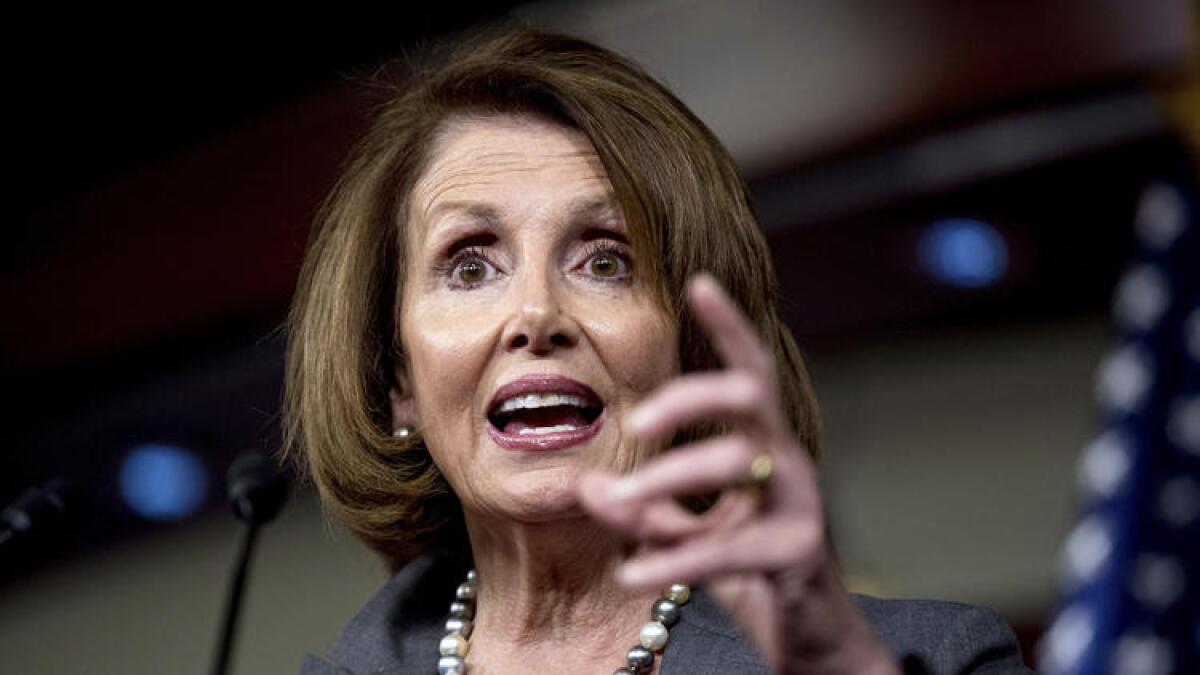
House Minority Leader Nancy Pelosi (D-San Francisco) was most Democrats’ pick for House speaker on Tuesday, but, as expected, she lost the gavel to Republican Paul Ryan of Wisconsin.
Some were watching to see if Democrats would back away from the minority leader, especially during a public vote, after the first serious challenge to her authority last month. But only a few did.
Rep. Jim Cooper (D-Tenn.) voted for Rep. Tim Ryan (D-Ohio), Rep. Kyrsten Sinema (D-Ariz.) voted for Rep. John Lewis (D-Ga.) and Rep. Ron Kind (D-Wis.) voted for Cooper.
Cooper and Sinema previously voted for another member over Pelosi.
In November, Ohio Rep. Ryan challenged Pelosi for her position. Some members said it was time for new leadership after Democrats’ major losses in the November election.
She beat back the challenge, arguing that Democrats need an experienced leader to counter President-elect Donald Trump. But on a 134-63 vote, she still won by her smallest margin in years.
Today’s roll call vote took nearly an hour. While voting, several Democrats mentioned recent news such as the proposed penalties for the Democrats (including a few Californians) who filmed a sit-in on the House floor in violation of House rules, and Republicans’ brief attempt to gut a committee that monitors congressional ethics.
Assembly sets confirmation hearing after Gov. Brown formally nominates Becerra as state attorney general
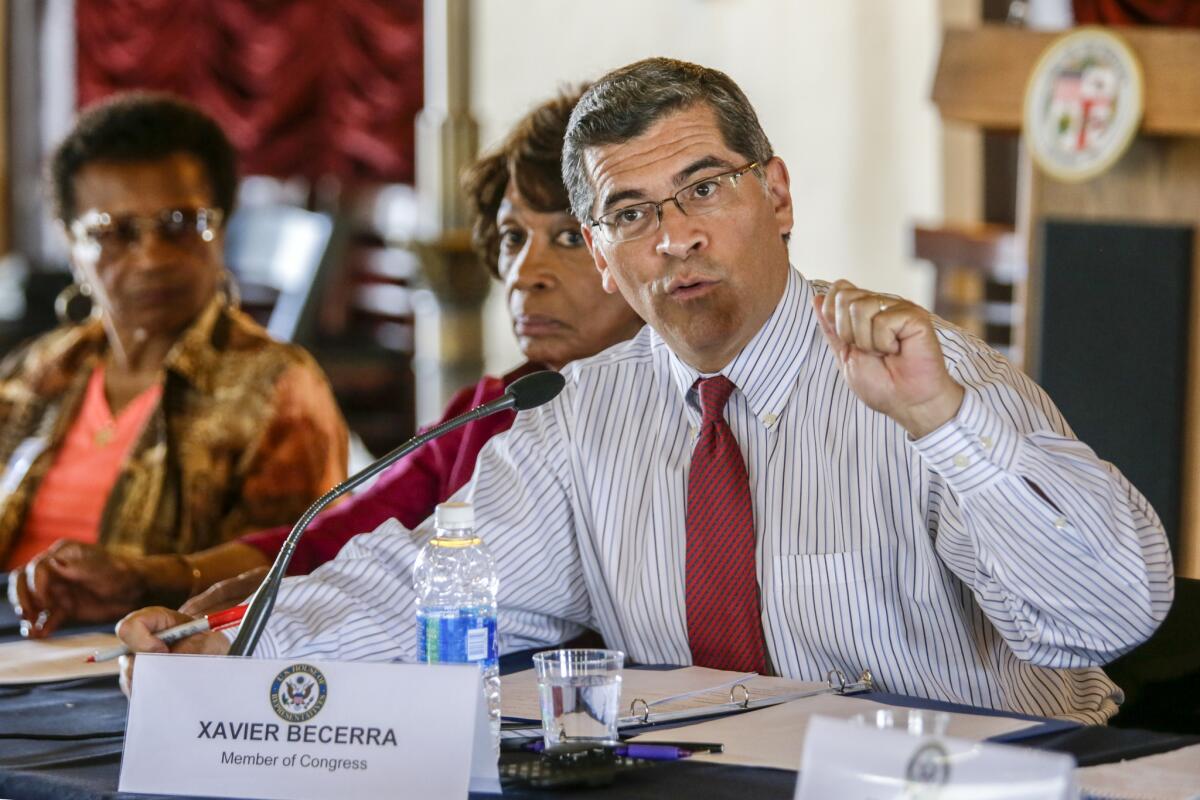
Less than an hour after state Atty. Gen. Kamala D. Harris resigned and took the oath of office for the U.S. Senate, Gov. Jerry Brown on Tuesday officially nominated Rep. Xavier Becerra to fill the vacancy and become California’s top law enforcement officer.
The state Assembly set a Jan.10 date for his first confirmation hearing.
The Assembly and Senate now have 90 days to act on confirmation of Becerra, a Democrat from Los Angeles, as state attorney general.
A letter from the co-chairs of the Assembly Special Committee on the Office of Attorney General, which will consider the confirmation, asks Becerra to submit written comments on five “critical issues confronting California today and over the next two years” remaining in the attorney general’s term.
Becerra was asked to respond to give his positions on immigration, including cooperation with federal immigration authorities and his view of sanctuary cities, civil rights, environmental protection, police accountability and consumer protection. The Congressman was also asked to describe his position on President-elect Donald Trump’s proposal for a registry for Muslim immigrants.
“In the next four years, Californians and our laws will encounter substantial challenges from the next President and his administration,” said the letter from Democratic Assemblymen Reggie Jones-Sawyer of Los Angeles and Mark Stone of Scotts Valley.
“Donald Trump has made multiple statements that directly contradict California law and policy,” the two lawmakers wrote. “Our next Attorney General will have great responsibility for protecting Californians and our values, and defending our laws.”
Becerra has served in Congress since 1992 and was most recently the first Latino member of the Committee on Ways and Means, as well as chairman of the House Democratic Caucus.
Becerra, 58, previously served in the state Assembly from 1990 to 1992.
“Xavier has been an outstanding public servant — in the state Legislature, the U.S. Congress and as a deputy attorney general,” Brown said when he announced last month that Becerra would be his nominee. “I’m confident he will be a champion for all Californians and help our state aggressively combat climate change.”
Harris became the first black woman to represent California in the U.S. Senate with a ceremony shortly after 9 a.m. Pacific time. She submitted her letter of resignation to the governor at the same time.
“I am proud of the work and accomplishments achieved by the Office of the Attorney General over the past six years,” Harris wrote. “As United States Senator, I look forward to continuing to work with you and other state and local leaders on important issues facing California and our nation.”
Harris later named Kathleen “Kate” Alice Kenealy chief deputy attorney general to lead the state Department of Justice as acting attorney general until Becerra is confirmed.
Updated at 11:24 am: This post has been updated to include setting of confirmation hearing.
Updated at 10:28 am: This post has been updated to include naming of acting attorney general.
Kamala Harris sworn in as first Indian American senator and California’s first black senator

Kamala Harris sworn in

Kamala Harris sworn in
Before friends and family in a packed chamber, Kamala Harris was sworn in as California’s newest U.S. senator Tuesday morning. She became the first black woman the Golden State has sent to the Senate and the first Indian American to ever serve in the body.
- Harris, 52, a Democrat from Los Angeles, was sworn in by Vice President Joe Biden shortly after 9 a.m. PT as Sen. Dianne Feinstein (D-Calif.) and her new Senate colleagues looked on. Harris’ husband, Los Angeles attorney Doug Emhoff, her stepchildren, brother-in-law Tony West, sister Maya Harris, extended family as well as several state officials from across the country who traveled to celebrate with the now former state attorney general watched from the gallery.
Meet the six Californians who are officially joining the largest congressional delegation today

Today the 115th Congress will be sworn in, including California’s first new U.S. senator in more than two decades and five new House members.
In the Senate, members are sworn in one at a time and Sen. Dianne Feinstein (D-Calif.) is expected to walk her new colleague Sen.-elect Kamala Harris across the chamber to be sworn in.
Many eyes will be focused on Harris in the coming months. Considered a rising star in the party, she has already been floated as a possible presidential candidate for 2020.
Friends and family will fill the galleries as all 435 House members are sworn in at the same time. House and Senate leaders also hold a ceremonial swearing-in later in the day, when individual members can get a photo with Vice President Joe Biden.
California’s five new House members are Rep.-elects Ro Khanna (D-Fremont), Jimmy Panetta (D-Carmel), Lou Correa (D-Santa Ana), Salud Carbajal (D-Santa Barbara) and Nanette Barragán (D-San Pedro).
We’ll be tracking the new members throughout the day, but you can check out their backgrounds and biographies below.
Assemblywoman rings in 2017 with a surprise marriage to a former lawmaker
For a legislator who frequently offers glimpses of her personal life on Twitter, the new year brought something entirely different to share: a wedding.
Assemblywoman Lorena Gonzalez (D-San Diego) was married on Sunday to a former Republican member of the Assembly, Nathan Fletcher. The ceremony, attended only by the couple’s close family, was officiated by former Assembly Speaker John A. Pérez.
Gonzalez and Fletcher, who each have children from previous marriages, have been together since 2015.
Fletcher changed his GOP registration to nonpartisan during an unsuccessful race for mayor of San Diego in 2012. He later became a Democrat and served as a delegate for Hillary Clinton at the 2016 Democratic National Convention.
It was Fletcher who made the news official in a late-afternoon tweet, after Gonzalez had been dropping hints to her followers.
Gonzalez said that the couple would celebrate with about 200 people who had been invited to what they thought was a surprise party on Sunday night for Fletcher’s 40th birthday.
“The surprise is on them!” she wrote in a message to The Times.
California legislators are mourning the death of Sutter Brown, Gov. Jerry Brown’s famous dog
Sutter Brown, Gov. Jerry Brown’s famous corgi, died Friday with Brown and First Lady Anne Gust Brown by his side. His illness, and his death, sparked an outpouring of support in political circles and beyond.
Sutter Brown, Gov. Jerry Brown’s beloved corgi, dies: ‘It’s a sad day for all who loved Sutter’
Sutter Brown, who died on Friday, was last seen in public on election day, accompanying the governor to vote at his Sacramento polling place. In recent days, Sutter’s health took a turn for the worse, the governor’s office said.
Sutter died with the governor and his wife at his side, and was buried Friday afternoon on his family’s Colusa County ranch, according to a statement from the governor’s deputy press secretary, Deborah Hoffman.
“It’s a sad day for all who loved Sutter,” Hoffman said.
Kamala Harris picks a former Clinton staffer to be her communications director
How this climate scientist is preparing for Trump
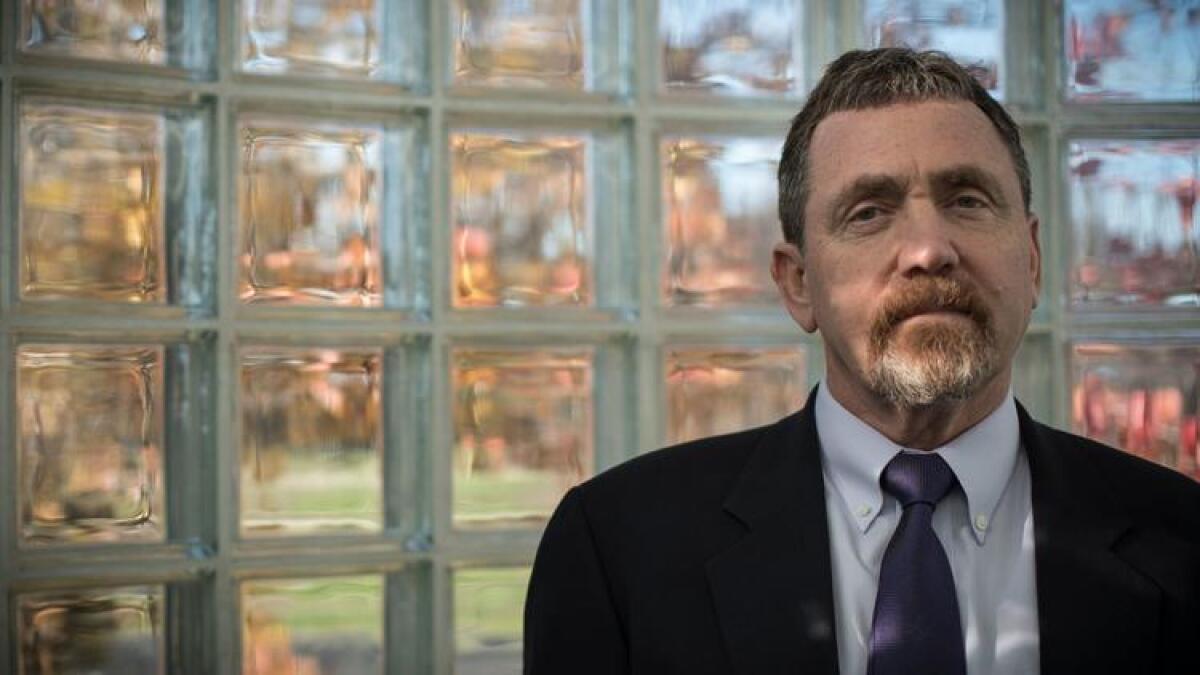
Donald Trump’s victory sent shock waves through the environmental community, but fears are particularly heightened among scientists who are employed by the federal government or rely on the data it generates. There are concerns that younger generations may avoid working for U.S. agencies or decide not to focus on climate change because they don’t see a future working in the field.
The election may already have had a chilling effect: Some working in national laboratories declined to speak about the impact the next administration could have on research they consider to be crucial to the fate of the planet.
Ben Santer has responded differently. Although he’s soft-spoken in person, the 61-year-old scientist has become more vocal over the years in hopes of beating back claims that climate change isn’t real.
Kamala Harris makes another hire for her Senate staff
California needs a specific ban on smoking pot while driving, these lawmakers say

Two state legislators say Californians might think it’s illegal to smoke marijuana while driving, but that there’s no specific ban on the practice in state law.
Assemblyman Evan Low (D-Campbell) and Sen. Jerry Hill (D-San Mateo) said Thursday that they’ll introduce legislation to close what they call a loophole.
The lawmakers said Proposition 64, the state’s new law legalizing marijuana, allows a citation for having an open container of marijuana in a vehicle. But, they said, it doesn’t expressly ban the use of the drug while driving.
“This legislation makes our laws for smoking [marijuana] while driving consistent with drinking while driving,” Hill said in a written statement.
The bill, which will be introduced next week, would make a driver’s marijuana use a traffic infraction. Its authors said the bill would allow a judge the option to consider the offense either an infraction or a misdemeanor.
On Sunday, new laws take effect in California. What can you expect?
Californians’ lives will be ruled by hundreds of new laws starting Sunday, including harsher sanctions against criminals, extra restrictions on companies such as Uber and Lyft, and a boost in the minimum wage to $10.50 from $10.
Residents of the Golden State will be able to get a glass of wine when getting a haircut and take selfies with their ballots. Gender-specific bathrooms will be a thing of the past if there’s only one toilet, and good Samaritans can break into cars to free dogs at risk of heatstroke.
Should California lawmakers work to end the electoral college?
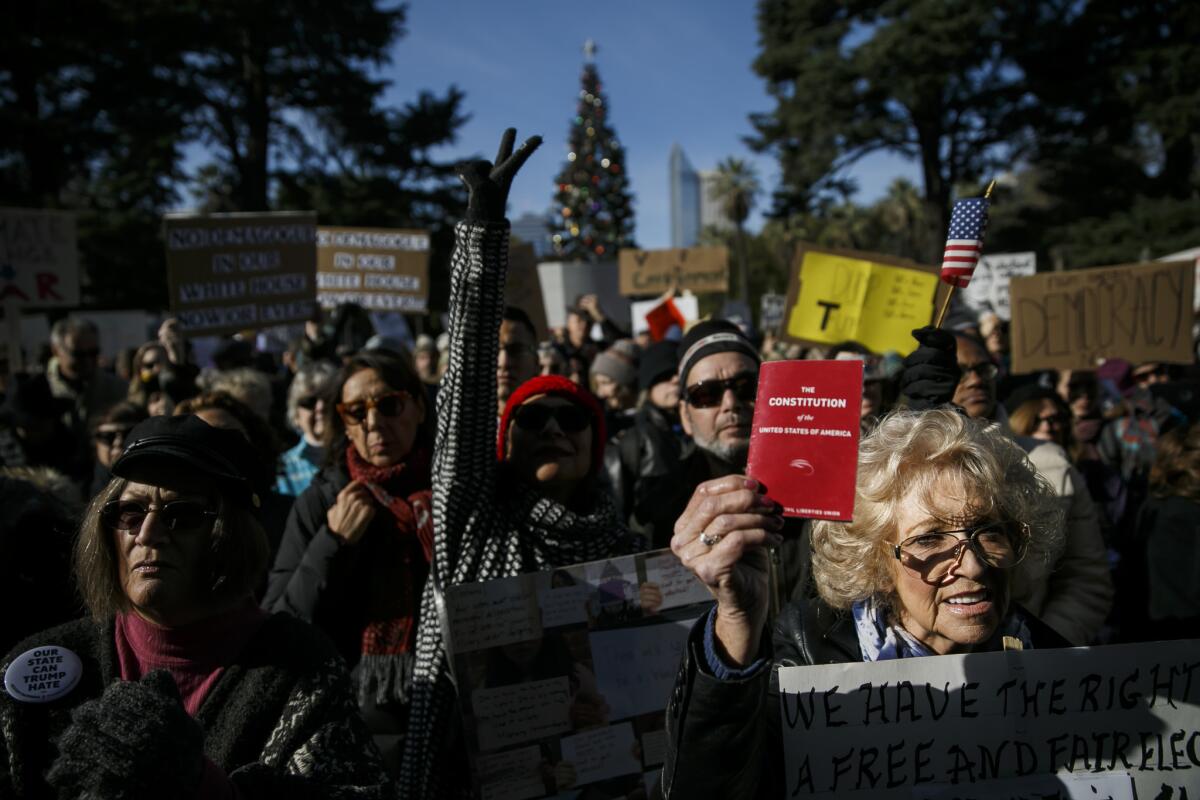
Protestors across the nation lost their last ditch attempt to sway the electoral college from voting for president-elect Donald Trump last week. But a California lawyer wants to reignite debate over the process that sealed Trump’s victory in 2018.
Rodrigo Howard, an attorney with CapKey Advisors, has proposed an initiative for the 2018 ballot that would ask voters whether state lawmakers should work to modify or eliminate the electoral college, so that the vote for president and vice president more closely resembles the outcome of the national popular vote.
Howard said the proposal is an open-ended measure that could encourage lawmakers to use their authority to adopt interstate compacts or ratify amendments to the U.S. Constitution, a difficult process that involves the approval of three-fourths of the states. The petition was received on Wednesday by the Attorney General’s office.
Changing the electoral college process is a long shot. But the system has been at the center of heated debate since the election of Trump, who won the presidency with 304 electoral college votes, though he lost the national popular vote — Hillary Clinton defeated him by almost 2.9 million ballots.
Howard said he refused “to believe change is impossible.”
“The electoral college is an archaic system with roots in 18th century compromises, and one of those compromises has its roots in slavery,” he said. “We are stuck with a system that does not have moral or political legitimacy.”
Contributions roll into Antonio Villaraigosa’s campaign for governor
Gov. Jerry Brown selects two top advisors for spots on the California Public Utilities Commission
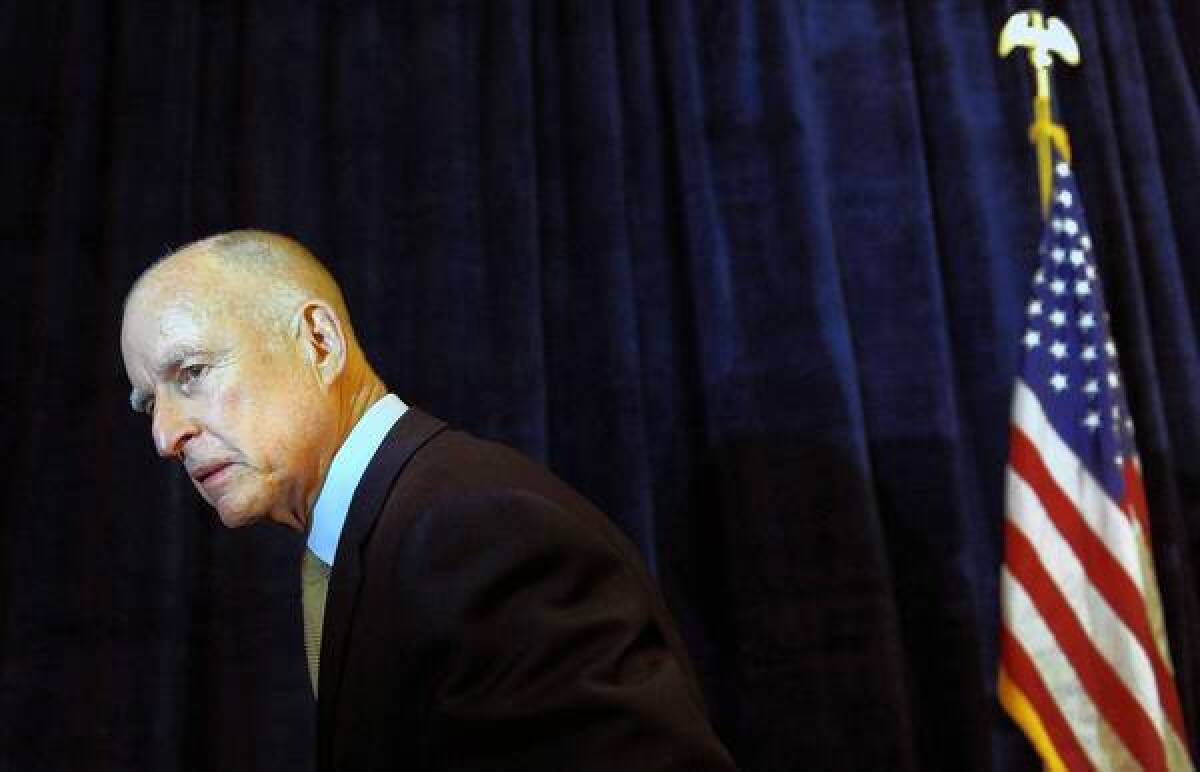
Gov. Jerry Brown has chosen two of his closest advisors on environmental and climate change issues to fill positions on the California Public Utilities Commission, the powerful state agency that regulates energy companies and the telecommunications industry.
On Wednesday, Brown nominated Cliff Rechtschaffen and Martha Guzman Aceves to serve six-year terms on the commission, effective next month. All five CPUC commissioners are appointed by the governor, subject to confirmation by the state Senate.
Rechtschaffen has served as the governor’s senior advisor on climate and energy issues for more than five years. Guzman Aceves, Brown’s deputy legislative affairs secretary, has focused on energy and environmental issues.
“Both have sound judgment and a commitment to protecting ratepayers and ensuring safe, reliable and climate-friendly energy in California,” Brown said in a written statement.
The appointments will mean a departure from the utilities agency for two sitting commissioners, Mike Florio and Catherine Sandoval, once their terms expire next month. Florio had faced several years of questions about his role in private conversations with the state’s biggest power utility, Pacific Gas & Electric Co.
California’s former lieutenant governor could become Trump’s Agriculture secretary
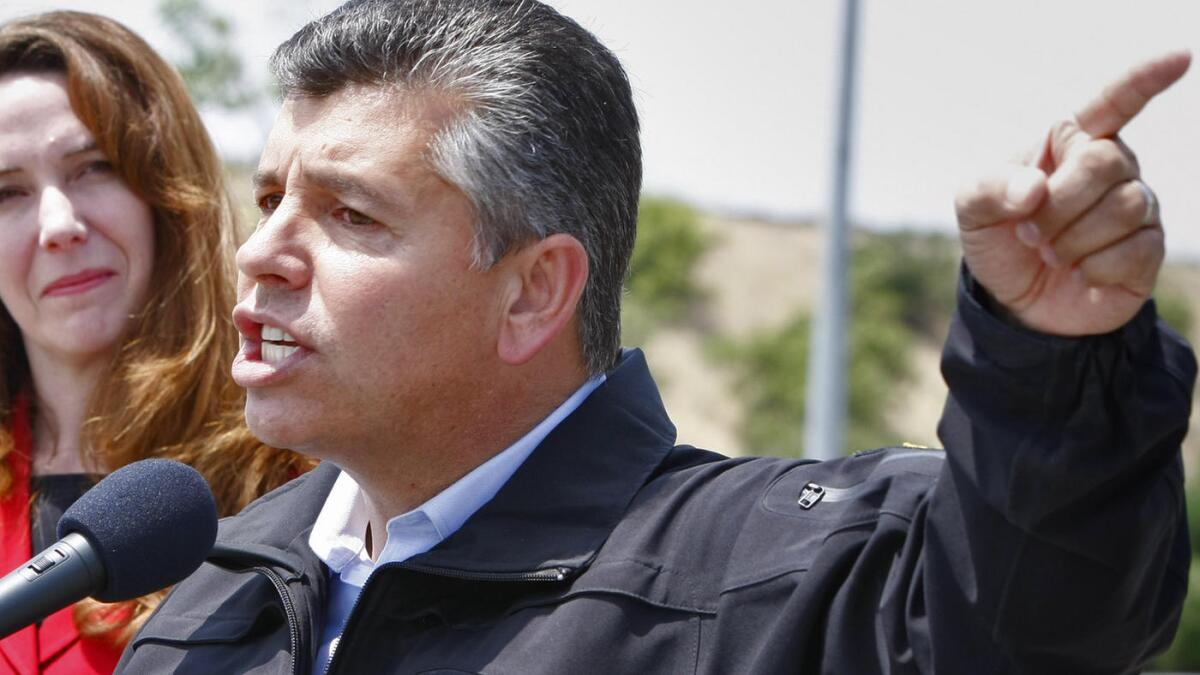
President-elect Donald Trump is considering former California Lt. Gov. Abel Maldonado to lead the Agriculture department, a move that would bring greater diversity to the Republican’s Cabinet.
Maldonado will meet with Trump on Wednesday at his Palm Beach, Fla., estate. Trump spokesman Sean Spicer noted that Maldonado, owner of Runway Vineyards in the Santa Maria Valley, comes from three generations of farmers and has “strong roots in the agriculture industry of California.”
Kamala Harris’ former campaign manager joins one of California’s top political consulting firms
Juan Rodriguez, the campaign manager for California Atty. Gen. Kamala Harris’ successful bid for the U.S. Senate, is joining the San Francisco-based political consulting team led by veteran Ace Smith, who has worked for Hillary Clinton and Gov. Jerry Brown.
Rodriguez will anchor the new Los Angeles office of the consulting firm, known as SCN Strategies. The firm served as Harris’ lead consultancy during the Senate campaign.
“Adding Juan as a partner with a new footprint in Southern California dramatically expands our offering,” Smith said in a statement.
The addition of Rodriguez comes as California’s 2018 race for governor inches closer on the horizon. SCN works for Democratic Lt. Gov. Gavin Newsom. He faces a growing field of candidates, including former Los Angeles Mayor Antonio Villaraigosa, a former SCN client.
Before joining the Harris campaign, Rodriguez worked as a senior advisor to the attorney general. He also worked as Los Angeles’ director for state relations when Villaraigosa was mayor. Rodriguez is 31 and lives in Los Angeles.
New and returning California legislators divvy up committee assignments
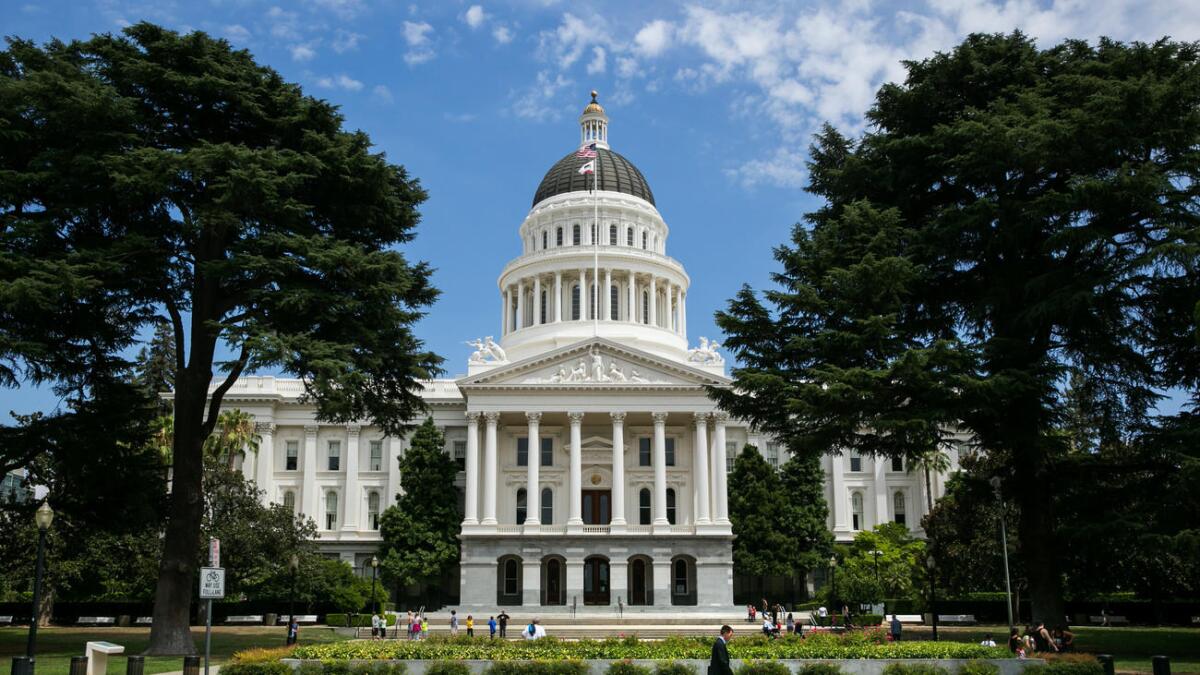
California legislative leaders have rounded out their choices for dozens of policy panels, with a few freshman legislators winning committee gavels and women leading a quarter of the committees in the Assembly.
Assembly Speaker Anthony Rendon (D-Paramount) announced the assignments Tuesday following the Senate selections made by Senate President Pro Tem Kevin de León (D-Los Angeles) last week.
Ten legislators who were newly elected to posts in Sacramento on Nov. 8 will serve as committee chairs in the two houses. Rendon’s office said Tuesday more women would lead standing or special Assembly committees in 2017 than in the previous pair of two-year legislative sessions.
Only a handful of the state Capitol’s most powerful committees, however, will change hands.
Notable new selections include state Sen. Holly Mitchell (D-Los Angeles) as chair of the Senate’s budget committee; Assemblyman Chris Holden (D-Pasadena) as chair of the Assembly’s energy and utilities committee; and state Sen. Ben Allen (D-Santa Monica) as chair of the Senate’s education committee.
Democratic delegate who leads an L.A. Islamic group criticized for tweet about Russian military plane crash
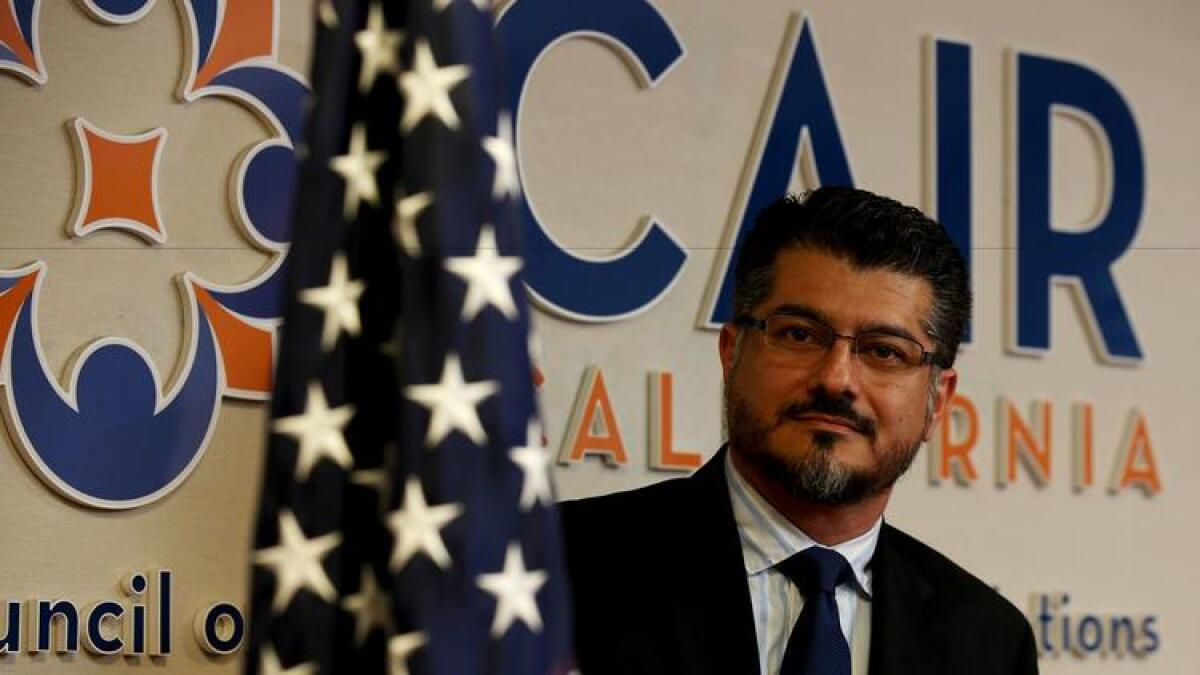
Hussam Ayloush, executive director of the Council on American-Islamic Relations’ Los Angeles chapter and a California delegate to this year’s Democratic National Convention, triggered a social media uproar on Christmas Day when he sent out a tweet that appeared to imply he wished more people died in a Syria-bound Russian military plane that crashed.
“I’m sad about the crashed Russian military jet. The TU-154 could have carried up to 180 military personnel instead of just 92!” Ayloush said in his tweet.
All 92 people aboard the plane are believed to have died when it crashed into the Black Sea on Sunday morning. Among the passengers killed were members of world-famous Russian military choir who were scheduled to perform at a Russian air force base in Syria.
Ayloush, deleted his tweet a short time later.
In a series of follow-up tweets and a Facebook post, he said he was unaware that noncombatants were among those aboard the plane. But he did not address the death of other Russian military personnel, saying that “Russia’s military is engaging in major war crimes and atrocities against innocent civilians in Syria.”
Ayloush’s initial comments triggered immediate criticism on Twitter and were picked up a day later by the ultraconservative news site Breitbart and other media outlets.
Conservatives on Twitter were quick to point out that Ayloush is a member of the California Democratic Party. Ayloush was an elected convention delegate and is a member of the state party’s executive board, which is made up of about 500 party members.
Ayoush was not available for comment on Tuesday, and a spokeswoman for CAIR-LA said his Facebook post on the matter was his response.
John Benoit, Riverside County supervisor and former legislator, loses battle with cancer
John Benoit, a veteran state legislator who went on to serve seven years as a Riverside County supervisor, died Monday after a battle with pancreatic cancer.
The Republican politician’s staff announced Benoit’s death in a statement on Tuesday, what would have been his 65th birthday.
A former California Highway Patrol officer, Benoit was elected to the state Assembly in 2002 and the Senate in 2008. He was appointed to fill a vacancy on the Riverside County Board of Supervisors in 2009 and won a second term in 2014.
In 2006, the GOP legislator wrote a law prompted by the death of a Riverside child that requires child daycare centers to publicly disclose health and safety violations and substantiated complaints.
Benoit was diagnosed with pancreatic cancer last month, and earlier this month announced that his treatment had delayed his return to work.
He is survived by his wife, two children and two grandchildren. Gov. Jerry Brown will appoint a successor to serve the remainder of Benoit’s term as county supervisor.
Sen.-elect Kamala Harris picks her legislative director
Gov. Jerry Brown pardons 112, commutes one sentence in pre-Christmas tradition
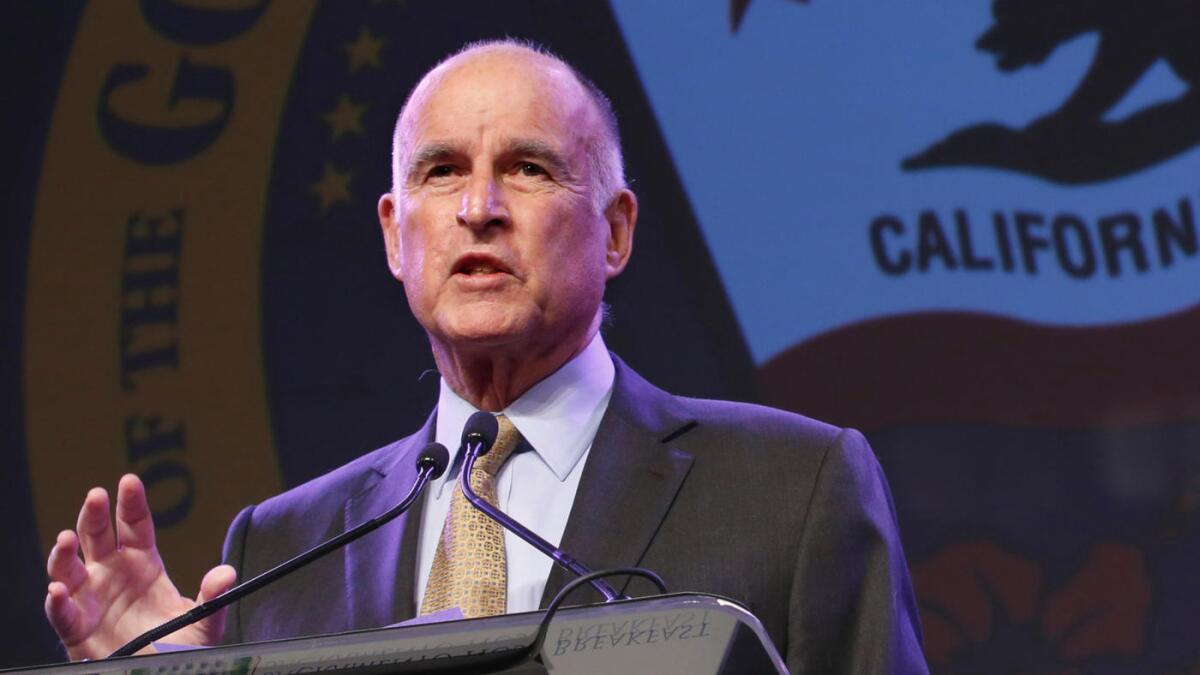
Continuing his tradition of giving pre-Christmas reprieves, Gov. Jerry Brown granted 112 pardons and commuted one sentence on Friday.
The pardons were granted mostly to individuals convicted of nonviolent, drug-related crimes who have since completed their sentences.
Since 2011, Brown has granted 854 pardons and two commutations, according to the governor’s office. That far exceeds recent predecessors such as former Gov. Arnold Schwarzenegger, who granted 15 pardons; Gov. Gray Davis, who granted zero pardons; and Gov. Pete Wilson, who granted 13.
Among those receiving pardons was Gwendolyn Irene Harvey, who was sentenced in February 1988 in Los Angeles for robbery and possession of a controlled substance for sale, and served more than three years. Brown noted in his pardon message that Harvey co-founded an organization that advocates for those in substance abuse programs.
Brown also shortened, but not did not eliminate, the sentence of Louis Calderon, who was convicted of attempted murder, with an enhanced sentence for use of a firearm, for being an accomplice in a 1999 gang-related shooting in which a victim lost an eye. Calderon was sentenced to a total prison term of 32 years to life.
Calderon has broken ties with his gang and has never been disciplined for a rule violation in 18 years, Brown noted. Calderon also earned multiple community college degrees and a paralegal certificate while in prison.
“This is a very serious crime, but it is clear that Mr. Calderon has distinguished himself by his exemplary conduct in prison and his forthright and continuing separation from gang activities of any kind,” Brown wrote. He reduced Calderon’s sentence to a total of 22 years to life.
Necessary evidence or privacy intrusion? This bill is trying to expand DNA evidence collection in California
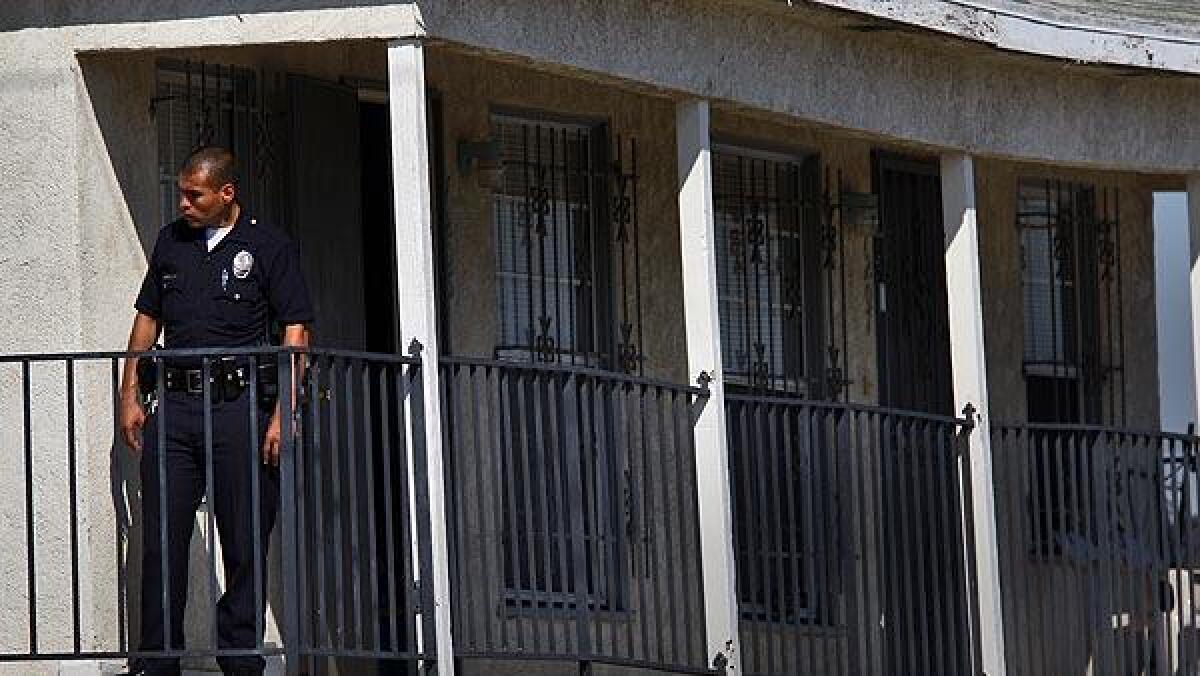
California lawmakers say they are trying to address an unintended consequence of making theft and drug crimes misdemeanors: a drop in the collection of DNA evidence they say is hurting cold-case investigations.
A bill reintroduced by Assemblyman Jim Cooper (D-Elk Grove) would order investigators to gather swab samples, blood specimens and fingerprints from people convicted of certain misdemeanors. Current law requires law enforcement to gather such evidence only from felons.
Supporters of Assembly Bill 16 point out that many of the crimes listed were considered felonies before Proposition 47 downgraded drug possession and some theft charges. But civil rights advocates say the proposal could have serious privacy implications.
Barbara Boxer letter to The Times: ‘Our democracy depends’ on holding new leaders accountable
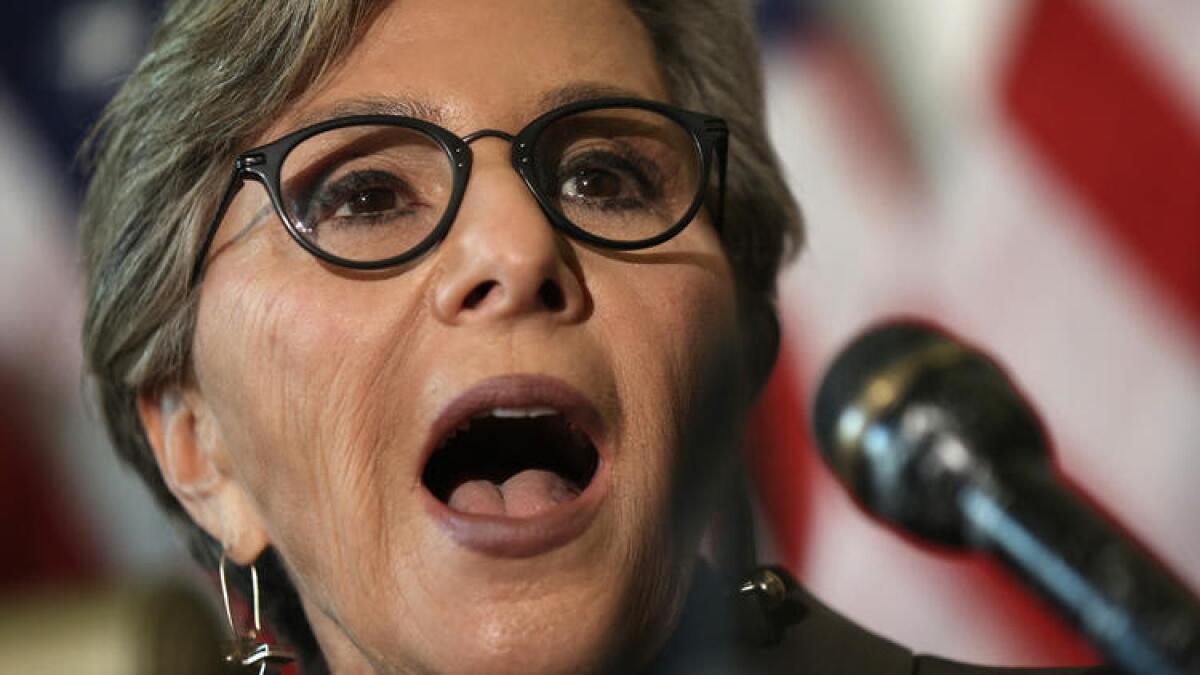
Sen. Barbara Boxer, in a farewell letter to the editor, warned of threats faced by the media under incoming President Donald Trump, and urged the media to hold him accountable.
She ended her decades in Washington earlier this month sparring with others from California over a water measure and defending politics as a “noble” profession.
Here’s an excerpt from her letter to The Times.
Going forward, I intend to remain very involved in the issues we face, and like all your readers, I will rely on the work you do every single day. As we march into uncharted territory with a new president-elect who has never held elected office — and who at times has threatened the media — the role of the free press is more important than ever.
Extending California family leave law to smaller businesses is on the legislative agenda

Sen. Hannah-Beth Jackson is once more seeking to extend family leave laws to some of the smallest businesses in California — and this time she hopes to give families more protected time off.
Jackson (D-Santa Barbara) has reintroduced the New Parents Leave Act, which Gov. Jerry Brown vetoed last legislative session, citing concern over the proposal’s effect on small businesses and the liability issues it could raise.
Senate Bill 63, which is substantially similar to its predecessor, would allow parents at companies with 20 to 49 employees to take time off to care for a newborn or newly adopted child without fear of losing their jobs. But the new version of the act would grant parents a period of 12 weeks protected job leave instead of six.
Jackson also reintroduced a second bill identical to another vetoed by Brown that would expand the definition of a family member in the law. The proposal would grant employees 12 weeks of family leave to care for a grandparent, grandchild, sibling, parent-in-law or adult child.
Current state laws extend such job protections only to those workers at businesses with 50 or more employees.
The bills were a priority of the California Legislative Women’s Caucus last legislative session. In a statement, Jackson said she looked forward to continuing to work with the governor on “an issue of national importance.”
California’s five most expensive House races
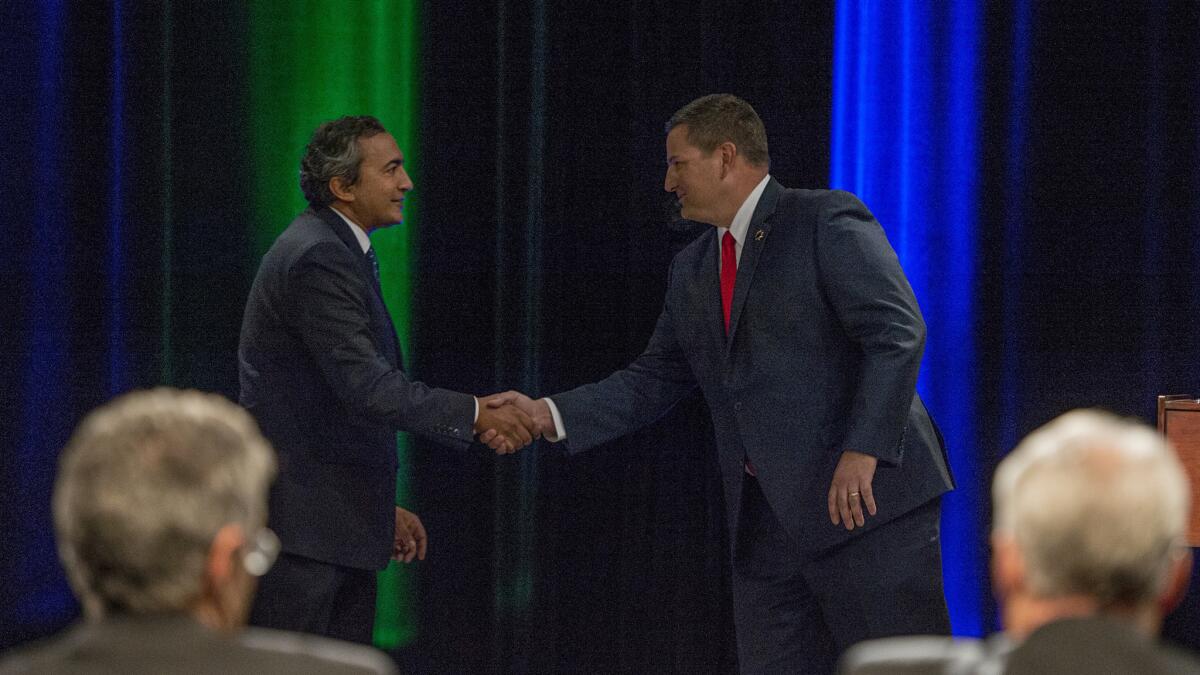
Winning a seat representing a California congressional district is not a cheap endeavor.
In the last two years, more than $150 million was spent trying to help or hurt the candidates running for one of California’s 53 seats in the House of Representatives.
Most of that money — about $117 million — was spent by the candidates’ own committees, while an additional $35 million poured in from outside groups looking to influence the outcome of a few key races.
California’s most expensive House races included some perennially contested seats as well as sleepy districts that were suddenly thrust into competition based on hopes that having Donald Trump at the top of the GOP ticket would imperil incumbent House Republicans down the ballot.
Former White House aide, also a former L.A. Times employee, joins candidates vying to succeed Xavier Becerra
Former White House staffer Alejandra Campoverdi has entered the race to replace Rep. Xavier Becerra (D-Los Angeles).
Campoverdi, a former employee of the Los Angeles Times, said in an interview that her California upbringing and experience in Washington make her well-suited to represent the 34th Congressional District.
“I have a personal connection to the struggles of the people in this district, and I know how Washington works,” said Campoverdi, 37, who grew up in Santa Monica. “I was raised by a single mother who emigrated from Mexico and by my grandmother. Every day I saw the sacrifices they made for our family and for the community.”
Campoverdi worked in the White House from 2009 to 2012, first as an assistant to a deputy chief of staff and later as deputy director of Hispanic media.
While at The Times in 2015, she worked with the publisher’s office on a video project about immigration and the American identity. She left in July to pursue opportunities with other media outlets.
Campoverdi strikes a similar tone to many of her fellow candidates, vowing to “stand up against Donald Trump and his politics of hate.”
Other candidates vying for the seat include:
- Assemblyman Jimmy Gomez (D-Los Angeles)
- Wendy Carrillo, a Democratic labor activist
- Kenneth Mejia, a Green Party candidate who ran earlier this year as a write-in Democratic candidate against Becerra
- Sara Hernandez, former staffer for Councilman Jose Huizar and a Democrat
- Arturo Carmona, a Democrat and former top deputy for the Bernie Sanders campaign
- Yolie Flores, a former LAUSD board member and a Democrat
- Karl Siganporia, a Republican who previously explored a congressional run as a Democrat
- Raymond Meza, a Democrat and labor organizer with SEIU Local 721
- Steven Mac, a Democrat and felony prosecutor for Los Angeles County
UPDATE
9:40 a.m.: This post was updated to include Steven Mac’s entry into the race.
Prosecutor is ninth candidate in L.A. congressional race to replace Becerra
The number of candidates fighting to replace Rep. Xavier Becerra is now at nine, with L.A. County prosecutor Steven Mac the latest to jump in.
Mac, 35, filed papers with the Federal Election Commission on Wednesday. He previously lived in Glendale, but moved to Eagle Rock this week due to rising rent, he said.
In an interview, Mac said that he was running to “hold the [Trump] administration accountable for the truth” and that his past experience as an active-duty Army intelligence officer and Judge Advocate General’s Corps officer has helped him prepare for that.
Mac, whose parents emigrated from Vietnam but are ethnic Chinese, was raised in South Los Angeles and later in Montebello. He says he understands the immigrant experience that permeates the lives of many residents in the 34th Congressional District: His mother worked in the garment district in downtown Los Angeles, while his father worked in Chinatown restaurants for years.
“No matter what country you come from, you come here and you start from nothing and work your way up,” he said. “I think I share that with everybody in the district.”
Union organizer announces run for Xavier Becerra’s congressional seat
Raymond Meza, a Los Angeles union organizer, says he will join several other declared candidates vying to replace Rep. Xavier Becerra (D-Los Angeles).
In a video statement released Wednesday morning, Meza characterized himself as someone “with a proven track record of taking on opponents” and said he “isn’t afraid of a fight.”
In a written statement, Meza added that he “will refuse to compromise with Donald Trump” on issues such as immigration and dismantling the Affordable Care Act.
Meza, who was raised in Eagle Rock, has worked for the Service Employees International Union Local 721 for nearly a decade. The union was central to the “Fight for $15” campaign that helped bring a $15 minimum wage to Los Angeles County.
Meza joins seven other candidates — five Democrats, a Republican and a Green Party candidate — who say they are running to replace Becerra, who is expected to be confirmed as California attorney general early next year.
No date has yet been set for the special election to determine Becerra’s successor.
------------
FOR THE RECORD
4:43 p.m.: An earlier version of this post said six Democrats and a Republican were running to replace Xavier Becerra’s House seat. In fact, five Democrats, one Republican and one Green Party candidate are in the race.
------------
CalPERS leaders push a plan to assume less from investments, more from taxpayers
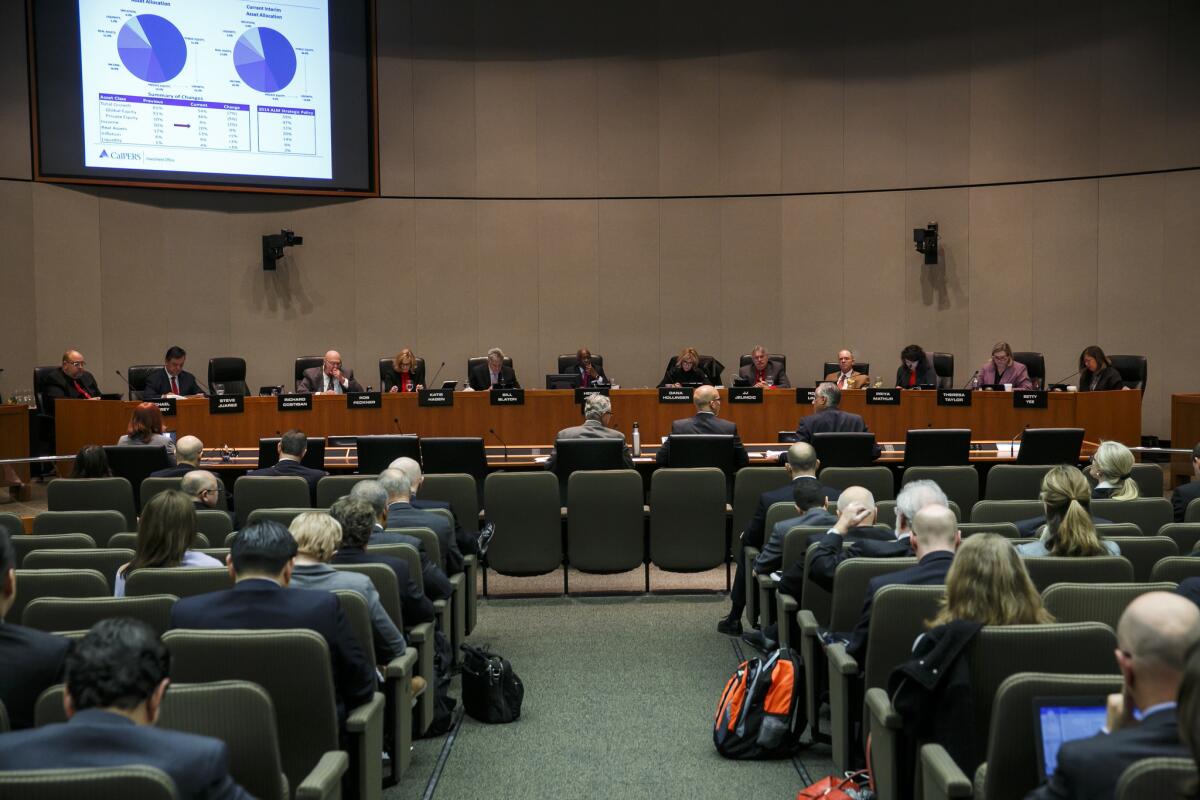
The investment committee of California’s largest pension fund took action Tuesday to lower long-term investment projections beginning next summer, a decision requiring larger annual contributions from taxpayers.
The proposal will be considered by the full board of directors of the California Public Employees Retirement Fund, CalPERS, on Wednesday. The proposal would take three years to fully implement, lowering the official rate of return on pension investments from the current 7.5% to 7%.
Ted Eliopoulos, the chief investment officer of CalPERS, told directors that the pension fund needs “additional cash to close the growing gap between benefits going out, and contributions coming in.”
CalPERS officials said that the 7.5% rate of return, which was put in place four years ago, could be achieved only by moving more of the fund’s $299-billion portfolio into real estate and private equity investments — the kinds of commitments that would take up dollars now being used to pay benefits to retired government workers.
“That’s just not practical, reasonable or prudent,” said Allan Emkin, an investment consultant asked to analyze CalPERS’ options.
Under the plan, the three-year transition to a lower investment assumption would be delayed an additional year for schools and local governments. A member of Gov. Jerry Brown’s budget staff said the action would require as much as $2 billion in annual state payments by the time of full implementation in 2020.
“We believe this schedule would give [government] employers time to plan their budgets and minimize the impact,” said Cheryl Eason, the chief financial officer of CalPERS.
Representatives of public employee unions, who criticized the more conservative approach in a pension fund meeting last month, warned of the costs to government workers who will be required to contribute more from their paychecks.
“Nobody has the crystal ball to project the future,” Jai Sookprasert of the California School Employees Assn. said to pension board members. “We believe this action you are about to take will have a major impact on employees and employers.”
Investment advisors told the pension fund leaders that under current economic conditions, there could be as little as a 14% chance of CalPERS’ achieving its current investment expectations over the next decade given the amount of money being paid each year to a rising number of retired government workers.
Last year, CalPERS paid out $5 billion more in retirement payments than it took in as employee contributions, a reflection of the quickly aging worker population.
“We are at this very painful, unique moment in time,” CalPERS board member Priya Mathur said. “We have been entrusted by employers to deliver the pension promises that they make to their employees.”
L.A. County politicians and donors had the most campaign law violations in California this year
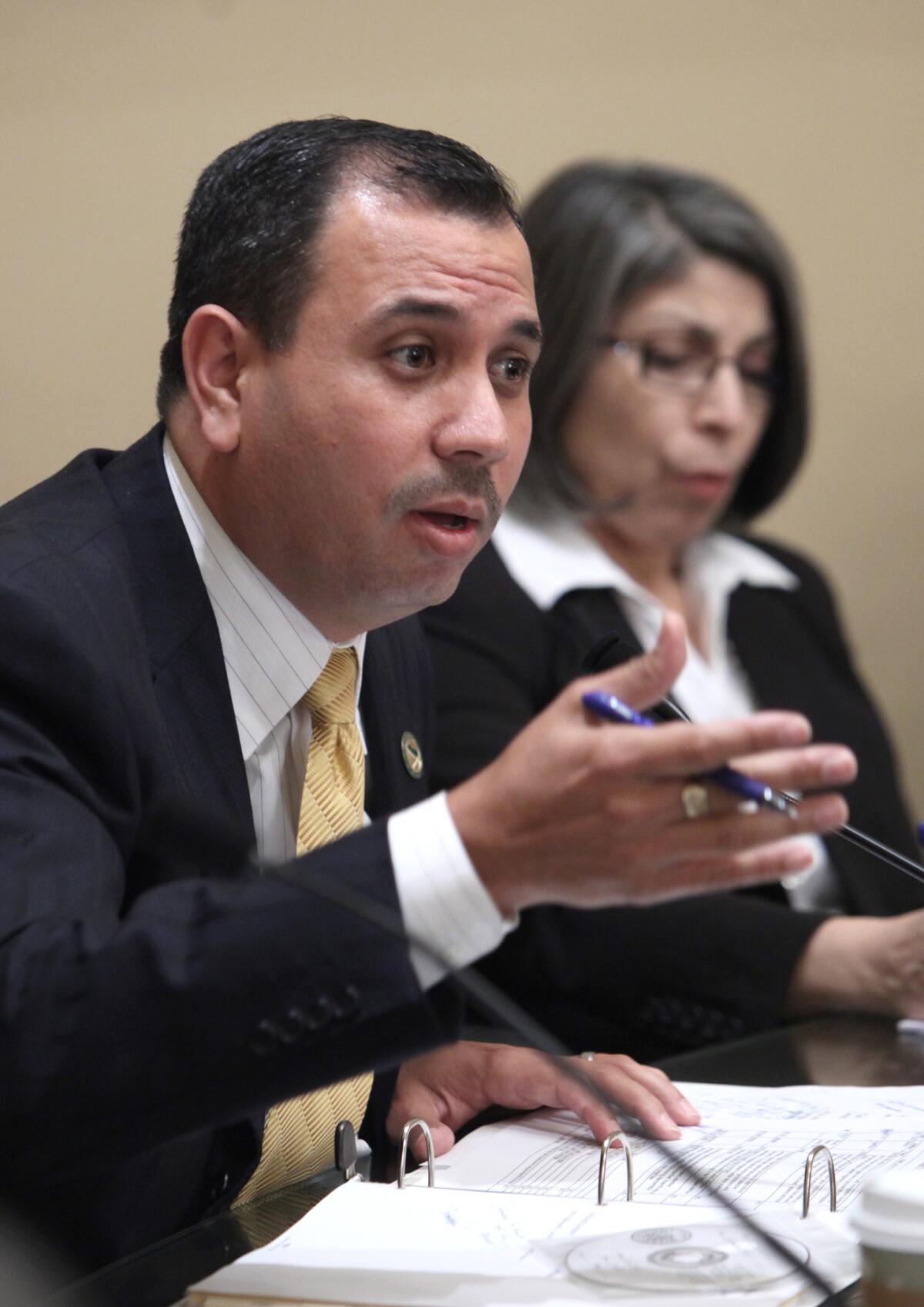
Los Angeles County had more cases of politicians and others successfully prosecuted for violating campaign finance and ethics rules than any other county in California this year, the state Fair Political Practices Commission reported Tuesday.
The agency prosecuted 72 cases this year from Los Angeles County, many more than the 23 in Santa Clara County, the second-highest number of violations among the 58 counties. The FPPC prosecuted 13 cases each in Orange and Ventura counties, 12 in Kern County, seven in Riverside County and six in San Bernardino County, according to an interactive map posted by the state ethics watchdog agency.
“We are always striving to improve our technology to increase transparency,” said FPPC Chair Jodi Remke. “The heat map will help inform voters and strengthen accountability.”
In all, the FPPC successfully prosecuted 311 cases statewide this year with penalties totaling $894,257, she said.
The largest fine involving a Los Angeles County politician was $57,000 levied by the FPPC against state Sen. Tony Mendoza (D-Artesia) in a case involving campaign money laundering and other violations in aiding a political ally.
Buddhist reverend is newest chaplain for California Assembly
Monday’s gathering of the California electors featured formalities only trotted out every four years. But the proceedings began with two sounds that will likely be Capitol staples next year: a ringing Buddhist prayer bell and the distinctive baritone voice of Rev. Bob Oshita.
The 67-year-old is the newest Assembly chaplain. He most recently was reverend of the Buddhist Church of Sacramento.
Oshita, who also presided over the swearing-in ceremony for legislators earlier this month, began his opening prayer on Monday with the crisp chime of a bell and a call for “calming self-reflection.” His urging of introspection lent an air of solemnity to the ceremony, during which all 55 of California’s electors cast votes for Hillary Clinton.
“The greater the responsibilities of leadership, the more there is a need for deep and quiet reflection in each day,” Oshita told the electors.
Oshita and his wife, Patti, for decades have been involved with their church, which has been a longtime centerpiece of the local Japanese American community, the Sacramento Bee reported. He offered the opening prayer when the Dalai Lama addressed a joint session of the Legislature last June.
Asian Americans in the Legislature cheered Oshita’s appointment when it was announced earlier this month.
“His experience working with young people, tending to the spiritual needs of a variety of communities, and serving for many years in the [capital] city as a compassionate and committed reverend will serve us well in his new role,” Assemblyman Rob Bonta (D-Alameda), chairman of the Asian Pacific Islander Legislative Caucus, said in a statement.
The new chaplain replaces Father Constantine Pappademos, a Greek Orthodox priest who served various roles at the Capitol, including Assembly chaplain from 2003 until this year. Oshita’s counterpart in the Senate is Sister Michelle Gorman, a Roman Catholic nun who has served in the role since 2014.
FOR THE RECORD:
3:10 p.m.: A previous version of this post misspelled the last name of former chaplain Father Constantine Pappademos as Pappedemos.
The state tax break for second homes is being targeted by lawmakers
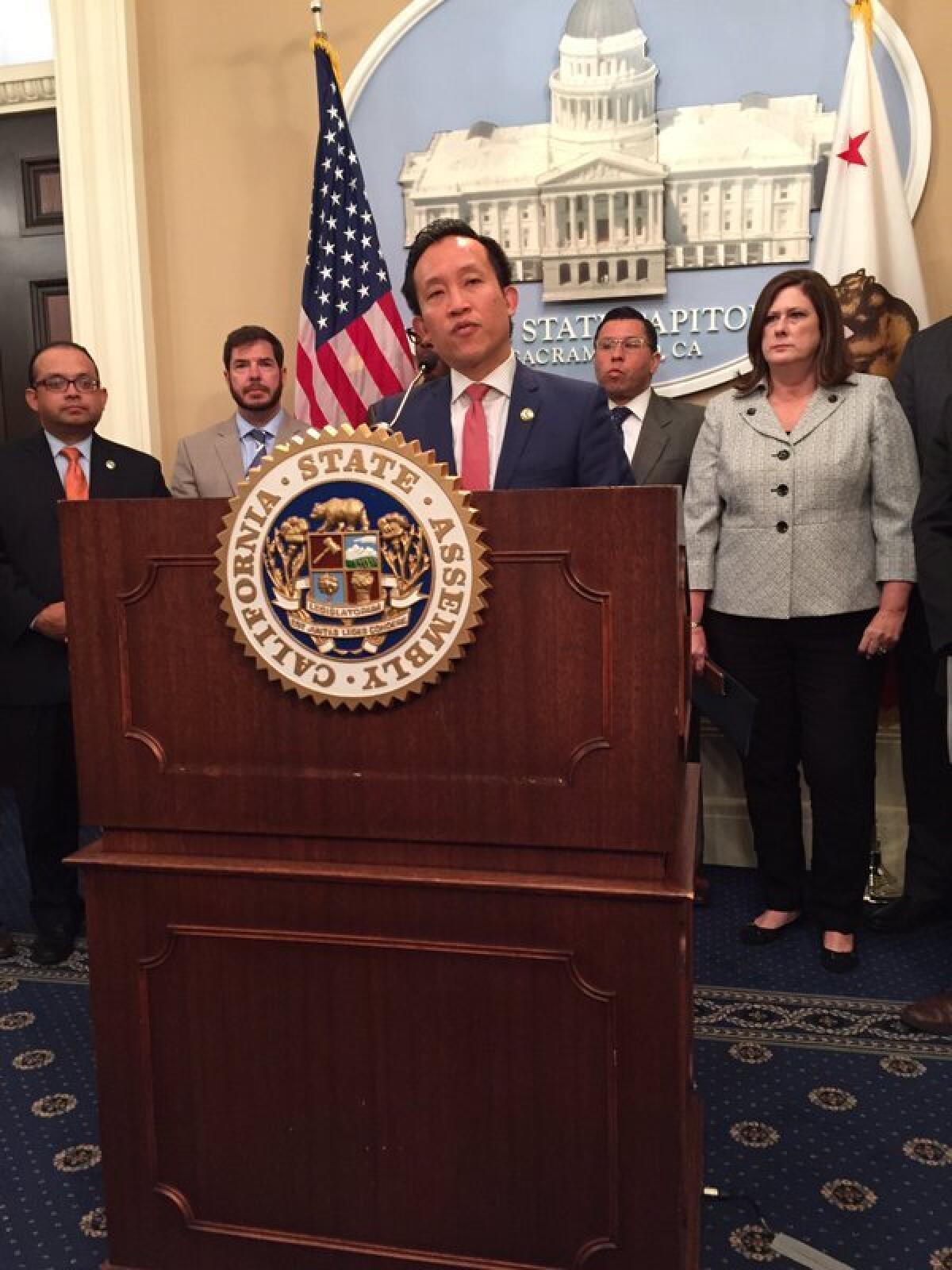
Following a year without major legislation to address California’s housing affordability crisis, state lawmakers have already introduced a number of bills designed to increase spending on low-income housing and boost production.
One proposal from Assemblyman David Chiu (D-San Francisco) would eliminate the state’s mortgage interest deduction on Californians’ second homes and redirect $300 million a year to tax credits that support low-income development.
The measure would require two-thirds approval in the Legislature and is a test of lawmakers’ long history of supporting tax subsidies for homeowners.
California secession organizers say they’ve opened an embassy -- in Moscow
California gained an embassy in Russia last weekend, at least in the eyes of those who have promised to seek a statewide vote on secession, nicknamed “Calexit,” in 2018.
Louis Marinelli, a San Diego resident who is the leader of the group promoting an effort to turn the state into an independent country, organized the Moscow event that was publicized on social media.
“We want to start laying the groundwork for a dialogue about an independent California joining the United Nations now,” he said in an email Monday.
Marinelli is currently working as an English teacher in Russia, and said he is there working on immigration issues related to his wife, who is a Russian national.
The effort faces the longest of odds, requiring not only initial approval by California voters in 2018 but a subsequent special election in 2019. Even if successful then, the proposal would have to pass difficult if not insurmountable legal obstacles.
Marinelli said he’s not discouraged by the high hurdles.
“All major social and political movements in this country take time and inevitably have to overcome failures and setbacks before they are ultimately successful,” he said.
Secessionists formally launch quest for California’s independence
Big-city mayors oppose ‘Calexit’ secession effort
California members of Congress petition Trump on climate change and abortion restrictions
Two members of the California congressional delegation, along with other lawmakers, wrote letters to President-elect Donald Trump this week, one warning him against targeting scientists researching climate change and another asking him to eliminate restrictions on federal money being used to provide abortions.
Responding to news that the Trump transition team requested detailed information about scientists working on climate change in Department of Energy national lboratories, Rep. Eric Swalwell (D-Dublin) led a letter signed by 26 colleagues warning that the members of Congress would defend the scientists in court if necessary.
Swalwell’s district includes Lawrence Livermore National Laboratory and Sandia National Laboratory. Four national laboratories in California employ 22,500 people, according to the Energy Department.
Trump has said he’s not convinced that climate change is real. The Trump transition team said the team member who had requested the information has since been disciplined.
“Such questions about [Department of Energy] lab staff are worrisome because they suggest there may be attempts by the incoming Administration to retaliate against them or defund their work, even if blame for the questionnaire is now said to rest with a reportedly ‘rogue’ transition team employee,” the letter states. “Regardless of one’s views on climate change, it is simply inappropriate to target hard-working public servants simply for doing their jobs.”
Facing another two years as the minority party in the House and Senate, letters signed by a few dozen colleagues is a way for Democrats to draw attention to policy issues, especially with a Republican also controlling the executive branch.
Rep. Barbara Lee (D-Oakland) led a letter signed by more than 100 House colleagues urging Trump not to include 1976 Hyde Amendment in his 2018 budget. The amendment, when invoked, prevents federal funds from being used to pay for abortions.
“Every person should be treated with dignity, compassion and respect — and that includes a woman’s right to make her own decisions about whether to end a pregnancy. We urge you to begin your presidency with a clear and bold statement that abortion coverage bans have no place in our public policy,” the letter states.
Over the years, the Hyde Amendment restriction has been used for those on Medicare and Medicaid, federal employees, Peace Corps volunteers, female prisoners and others who receive federally funded healthcare. Many of those people have low incomes and are minorities, the letter states.
During the campaign, Trump said he was “totally against abortion” He also said that “there has to be some form of punishment” for women who get an abortion if it were outlawed, a statement his campaign quickly walked back.
If you’re from this Redlands district, here’s how to get your Trump inauguration tickets
Kamala Harris nabs national security, environment assignments in the U.S. Senate
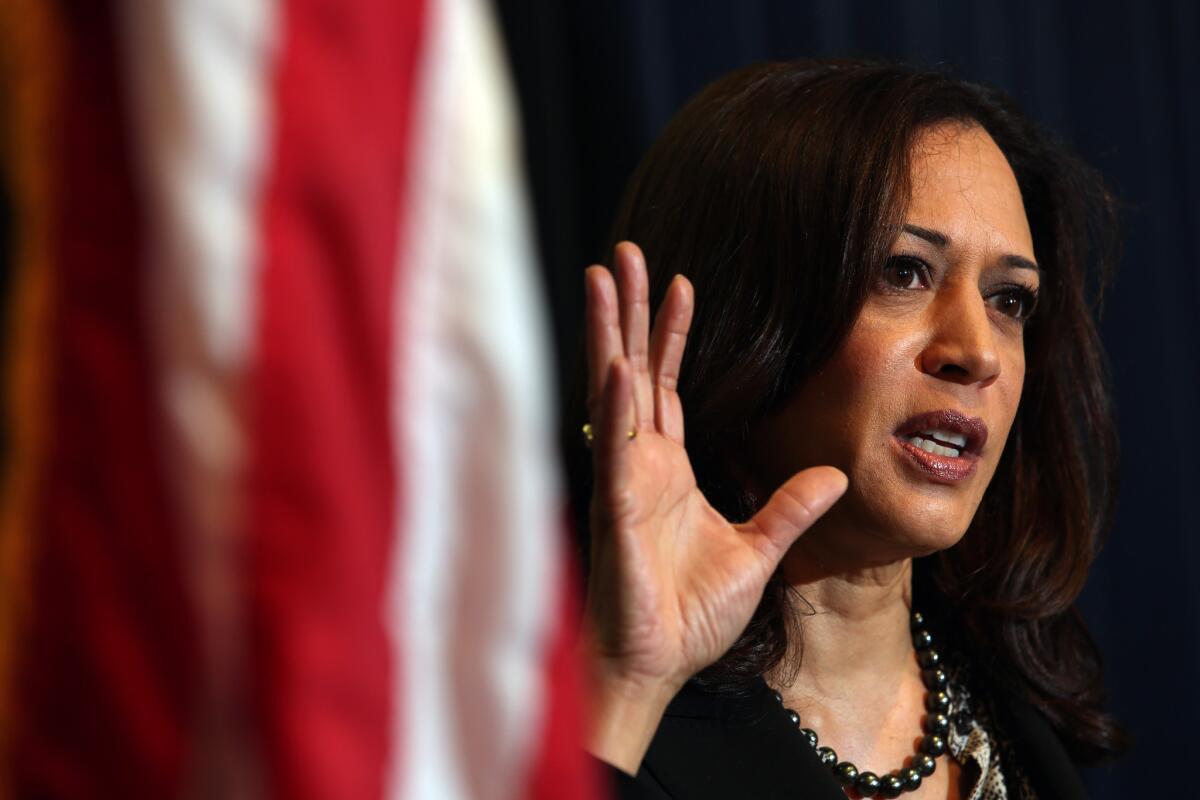
Sen.-elect Kamala Harris said Monday that her committee assignments in the U.S. Senate will be “key battlegrounds” in next year’s major policy debates on Capitol Hill.
The incoming freshman Democrat will serve on the Homeland Security and Governmental Affairs Committee; the Select Committee on Intelligence; the Committee on Environment & Public Works; and the Committee on the Budget.
In a written statement, Harris said she believes the four committees will be tasked with examining a number of the proposals promoted by the incoming administration of President-elect Donald Trump.
“At a time when so many Californians and Americans are uncertain about our future, I will aggressively fight for our families and the ideals of our nation,” Harris said.
Anti-Trump protesters gather in Sacramento for the electoral college vote
California’s 55 presidential electors will cast their votes at the state Capitol on Monday afternoon. For coverage of the events in Sacramento and state capitals across the country, follow the latest news on Trail Guide.
Lawmakers say Trump should disclose tax returns to get on California’s 2020 ballot
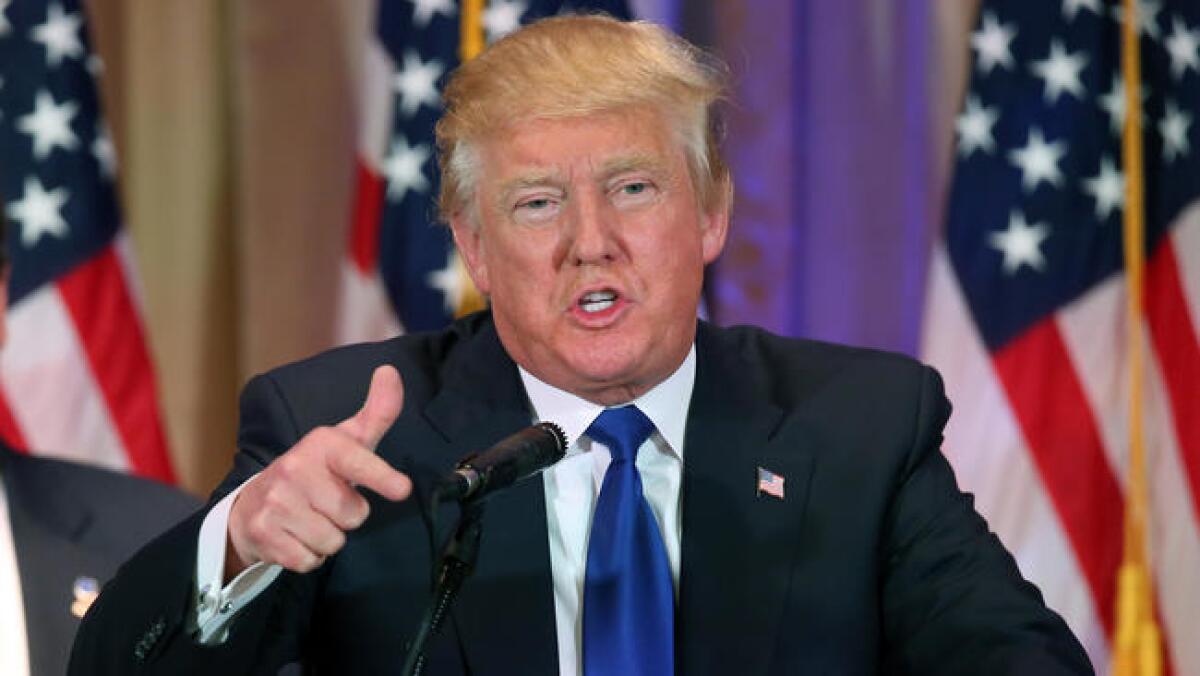
President-elect Donald Trump would have to disclose his tax returns to the public to win a spot on California’s statewide ballot in 2020 under a plan two lawmakers will introduce in Sacramento.
The legislation is inspired by a similar effort in New York and would require any candidate to disclose five years of tax returns no later than 50 days before a general election.
“Transparency is a non-partisan issue,” said state Sen. Mike McGuire (D-Healdsburg) in a statement. “Voters not only deserve full disclosure of their future leader’s tax returns, they should be entitled to them.”
The refusal by the president-elect to release his tax returns broke a streak for candidate disclosure that dated back four decades. The efforts in California and New York seek to force candidates to comply by using election law.
“Requiring that this basic financial information be made available to voters will help build critical public trust,” said state Sen. Scott Wiener (D-San Francisco), the co-author of the legislation.
California Politics Podcast: Gov. Jerry Brown takes on climate science critics
Gov. Jerry Brown is wasting no time in drawing a line on the issue of climate change with the incoming administration of President-elect Donald Trump.
This week’s episode of the California Politics Podcast takes a closer look at the governor’s comments last week in San Francisco — a speech in which he made clear California is prepared to go it alone on climate policies if needed.
And in this last episode of 2016, we offer a few key takeaways from the year in California politics as well as what role those issues might play in the debates of 2017.
I’m joined by Marisa Lagos of KQED News.
Prominent California Republicans urge party members to keep Jim Brulte on as state GOP chairman
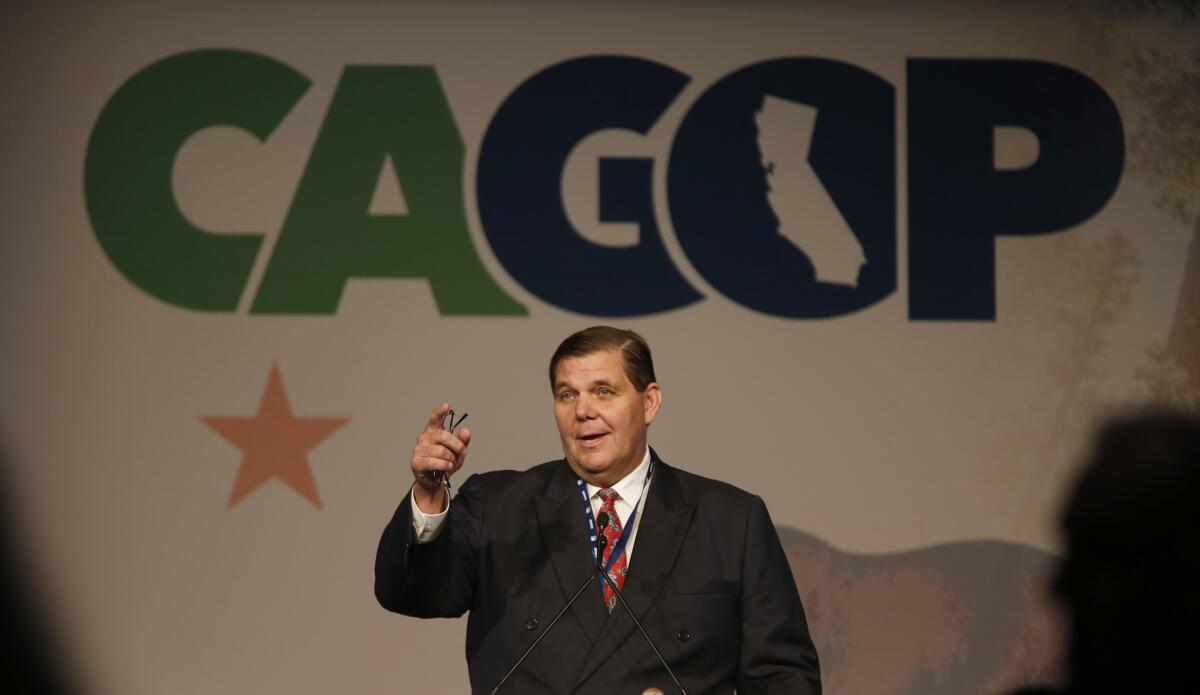
Three top California Republicans sent a letter Friday urging party members to retain state GOP Chairman Jim Brulte as the party looks toward statewide elections in 2018.
“It’s no secret that California’s demographic trends present challenges for the GOP,” read the letter, signed by Tim Clark, California director for the Donald Trump campaign; Ron Nehring, a former state GOP chairman; and Steve Poizner, who as state insurance commissioner from 2007 to 2011 was the last Republican to hold statewide office.
“Chairman Brulte understands that Republicans must focus, in the short term, on winning battles where we can, while also making permanent, long-term growth into California’s diverse communities,” the letter continued.
Brulte, a former state Senate Republican leader from Rancho Cucamonga, took over as chairman in 2013 at a time when the party was in disarray and in massive debt. He was reelected in 2015.
Earlier this year, party leaders voted to change party rules to allow Brulte to serve two more terms if reelected.
The chairmanship vote will take place during the state Republican spring convention, scheduled for Feb. 24-26 in Sacramento.
Times staff writer Phil Willon contributed to this report.
California Secretary of State Alex Padilla certifies historic results in ‘smooth’ election
California Secretary of State Alex Padilla on Friday certified a record-breaking count of 14.6 million ballots cast statewide, calling the November 2016 election “smooth” and free of compromises or breaches.
Padilla, a Democrat who endorsed Hillary Clinton during the primary season, once more refuted a claim by President-elect Donald Trump of rampant voter fraud statewide, saying it was “absolutely false” and without basis or evidence.
He declined to speculate as to what could happen Monday, when the members of the electoral college across the nation cast their votes for president. But he said he hoped that process in California would go as smoothly as the general election.
“Bottom line, I can assure you that the elections officials at the state level and across all 58 counties pride themselves on professionalism,” he said. “We stand by the results. We stand by the process, and we stand by protecting people’s voting rights in California.”
Election results show Hillary Clinton won the state with 62.2% of the popular vote — 4.2 million votes over Trump, the largest margin of victory for a presidential candidate since 1936.
The last time California saw a record number of ballots cast was in 2008, when 13.7 million votes were counted. Registered voter turnout this November election reached more than 75%, with nearly 58% of voters casting their ballots by mail.
California delegate to Republican National Convention pays a visit to Trump Tower
California may have overwhelmingly voted for Hillary Clinton, but Donald Trump still has passionate supporters from the state.
Shirley Husar, a Republican National Convention delegate from Pasadena, visited Trump Tower on Friday to talk about urban renewal with Omarosa Manigault, a Trump advisor and former “Apprentice” contestant.
Husar, who is African American, helped nominate Trump at the convention, calling him a “candidate that can provide for my boys and all Californians the hope and opportunity of the true America.”
Husar has criticized Black Lives Matter activists and the role of government assistance programs and she praised Trump in comments to reporters on Friday.
“We’re excited,” she said. “The African American coalition is growing.”
Coming to the state Capitol on Monday: California’s 55 electors
The 2016 presidential campaign will finally come to an end Monday when the members of the electoral college across the nation cast their votes for president, reflecting the outcome of the Nov. 8 election.
While that action will officially seal the win for Donald Trump, in California, the ceremony will be decidedly centered around Hillary Clinton, whose decisive victory here helped power her lead in the nationwide popular vote.
She will be the choice of California’s 55 Democratic electors, who will convene at 2 p.m. in the state Capitol to cast their votes.
Because all of the state’s electoral votes go to the winner, the crowd gathering Monday will be entirely aligned with the Democrats -- a delegation chosen by the state’s two U.S. senators as well as congressional nominees in each district. A federal judge on Friday rejected a challenge to the state’s winner-take-all requirement.
The electors include Christine Pelosi, daughter of House Minority Leader Nancy Pelosi of San Francisco, and Olivia Reyes-Becerra, daughter of Rep. Xavier Becerra of Los Angeles, just selected to be the state’s next attorney general.
The group also includes elected officials such as Assemblywomen Shirley Weber of San Diego and Susan Talamantes Eggman of Stockton.
The Times will cover this meeting and the day’s electoral college events live.
Former LAUSD board member enters the fray to replace Xavier Becerra
California’s top elections officer says it’s past time to revisit the electoral college
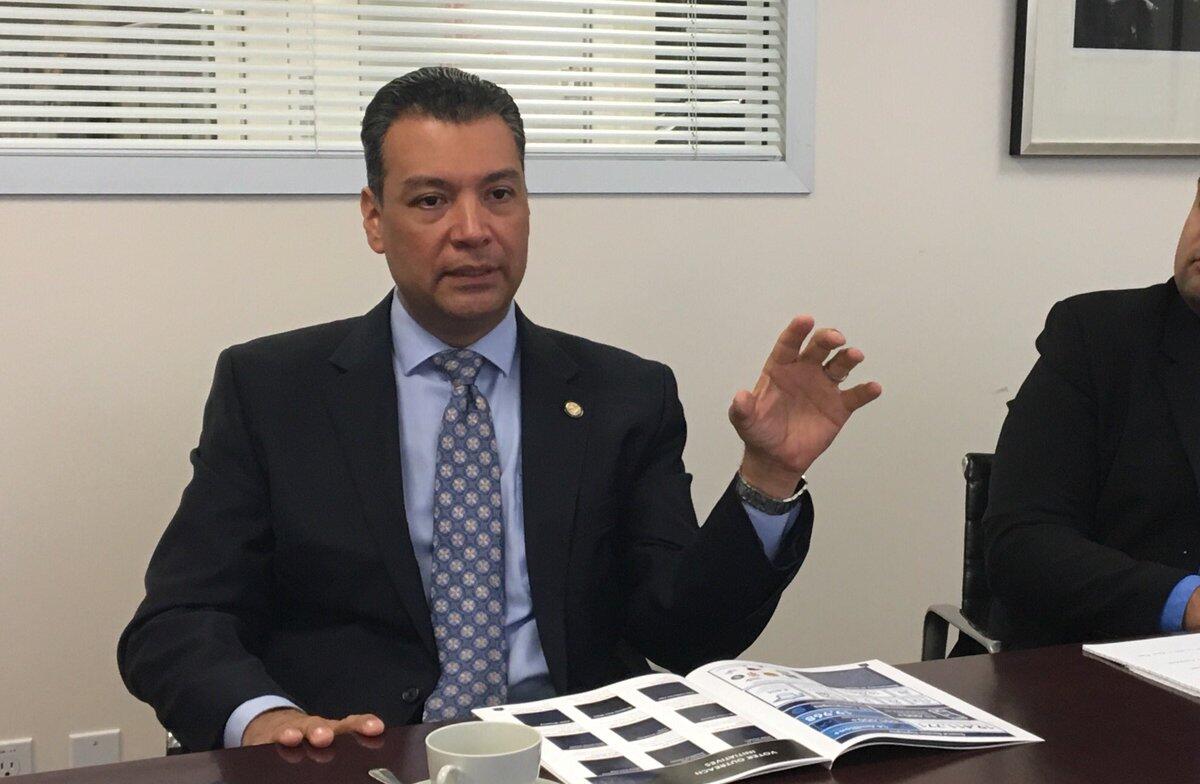
Secretary of State Alex Padilla, who will certify the results of the Nov. 8 election this week, said it’s wrong to consider overhauling some parts of federal voting law without also weighing the merits of the electoral college in the modern era.
“Is it past time to revisit the electoral college? Absolutely,” Padilla said Thursday in a meeting with The Times Editorial Board.
Padilla, a Democrat who endorsed Hillary Clinton during the primary season, took note of a 2013 U.S. Supreme Court decision to strike a portion of the 1965 Voting Rights Act, which a majority of justices saw as no longer needed.
“I can’t ignore the parallel,” Padilla said. “If the Supreme Court of the United States found that the formula for the Voting Rights Act, which was only 50 years old, no longer applied and was worth revisiting, why not the electoral college?”
Still, the state’s chief elections officer declined to say whether he thinks — as some have suggested — that presidential electors in states across the nation should be allowed to vote their conscience when they meet next week. California law requires the 55 electors chosen by Democrats to vote for the nominees of their party.
“I think the state law is pretty clear in California on what electors are supposed to do,” he said.
Padilla noted that California is part of an 11-state compact whose members have agreed to cast their electoral votes for the presidential candidate that wins the national popular vote. The compact has no legal effect, however, until enough state legislatures sign on and pass legislation binding their states to the agreement to total the 270 electoral college votes a candidate needs to become president.
------------
FOR THE RECORD
4:38 p.m. Dec. 17: A previous version of this post said presidential electors should be allowed to vote their conscience when they meet next year. They will meet next week.
Assemblyman Jimmy Gomez racks up endorsements from Latino elected officials in fight for Becerra’s congressional seat
As other potential candidates have been weighing whether to jump in to the race to replace Rep. Xavier Becerra (D-Los Angeles), L.A. Assemblyman Jimmy Gomez has been busy rolling out endorsements from state and national Latino leaders.
Five members of the Congressional Hispanic Caucus have endorsed Gomez so far: Reps. Grace Napolitano (D-Norwalk), Pete Aguilar (D-Redlands), Juan Vargas (D-San Diego), Filemon Vega of Texas and Arizona’s Ruben Gallego.
Gomez already has support from state Senate leader Kevin de León of Los Angeles, Assembly Speaker Anthony Rendon of Paramount and L.A. County Supervisor Hilda Solis.
He also scored the backing of outgoing state Atty. Gen. Kamala Harris, who will be sworn in as U.S. senator next month.
On Wednesday, Gomez also announced the endorsement of L.A. City Councilman Gil Cedillo, who had previously considered running for the seat himself.
“This is not a training job,” Cedillo said at a press conference in Macarthur Park Wednesday. “This is a job where people...will be in the moment of crisis, whose voices must be heard, whose leadership must be demonstrated.”
Assembly Republican leader doesn’t believe there’s widespread voter fraud in California
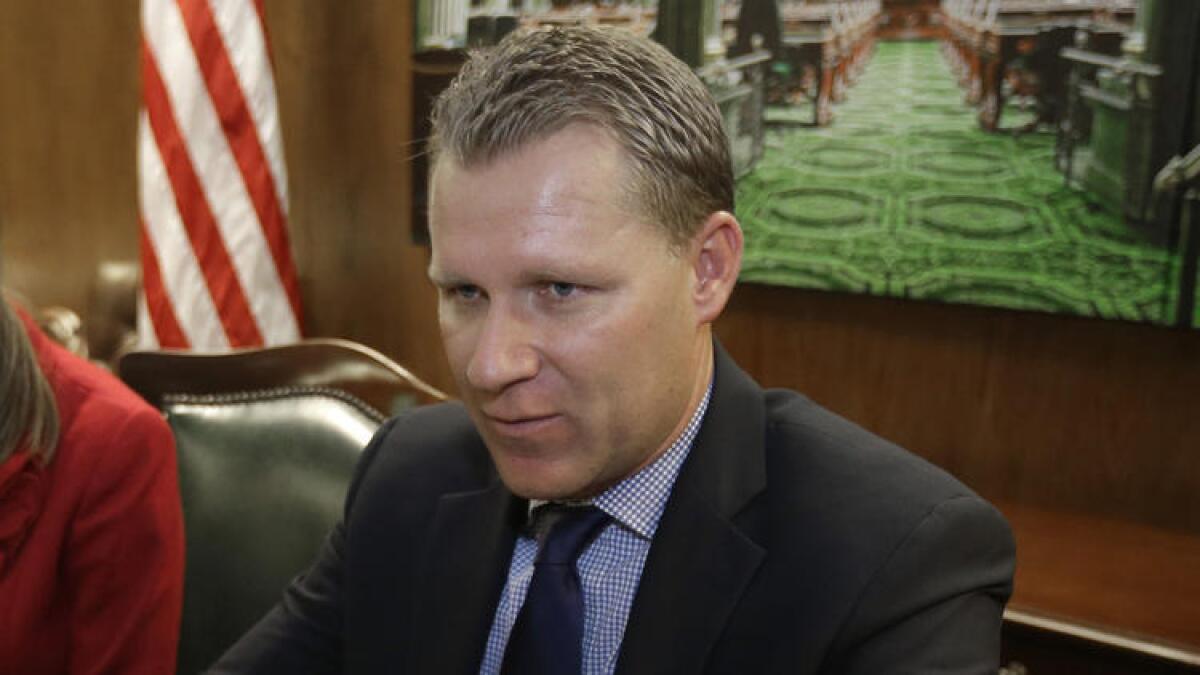
Contradicting claims made by President-elect Donald Trump, the state Assembly’s top Republican said Wednesday that he doesn’t believe there was rampant voter fraud in California on Nov. 8.
“I don’t think there’s widespread fraud in California,” said Assembly GOP leader Chad Mayes (R-Yucca Valley) in an interview with The Times in Sacramento.
In a Nov. 27 tweet, Trump alleged “serious voter fraud” in California and two other states — an allegation without any evidence to support it. It was the president-elect’s first and only comment about the results in California, which he lost to Hillary Clinton by almost 4.3 million votes.
Mayes, who declined to say how he cast his ballot for president, voiced concerns about reports of some isolated incidents involving either voting errors or mistaken registration. Republicans have demanded a new look, in particular, at the online voter registration site maintained by the secretary of state’s office.
“Do I think that there are other ways that folks try to game the system?” Mayes said. “Maybe. But I do think the people that vote, and if they’re legal to be able to vote, that their vote is cast appropriately and it’s counted appropriately.”
Mayes, who talked about priorities ranging from transportation to healthcare benefits, now leads a GOP caucus that has shrunk since the previous two-year session of the Legislature. Republicans now hold only 25 Assembly seats, a net loss of two lawmakers after Democrats won a supermajority of both houses.
But the Republican leader did not say he believed there was any evidence of a systemic problem that would undermine the integrity of California elections.
“From what I’ve seen, it’s been very clear that we’ve got a good system,” Mayes said.
People who live in public housing would be banned from smoking and vaping in their homes under new bill

Residents of government housing would be barred from smoking and using electronic cigarettes inside their residential units and within 25 feet of buildings under legislation introduced by Assemblyman Jim Wood (D-Healdsburg).
The bill is one in several measures restricting tobacco use in California in recent years because of health concerns, and comes as the U.S. Department of Housing and Urban Development has drafted rules for a nationwide public housing smoking ban to be implemented in the next 18 months.
“This is a great step forward in protecting families by significantly reducing exposure to second-hand smoke and this bill codifies federal regulations,” Wood said. “In AB 62, we are taking it a step further by including the use of e-cigarettes to be consistent with California’s definition of tobacco products which includes e-cigarettes and other vaping products.”
The measure would give public housing agencies until July 30, 2018, to put smoking restrictions in place.
‘We’re ready to fight.’ Gov. Jerry Brown unloads on Trump and climate issues
In perhaps his most fiery comments since Donald Trump won the presidency, Gov. Jerry Brown said on Wednesday California will push back against any effort to stop or reverse policies fighting global climate change.
“We’ve got the scientists, we’ve got the lawyers and we’re ready to fight,” Brown said to applause during a speech to the American Geophysical Union in San Francisco.
The governor has mostly held back in recent weeks from commenting on the potential policy changes promised by the president-elect during the campaign. But in the impassioned speech to a group of scientists, Brown lamented what he described as a “miasma of nonsense” on important issues facing the nation and world.
The only direct comment about the president-elect came in a reference to worries that climate research conducted by NASA could come to an end under the new administration. Brown reminded the crowd of the nickname he was given by a newspaper columnist in 1976, “Governor Moonbeam,” for his interest in a state-sponsored satellite.
“If Trump turns off the satellites, California will launch its own damn satellite,” roared Brown to the crowd.
And referring to Rick Perry, the former Texas governor Trump has selected to lead the Dept. of Energy, Brown reminded everyone of California’s advantages over Texas when it comes to renewable energy.
“We’ve got more sun than you’ve got oil,” he quipped.
Former Bernie Sanders campaign aide Arturo Carmona enters race to replace Becerra
L.A. Mayor Eric Garcetti talks to Chelsea Handler about his conversation with Trump
When it comes to dealing with Donald Trump, Los Angeles Mayor Eric Garcetti seems committed to walking a political tightrope: offering to work with Trump on some issues while pushing back on the president-elect’s immigration stance.
Garcetti discussed his phone conversation with Trump in an interview with television host Chelsea Handler that will be available to stream on Netflix early Wednesday. The pair talked about new infrastructure spending and the city’s Olympic bid.
“I encouraged him to work with us to figure out a way to fix the system instead of just going after the immigrants as scapegoats,” he said.
He was mum when asked how Trump replied.
“I always respect private conversations, but in broad terms, he said ‘I want to fix a broken system,’ so I think there was an opening there,” Garcetti said.
Perhaps channeling California Gov. Jerry Brown’s penchant for quoting philosophers, Garcetti urged those upset by the presidential election to pay more attention to local politics by repeating a quote attributed to French philosopher Ernest Renan: “The nation is a daily plebiscite.”
The interview ended with Garcetti thanking Handler for the gifts guests receive when they come on the show.
“Even for the boys, we get birth control pill cases that say ‘Chelsea,’” he said holding up a blue case. “That is very considerate, thank you.”
Criticism is fierce over an effort to cancel California pension fund investments in tobacco

A pair of powerful California elected officials expressed outrage Tuesday at a recommendation that the state’s largest public employee pension fund cancel its ban on investing in tobacco companies.
A staff report from the California Public Employees Retirement System calls for the agency’s directors to abandon a 16-year effort to move away from tobacco-related securities. The report estimates there are about $547 million worth of investments related to tobacco in the CalPERS portfolio.
CalPERS staffers wrote that the existing policy has left pension fund managers in limbo, and that any effort to completely divest from the tobacco industry would be “tying the hands of investment staff, thereby severely hampering staff’s ability to re-evaluate and reinvest as market conditions warrant.”
Treasurer John Chiang, who sits on the CalPERS board, said Tuesday that the pension fund needs to make a complete break with tobacco investments.
“I continue to believe that investing in tobacco-related securities is a bad economic decision for CalPERS beneficiaries, for the state in general and for the world as a whole, whether we invest directly or through others,” Chiang wrote to the agency’s investment committee.
Lt. Gov. Gavin Newsom chimed in on Tuesday afternoon, calling any full cancellation of the ban on tobacco investments “about the most perverse course of action CalPERS can take.”
Both Chiang and Newsom have announced their plans to run for governor in 2018.
CalPERS’ board of directors is scheduled to consider the fate of tobacco investments on Dec. 19.
Gov. Brown asks President Obama to permanently ban new drilling off California’s coast

Seeking swift action before the arrival of a new president, Gov. Jerry Brown urged President Obama on Tuesday to make permanent the existing ban on new oil and gas drilling along the California coast.
“Now is the time to make permanent the protection of our ocean waters and beaches,” wrote Brown in the letter released by his office. The governor later participated in a San Diego event to mark California joining a regional effort to combat ocean acidification.
Brown’s letter comes almost two weeks after a similar request by legislative Democrats. Whether Obama could act in a way that could not be revisited by President-elect Donald Trump next year remains unclear, though a growing chorus of Democrats and environmental activists are urging an attempt by the president before he leaves office.
The governor also raised the issue of climate change in his letter to Obama.
“Clearly, large new oil and gas reserves would be inconsistent with our overriding imperative to reduce reliance on fossil fuels and combat the devastating impacts of climate change,” Brown wrote.
Oakland mayor searches for path forward in wake of deadly fire
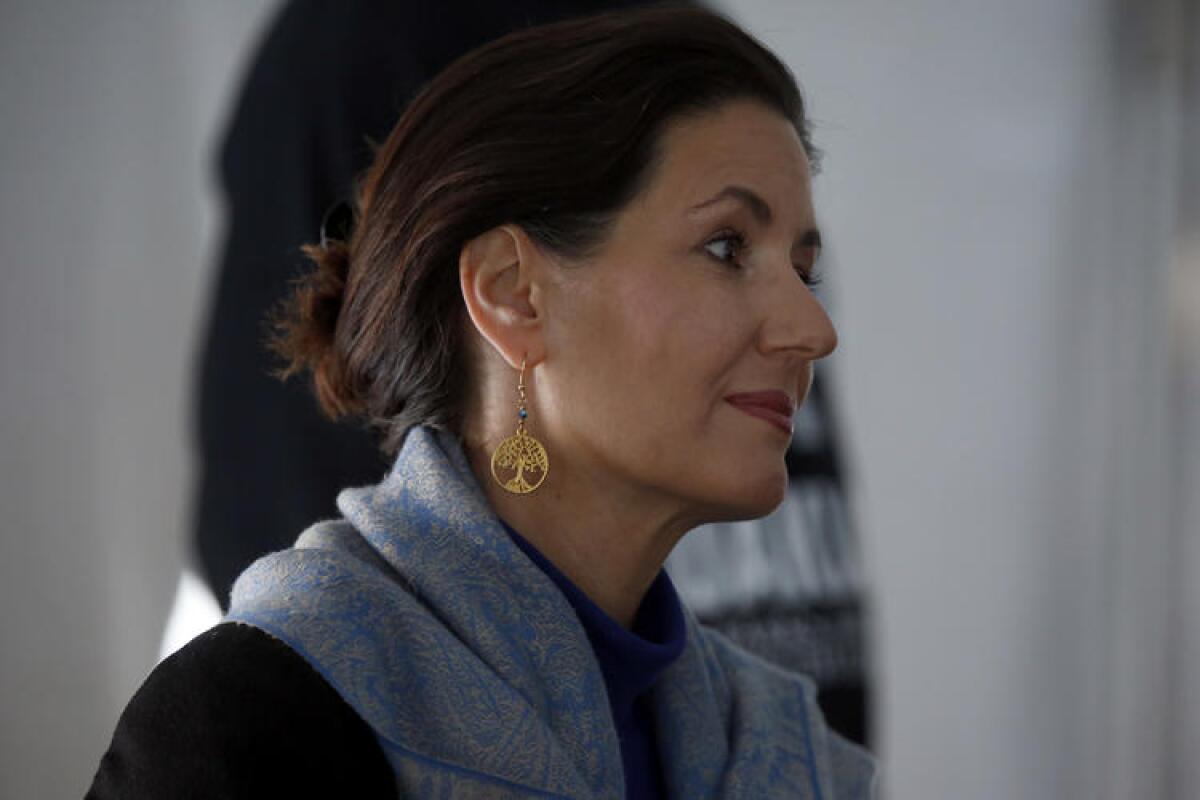
Being mayor of Oakland was never going to be an easy job. The city has struggled with crime, poverty and complex questions about how to adapt to the influx of wealth from the tech boom.
This is the situation Libby Schaaf inherited when she stepped into Oakland’s top job after winning the 2014 election, but it’s only gotten more difficult.
The Ghost Ship warehouse fire, which killed 36 people on Dec. 2, has become a tragic test for Schaaf’s administration as it tries to balance safety and affordability for residents.
Taxpayers’ group sues Gov. Brown to overturn law allowing public financing of campaigns
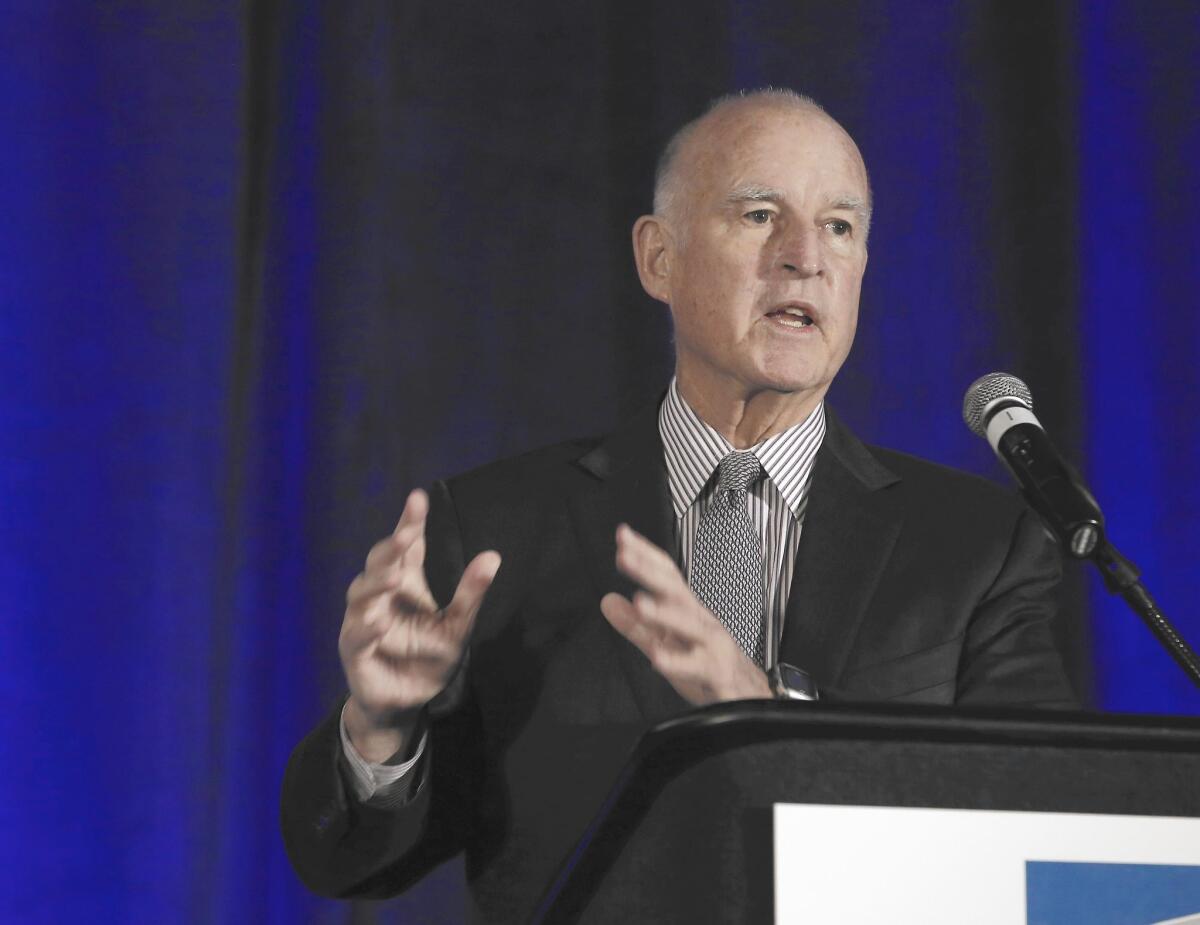
A taxpayer group has filed a lawsuit against Gov. Jerry Brown that seeks to invalidate a new law that will allow public funds to be used for political campaigning.
The lawsuit was filed in Sacramento Superior Court by the Howard Jarvis Taxpayers Assn. The legal challenge says that a law signed by Brown in September that allows cities and counties to use public financing for political campaigns violates Proposition 73, which voters approved in 1988 and prohibits public funds from being used in campaigns.
“It runs directly contrary to the expressed language of the Political Reform Act,” Jon Coupal, president of the association, said on Tuesday. He said the law cannot be changed without another vote of the people.
Using public funds to benefit candidates is unfair, Coupal said, because “it’s the power of government skewing the political process.”
The lawsuit, which was co-filed by retired state senator and judge Quentin L. Kopp names Brown and the state Fair Political Practices Commission.
Representatives of Brown and the commission declined comment. The measure was authored by state Sen. Ben Allen (D-Santa Monica).
Allen said at the time the law was signed that it could help reduce the influence of special interests that contribute to candidates’ campaigns.
“Anything we can do to empower communities to reduce the influence of money in campaigns is a good thing,” Allen said.
On Tuesday, Allen said he is confident the bill will survive the legal attack.
“Without SB 1107, we are powerless to offer candidates an alternative to the current reliance on special interest dollars,” Allen said in a statement.
12:08 p.m.: This post was updated with a comment from state Sen. Ben Allen (D-Santa Monica).
This post was originally published at 11:20 a.m.
California representatives want more information on government animal testing
Federal agencies don’t do enough to track and justify their use of live animals for research, several members of Congress wrote in a letter asking the U.S. Government Accountability Office to examine the issue.
Rep. Ken Calvert (R-Corona) and Rep. Dina Titus (D-Nev.) led the letter, which also was backed by Reps. Lucille Roybal-Allard (D-Downey), Ed Royce (R-Fullerton) and Mimi Walters (R-Irvine) and eight other House members.
“We have discovered it is impossible to determine what federal animal research programs currently entail, what they cost and if they meet federal standards because of the limited and decentralized information available publicly. Federal agencies are not currently required to publicly report their total use of animals in research, do not publish noncompliance reports and generally do not maintain searchable databases of animal research projects with information about their purpose, methods, results, and cost,” the letter says.
Calvert said without the reporting, it is difficult for Congress to tell whether the research is effective and where there may be redundancies.
“I’m not opposed to the rare testing of animals when it’s absolutely necessary,” Calvert said. But, “most people in America who are asked would say, ‘No, let’s not harm animals unnecessarily if there are other methods.’ ”
The representatives also are asking the government oversight agency to look at which federal agencies conduct animal research and testing and how each agency informs Congress and the public about the costs, type of research and outcomes of the testing. They also want the office to look at how agencies report problems with testing and report their efforts to develop alternatives to animal testing.
In addition, representatives are asking for data on how much money each agency spent on animal testing and how many animals were used in testing in fiscal year 2016.
“One, I like animals, but two, I don’t like waste,” Calvert said. “In the end, this is going to save a lot of money, and obviously it’s going to increase the welfare for many [animals].”
California’s members of Congress made a similar appeal earlier this year for information on the military’s use of animals for medical training instead of simulated human flesh.
How years of congressional wrangling led to a California water compromise

It took years of negotiations, and the right political timing, to bring the first major water policy affecting California in decades through the House and Senate.
Over frayed feelings and filibuster threats last week, both chambers overwhelmingly passed the bill, which changes how much water is pumped from the Sacramento-San Joaquin Delta to San Joaquin Valley farmers and Southern California.
So how did it come together?
Former Huizar aide Sara Hernandez announces she’s running for Rep. Xavier Becerra’s seat
Kamala Harris says California will ‘provide national leadership’ on immigration under a Trump administration
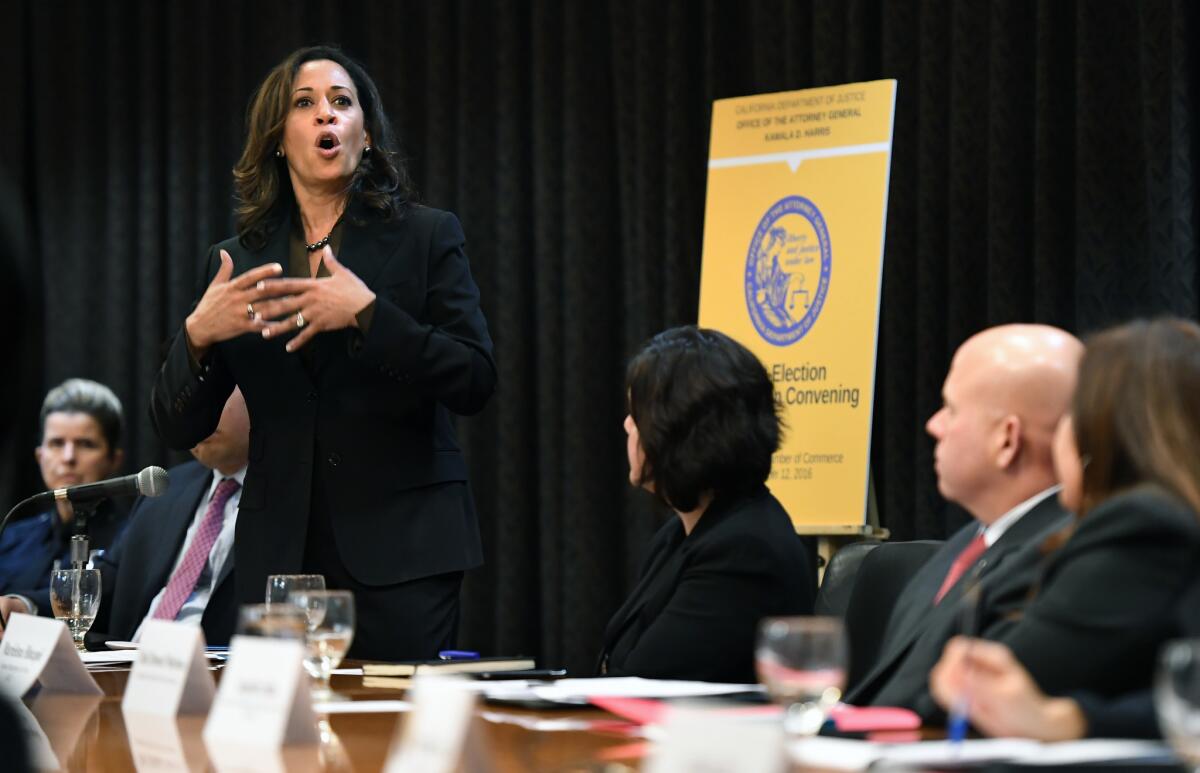
California Atty. Gen. Kamala Harris vowed Monday to be a loud, supportive voice for immigrants after she becomes a U.S. senator next month, pledging to push for comprehensive immigration reform and to work closely with lawmakers in Sacramento to “provide national leadership” on the topic.
Speaking to immigrant rights advocates, law enforcement officials, religious groups and business leaders at the Los Angeles Chamber of Commerce, Harris acknowledged that there is much anxiety over what President-elect Donald Trump — who said during the campaign that he wanted to build a wall along the Mexican border, deport millions of people and ban Muslim immigrants from entering the U.S. — will actually do when he takes office.
“We’re all feeling at least concerned,” Harris said. “We’re all feeling, I think, actually, a myriad of emotions.”
Harris said there are “two definitions of what it means to be a patriot.”
“There’s one definition that’s just, you defend your country, whatever it does,” she said. “And then there’s the kind of patriot I believe us all to be: the kind that will fight each and every day for the ideals of our country.… This is not subversive, this is not about anything other than love of country and, in loving our country, fighting for its ideals.”
Reporters were allowed into only the final few minutes of Harris’ hourlong discussion with local leaders. Those in the attendance included Gov. Jerry Brown’s choice for state attorney general, Rep. Xavier Becerra (D-Los Angeles); California Assemblyman Miguel Santiago (D-Los Angeles); and LAPD Chief Charlie Beck.
Speaking with reporters afterward, Harris said that people had shared stories about the crying children of immigrants and Muslims asking their parents if they were going to be sent away, and that law enforcement officials told her they worried victims of crimes would not report incidents out of fear that the police would turn them over to be deported. Harris also said people were concerned that parents who are in the U.S. illegally were keeping their children out of school and away from pediatricians because they worried about deportation.
“I feel very strongly that California’s voice must be a voice of leadership in Washington, D.C., on all the issues that we discussed,” she said. “We have an outsized stake in the outcome of the conversation about immigrants … and I feel very strongly that we must defend all people.”
Harris said she was against any policy that would deny children access to public health services, public safety and public education. She also said that the government has limited monetary resources and that although border safety is important, funding is also needed to address other areas including human trafficking and gun trafficking.
Former Modesto legislator Kristin Olsen nabs California GOP leadership post
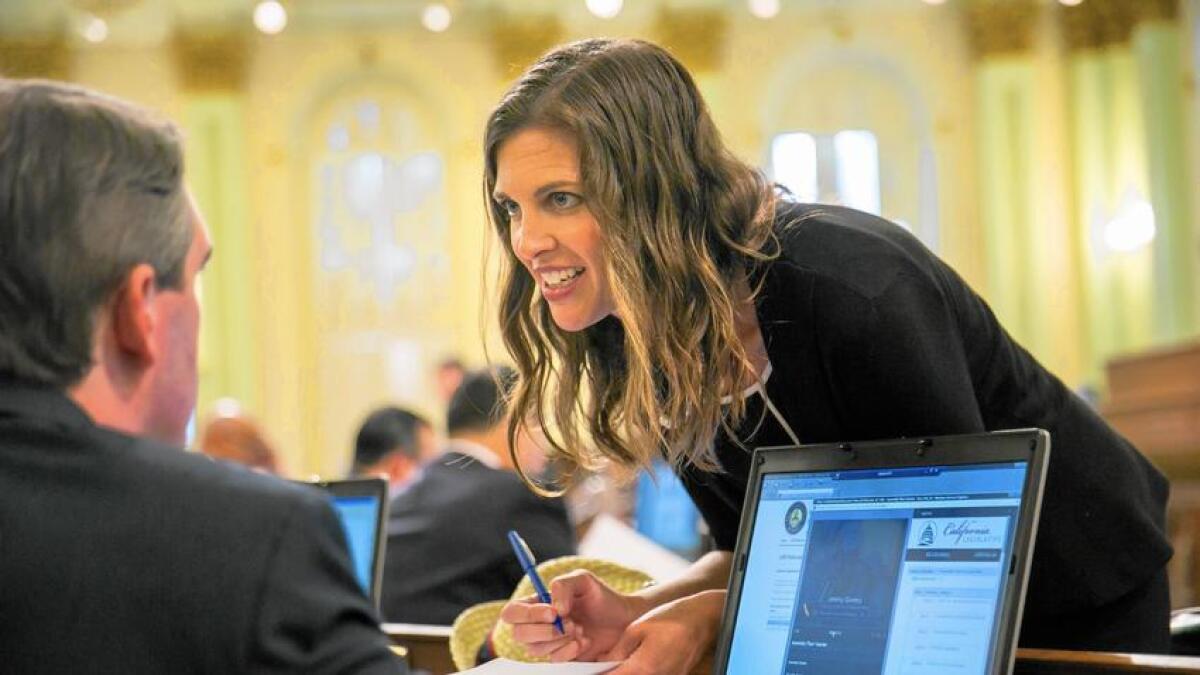
The California Republican Party has picked Kristin Olsen, a former assemblywoman from Modesto, to be its vice chair.
It’s the second new gig this year for Olsen, who was termed out of her Assembly seat this year and was recently elected to the Stanislaus County Board of Supervisors. Olsen’s six years in the Assembly included a 13-month stint as leader of the chamber’s Republican caucus.
“My goal is to help build a viable and vibrant Republican party in CA, because improving the lives of all Californians depends on having a healthy, two-party system in our state,” Olsen said in a statement.
“One-party Democrat rule is hurting people’s livelihoods and opportunities, and Californians deserve better than that,” she added.
Acknowledging the GOP’s weak presence in California — particularly in Sacramento, where Democrats secured a supermajority in the Legislature — Olsen said her party must study the “problems with the Republican brand” in the state.
In a statement, California GOP Chairman Jim Brulte said Olsen would play a key role in helping “continue to build the party from the ground up so we can better support Republicans.”
Olsen takes over the vice chair role from San Francisco attorney Harmeet K. Dhillon, who now serves as California’s national committeewoman for the national Republican Party.
Olympic champion Simone Biles to help California Democratic Party chairman raise money for foster youth
L.A. assemblyman snags high-profile backing from mayor, state Senate leader for Xavier Bacerra’s congressional seat
L.A. City Councilman David Ryu is not running for Rep. Xavier Becerra’s congressional seat
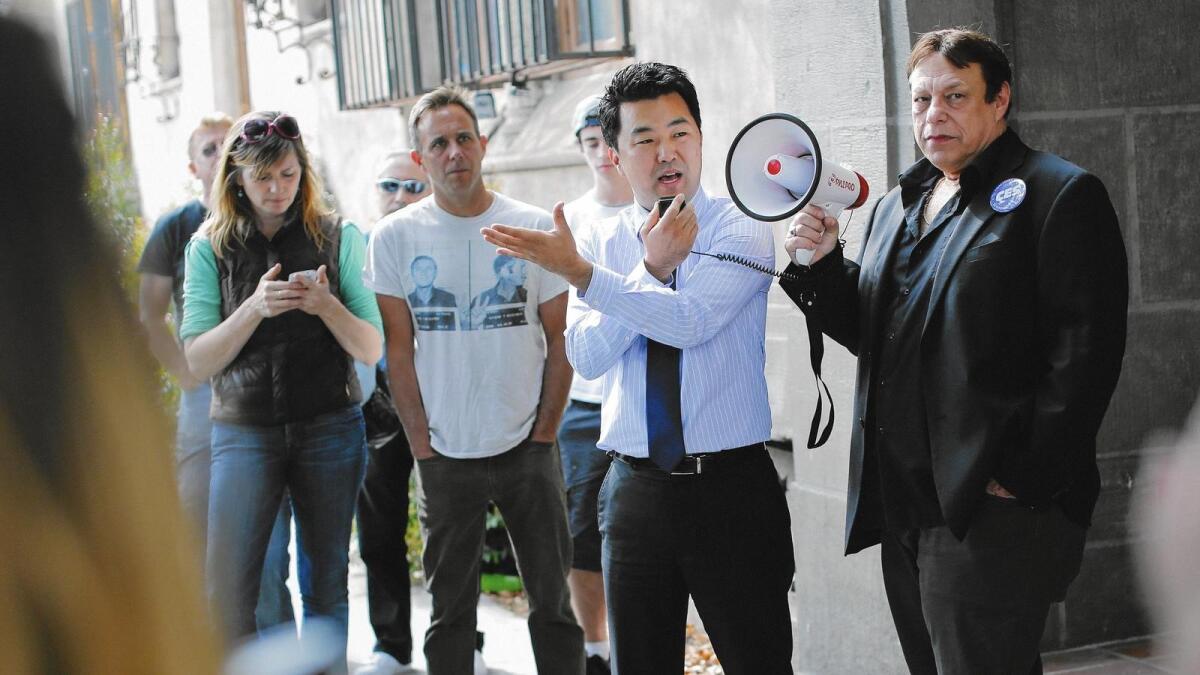
After mulling over a run for the 34th Congressional District over the last week, Los Angeles City Councilman David Ryu says he’s decided not to run.
Ryu said the election of Donald Trump prompted him to “consider how I might best serve.”
“After careful thought, it’s even more clear to me that my heart remains here in Los Angeles, in the neighborhoods and schools where I grew up,” Ryu said in a statement. “We all must defend the values that makes Los Angeles a beacon of hope for so many and fight for a future that lifts up every single Angeleno. For me personally, that means serving the people of the 4th Council District.”
Ryu’s announcement comes two days after former Assembly Speaker John A. Perez announced he was withdrawing from the race because of health issues, scrambling what was already becoming a crowded field.
The 40-year-old councilman is in his first term on the Los Angeles City Council and said last week he was considering a run after Gov. Jerry Brown picked Rep. Xavier Becerra (D-Los Angeles), who currently holds the seat, as state attorney general.
Three other candidates have said they are running for Becerra’s seat so far: state Assemblyman Jimmy Gomez (D-Los Angeles); local activist Wendy Carrillo, a Democrat; and Green Party candidate Kenneth Mejia.
FOR THE RECORD, 9:51 a.m.: An earlier version of this post stated that Ryu was the only Asian American potential candidate. Green Party candidate Kenneth Mejia is Filipino American.
Former Assembly Speaker John A. Pérez decides against running for Rep. Xavier Becerra’s congressional seat
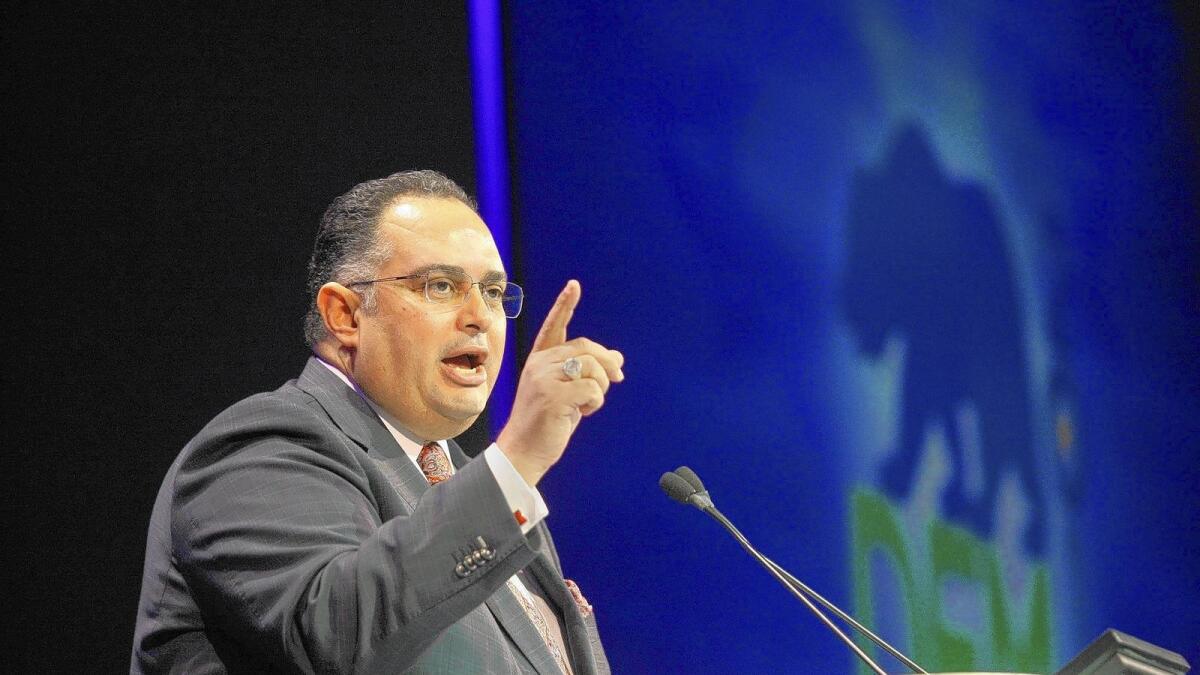
Citing a recent diagnosis of a serious health problem, former California Assembly Speaker John A. Pérez said Saturday he is dropping out of the race to replace U.S. Rep. Xavier Becerra (D-Los Angeles).
“I’ve got to focus on my health right now,” Pérez said in an interview. “But it was a very hard decision.”
The 47-year-old Democrat declined to offer specifics about his condition, citing a desire to keep it private. But he said it was serious enough that it would keep him from waging a vigorous political campaign in 2017.
“The treatment is one that doesn’t lend itself to the intensity of a campaign that the community deserves,” he said.
Pérez, who serves as a University of California regent, was the most high-profile politician who had entered the race. He was also the first to announce his candidacy after Becerra was chosen by Gov. Jerry Brown on Dec. 1 to be California’s next attorney general.
The timing of a special election to fill Becerra’s seat remains unclear, though it would probably take place next spring. The race is likely to attract a number of Los Angeles Democrats, with Assemblyman Jimmy Gomez (D-Echo Park) and activist Wendy Carrillo among those in the mix.
Pérez said it was too soon for him to decide whether to endorse any other candidate in the race to replace Becerra.
“Right now, I want to take a couple of days off,” he said. “I’ve got to get healthy.”
--------------------
FOR THE RECORD
Dec. 10, 2:18 p.m.: An earlier version of this post failed to mention activist Wendy Carrillo as a declared candidate to succeed Rep. Xavier Becerra.
California Politics Podcast: Legislative Democrats say ‘fight’ Trump’s agenda
Few could dispute that the speech given this week by Assembly Speaker Anthony Rendon (D-Paramount) was anything but a political and policy call to arms.
“Californians do not need healing,” Rendon told his chamber during Monday’s swearing-in ceremony. “We need to fight.”
On this week’s California Politics Podcast, we take a look at both the substance and style of the fight that the state’s leading Democrats are ready to wage when it comes to the promises of President-elect Donald Trump.
We also discuss the final result of votes from the Nov. 8 statewide elections, after the last ballots were tallied by elections officials earlier this week.
I’m joined by Anthony York of the Grizzly Bear Project and Marisa Lagos of KQED News.
California’s venerable Field Poll closes its doors after seven decades of surveying voters
The Field Poll, which began placing a finger on the pulse of California’s political debates in 1947, officially shut down operations Friday after its overseas owners decided to cut costs.
“It’s definitely the end of an era,” said Mark DiCamillo, the pollster who has led the organization’s survey efforts since 1992.
The company’s founder and the poll’s namesake, Mervin Field, died in 2015 after a long career sampling the opinions and preferences of Californians. Originally called the California Poll, the political surveying operation was designed less as a money-making effort than a way to boost the reputation of the company’s research expertise.
Field sold the company to a European advertising agency some two decades ago. DiCamillo said the current owners, Havas Worldwide, made the final decision a few weeks ago to close the tiny San Francisco polling operation.
Along with polls conducted by The Times and later by the nonpartisan Public Policy Institute of California, the Field Research Corp. sampled viewpoints on ballot measures and statewide candidates alike. Few polls could offer as long of a reach back into California’s boom times of the 20th century as could Field, with online archives dating back to 1956.
DiCamillo said Friday that about a dozen staffers would lose jobs early in the new year and that he was unsure what he would do next.
“The corporate world can be hard and cold,” he said. “I feel very fortunate to have had this role all these years.”
California police officers will soon begin gathering data on the race of those they stop
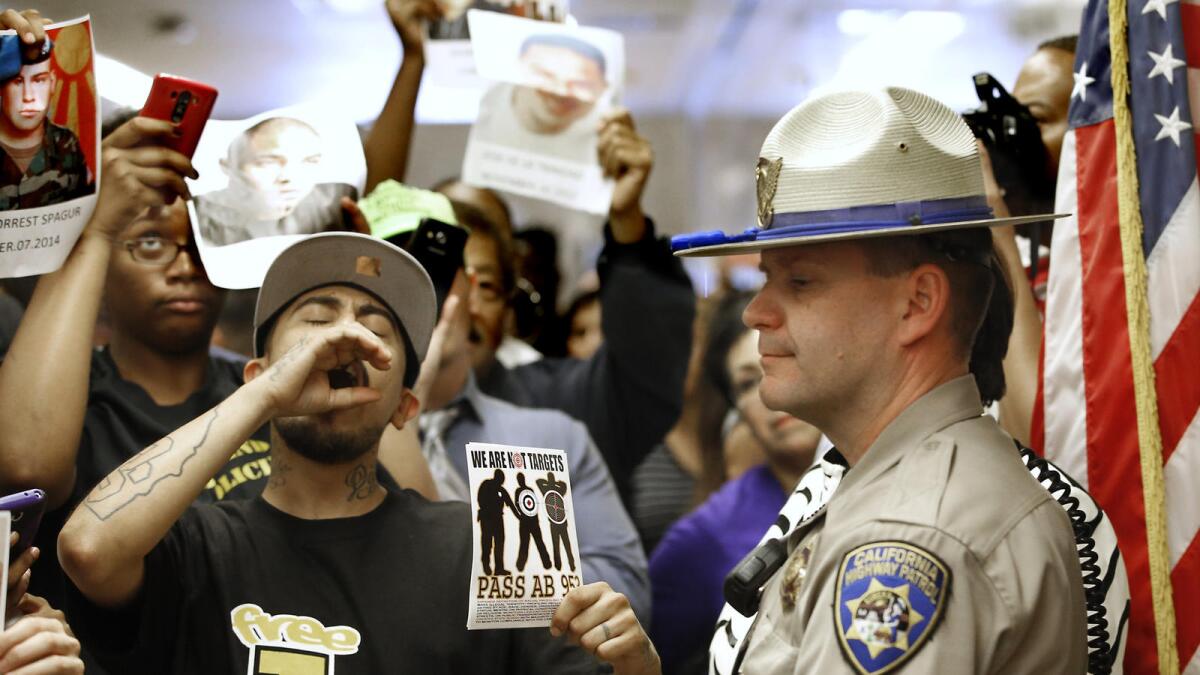
Police officers in California will soon track the race of those they pull over for traffic stops or encounter in the street, according to proposed guidelines released Friday by Atty. Gen. Kamala Harris.
The new rules, established by the passage of Assembly Bill 953 in 2015, are designed to help understand biases in policing efforts across the state.
“Racial and identity profiling weaken public trust and have debilitating effects on communities,” Harris said in a statement. “These regulations and data will help law enforcement improve policing practices and strengthen accountability.”
Aside from demographic information on race, gender and age of the person stopped, officers will have to record and collect the location, duration and reason for each stop under the proposed regulations. Officers also will be required to document the actions they take and the result of the encounter. The attorney general’s office will make the data public by each law enforcement agency through its criminal justice data website, OpenJustice.
Harris’ office is accepting comments on the proposed regulations through Jan. 27.
The state’s largest police departments, those with 1,000 or more peace officers, will begin collecting the data in 2018 and smaller departments have until 2022 to implement the program.
Water fight: Sen. Barbara Boxer giving up on filibuster attempt
Sen. Barbara Boxer is ending her plans to filibuster a water infrastructure bill on the Senate floor.
“I’ve done it, so I’m happy,” Boxer told The Times after voicing her objections to the newly added California provisions of the bill for about 90 minutes Friday. “I’ve made my point and I’ve spoken enough.”
A group of California House members joined with Sen. Dianne Feinstein (D-Calif.) on Monday to add language that would authorize the pumping of more water from the Sacramento-San Joaquin River Delta to a water infrastructure bill co-written by Boxer.
Saying the new language opens the door to changing the Endangered Species Act, Boxer has spent the last few days trying to persuade colleagues to kill the entire bill, which authorizes hundreds of water projects across the country, including more than two dozen in California alone. The retiring senator had vowed to do everything in her power to stop the bill, but after the House voted, 360-61, Thursday evening to pass it, she says she is now being realistic.
“My hope is to reason with people and tell them why to kill it, but given the House vote it looks like the underlying bill is so good. … it’s a very uphill battle,” Boxer said. “I’m a realist, I’ve been here a long time.”
The Senate is expected to call the bill up for a vote at some point Friday, at which time Boxer or another senator could still object and have up to 30 hours to hold the floor. The House already has recessed for the year, and senators are raring to go home as well.
Water fight: Sen. Barbara Boxer takes to the Senate floor
Sen. Barbara Boxer (D-Calif.) is talking on the Senate floor now about her water infrastructure bill and her objections to the California water policy that was added early in the week by Sen. Dianne Feinstein (D-Calif.), Rep. Kevin McCarthy (R-Bakersfield) and a group of California members.
Boxer has signaled that before the Senate leaves, she plans to filibuster the bill, which she says changes the Endangered Species Act. It passed the House, 360-61.
This may just be the opening salvo of what Boxer has planned. Most of the Senate is focused on resolving a separate fight to avoid a government shutdown by this evening.
We’re tracking it live. Follow along on Twitter.
All signs point to former L.A. City Council aide jumping into race to replace Rep. Xavier Becerra
The field is already getting crowded in the race to replace Rep. Xavier Becerra (D-Los Angeles) in Congress as he awaits confirmation as California’s next attorney general — and the special election has yet to be called.
The next likely candidate to jump into the fray is Sara Hernandez, a former aide to L.A. Councilman Jose Huizar.
Huizar announced earlier this week that he would not run for the seat.
Hernandez, who now runs public affairs training institute Coro Southern California, has yet to announce publicly that she is running.
But she filed papers with the Federal Election Commission on Thursday for a campaign committee, and a website, sarahernandezforcongress.com, has been registered for her by a political consulting firm.
Fundraising pages for Hernandez on ActBlue and CrowdPAC are also active. The CrowdPAC fundraising page showed earlier this week that Hernandez had raised more than $20,000 in pledges.
California’s ballots have all been counted — more than 14.6 million and most of them for Hillary Clinton
California elections officials completed their work tallying votes from the Nov. 8 election on Wednesday, submitting a final report of more than 14.6 million ballots cast in races from president to seats in Congress and the state Legislature.
Hillary Clinton, whose presidential bid came up short in the electoral college, handily beat President-elect Donald Trump in California by more than 4.2 million votes — almost double the number of ballots cast for Trump, helping boost her lead in the national popular vote.
Secretary of State Alex Padilla must certify the presidential vote by the end of this week and fully certify the election results next week.
Voter turnout in California, in the final unofficial returns, was higher than it was in the presidential election four years ago: 75.3% of registered voters cast a ballot last month, compared with 72.36% casting a ballot in 2012.
The closest statewide race was for Proposition 53, the effort to require future statewide elections for revenue bonds of $2 billion or larger.
Fought by Gov. Jerry Brown and business groups, Proposition 53 lost in unofficial results by just 151,646 votes out of more than 13 million cast on the measure.
With a majority of voters casting ballots by mail or dropping absentee ballots off on election day, election results now frequently take weeks to complete. A handful of the state’s 58 counties reported their votes Wednesday afternoon, almost one month after voters went to the polls.
Gov. Jerry Brown’s top aide takes aim at Trump’s pick for the EPA
Led by Californians, Democrats push back against the White House as they seek presidential pardons for ‘Dreamers’
Led by members of California’s delegation, dozens of House Democrats are again pleading with President Obama to pardon hundreds of thousands of immigrants brought to the U.S. illegally as children to whom he granted temporary deportation deferrals.
Last month, several members of Congress asked Obama to use his pardon authority to forgive the past and future civil immigration offenses of the nearly 750,000 people granted deportation deferrals under the Deferred Action for Childhood Arrivals, or DACA, program.
The lawmakers say that even though the so-called Dreamers would be left in legal limbo without work permits or visas, they could more easily apply for legal status from within the U.S. without immigration offenses on their records.
A White House official immediately batted down the idea, saying a pardon wouldn’t give them legal status.
In a news conference Wednesday, the lawmakers disputed that position, emotion filling their voices.
“Our request is very narrow in scope, we are simply asking him to protect these young DACA individuals who have committed no crime and who no fault of their own were brought to the United States with their families in search of a better life,” Rep. Lucille Roybal-Allard (D-Downey) said. “Their immigration status under DACA must be protected, and a presidential pardon would do just that.”
California considers prohibiting immigration enforcement at public schools and hospitals
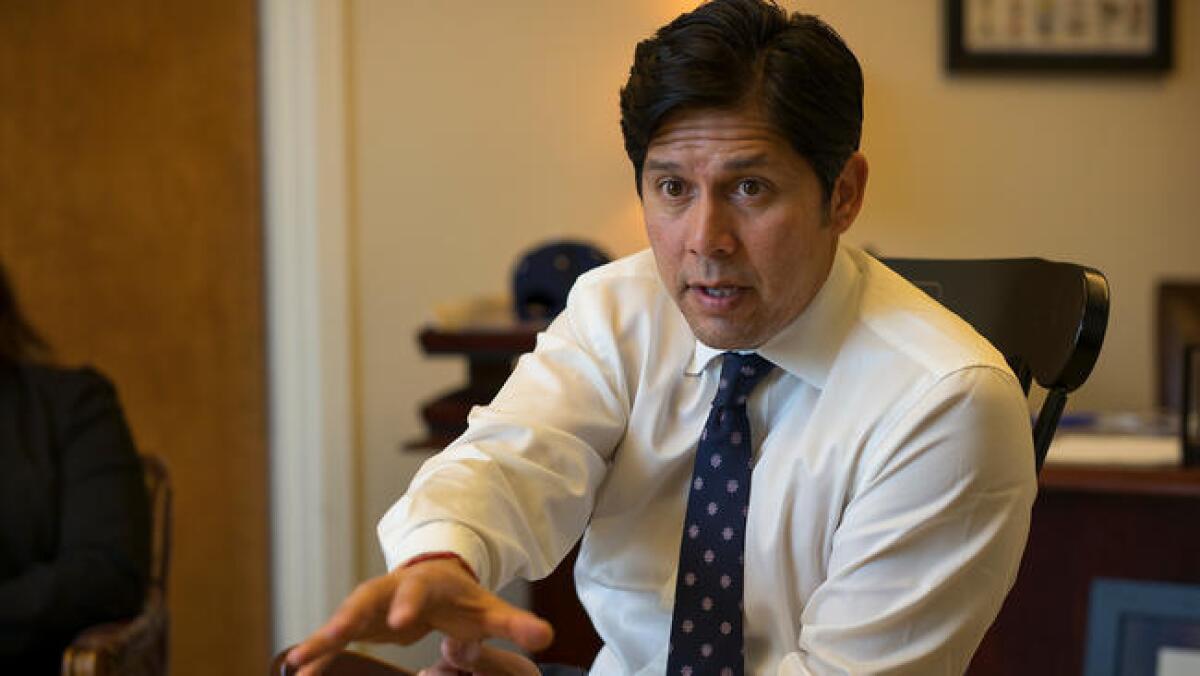
California would create “safe zones” prohibiting immigration enforcement on public schools, hospital and courthouse grounds under a new bill by state Senate leader Kevin de León (D-Los Angeles) that is sure to clash with the tough enforcement plans of President-elect Donald Trump.
By also proposing to bar state and local law enforcement from enforcing immigration laws, De León is doubling down on the issue at a time when Trump has threatened to withhold federal funding from “sanctuary cities” that refuse to help federal Immigration and Customs Enforcement agents.
“To the millions of undocumented residents pursuing and contributing to the California Dream, the state of California will be your wall of justice should the incoming administration adopt an inhumane and over-reaching mass-deportation policy,” De León said in a statement Wednesday.
In seeking to establishing “safe zones” for immigrants in the country illegally, SB 54 would require California schools, hospitals and courthouses to adopt policies that limit immigration enforcement on their premises to the fullest extent possible consistent with federal and state law.
Robin Hviston, who heads a group seeking tougher enforcement of immigration laws, said ICE agents are not going into schools and hospitals, and that Trump is focusing on deporting criminal immigrants, not students and patients.
“This is hysteria, whipping the community up with needless fear,” said Hviston, executive director of the Claremont-based group, We the People Rising.
In addition, Hviston said the state cannot stop federal agents from enforcing immigration law on specific properties.
“Federal law trumps state law,” she said.
Senate Republican leader Jean Fuller (R-Bakersfield) said the legislation would be reviewed to make sure there are no “unintended consequences” that could jeopardize public safety.
“Passions are still high after the last election, and I hope we can all agree to take a deep breath and avoid a rush to introduce legislation like this,” she said in a statement. “We need to support our law enforcement and make sure that the legislature is not passing bills that would limit their ability to keep all Californians safe.”
The provision barring the use of local law enforcement for immigration enforcement would not prevent agencies from complying with a judicial warrant to transfer violent offenders into federal custody for immigration enforcement purposes, De León said.
“We will not stand by and let the federal government use our state and local agencies to separate mothers from their children,” De León added.
Updated at 1:10 pm to include comments from Robin Hviston.
Updated at 5:30 pm to include comments by Sen. Jean Fuller.
Santa Barbara Rep. Lois Capps says goodbye in final House speech
Rep. Lois Capps (D-Santa Barbara) looked back on her 10 terms representing California’s Central Coast in a final House speech Wednesday.
“Thank you, thank you truly to the people of the Central Coast for trusting me as your representative, for inspiring me every single day with your passion and your dedication for our nation and for California’s 24th District,” she said.
Capps first won the seat in a 1998 special election after her husband, Rep. Walter Capps, died early in his first term. The former school nurse has long been known as an advocate for healthcare and pipeline safety.
She will be replaced by Salud Carbajal (D-Santa Barbara).
Watch the full speech:
Watch: California’s Barbara Boxer gives farewell Senate speech
Sen. Barbara Boxer (D-Calif.) made her farewell speech on the Senate floor Wednesday morning, marking her 24 years in Washington.
She reflected on her accomplishments and heartbreaks, talking about her work on the environment and Hillary Clinton’s loss in the presidential contest, and thanked the many who have helped her along the way, including her California partner of more than two decades, Sen. Dianne Feinstein.
Feinstein wasn’t in the chamber for Boxer’s speech. Her staff said the busy final week before Congress leaves kept her from attending.
Boxer also paid tribute to Anita Hill, saying, “Without her I never would have been elected to the Senate.” (More on that story here.)
Behind Boxer in the chamber, more than a dozen California House members lined the wall, including Minority Leader Nancy Pelosi (D-San Francisco), who wiped away a tear when the retiring senator hugged her after the speech. Dozens of family and staff watched from the gallery.
Toward the end of her nearly half-hour speech, Boxer’s voice broke as she read a letter from Jazz legend Sonny Rollins, in which he thanked her for making a “beautiful life” for people through her work.
“Because of the people of California who sent me here time and time again, 10 years at the House, 24 to the Senate, I had the opportunity to never stop trying,” Boxer said. “I had the opportunity to speak out. No matter how many times I had to try, I did.”
Senators all morning will spend time recognizing Boxer, others retiring from the chamber and Vice President Joe Biden, who represented Delaware in the Senate from 1973 to 2009 and is president of the Senate.
Lawmakers reintroduce legislation to spend billions on low-income housing subsidies
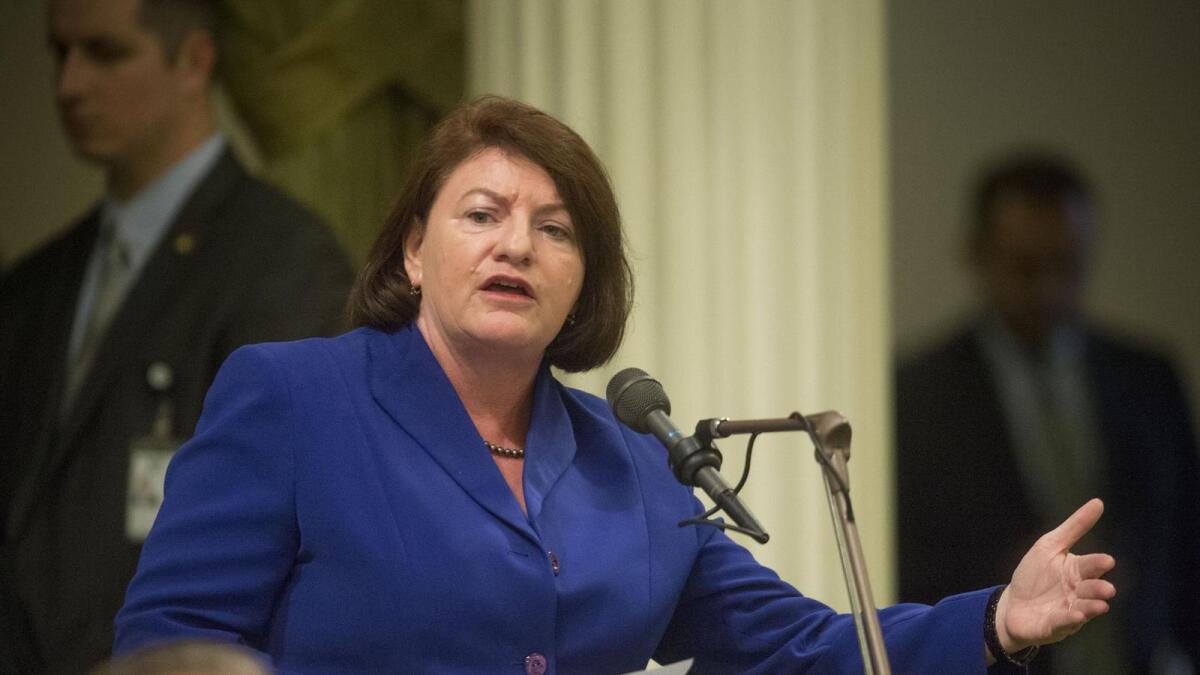
After failing to pass new funding to tackle the state’s housing affordability crisis last session, two state senators are trying again.
Sen. Toni Atkins (D-San Diego) and Sen. Jim Beall (D-San Jose) have re-introduced legislation to add a $75 fee to real estate transactions, which is expected to generate hundreds of millions a year for low-income housing construction, and place a $3-billion bond to finance low-income housing before voters in 2018, respectively.
Both bills were unveiled as part of Senate Democrats’ package of new spending plans to finance improvements in housing, transportation, water and parks infrastructure.
“Now is the time to rebuild the critical infrastructure that keeps our state moving and growing,” Senate President Pro Tem Kevin de León (D-Los Angeles) said in a statement. “Our families and businesses depend on affordable housing, safe and reliable roads and transportation options, and access to clean drinking water and healthy open spaces.”
Neither Atkins’ nor Beall’s bill passed last year. But Democrats now have a two-thirds supermajority in the Legislature, a margin that both bills require because they’re revenue measures.
California’s median home value of $479,600 is more than two and a half times the national average and rising.
Last year, the state’s major housing affordability efforts stalled. Lawmakers rejected a plan from Gov. Jerry Brown to streamline local approval for housing projects as a way to rein in costs. In turn, Brown held back $400 million in low-income housing subsidies he had agreed to spend had the Legislature acted on his proposal.
Major labor and environmental groups helped torpedo the governor’s effort, citing concerns about construction worker wages and sidestepping environmental laws. The same coalition told lawmakers this week they would support streamlining local approval for projects solely reserved for low-income residents among a host of other policies that aim to boost low-income housing development.
Gov. Jerry Brown says Trump risks international backlash if he doesn’t address climate change
Gov. Jerry Brown predicted Tuesday that President-elect Donald Trump will experience a political backlash internationally if he pursues policies that deny the impact of climate change.
Appearing in a webcast for the Climate Reality Project, Brown was asked by former Vice President Al Gore whether states can have an impact on climate change if it is no longer a priority of the federal government.
Brown noted that, in addition to legislation in California, he has signed agreements with other states to pursue policies to address global warming. But he said there are indications Trump may delay action if he is not convinced it is a serious problem.
“If our new president takes that as his proposition, I believe that the reaction will be negative and very powerful throughout the world,” Brown said. “I don’t think, given the science and given the rising concern, that that is a sustainable political trajectory, even for the president of the United States.”
Gore said Brown has been “forward-leaning and bold” and has provided “national leadership” on climate change.
The former vice president met with Trump on Monday in New York City, but declined afterward to discuss details of their conversation.
Brown said more and more people are coming to the conclusion that climate change is a real problem.
“The science is clear and the peril is dire,” Brown said. “Based on that, people are willing to act.”
As supermajority-boosted state Democrats challenge Trump, what’s a California Republican to do?
State Republicans in California have watched their base shrink, their seats in Congress dwindle and their national party fissure amid the election of Donald Trump and his new vision for the GOP.
But most in the newly elected freshman class of state Republican lawmakers say they are unfazed by what’s happening in Washington: They want to keep the focus on the issues critical to their local districts.
“The policy coming from D.C. will impact us,” said former Irvine Mayor Steven Choi, who won the 68th Assembly District seat representing Orange County. “But the California Legislature will have its own agenda. How much you can fight or work with them is a totally different game.”
Next year’s legislative session is already off to a rancorous start as state Democratic leaders and lawmakers on Monday set a combative tone against Trump, filing a slew of bills on immigration, and urging the president-elect to abandon threats of mass deportation.
But the list of priorities for newly elected Republicans remains largely unchanged from previous years. Lawmakers said they hope to remove burdensome regulations on small businesses, find common ground between employers and employees and address a shrinking water supply.
Some were cautiously optimistic that a Trump administration could further their causes. And although their views on the president-elect are mixed, they said his message struck a chord with the economic frustrations of middle-class families in their districts.
Republican Assemblyman Vince Fong, who supported Trump in the primary and general election, described the new administration as “a fresh start” to address the concerns of people in his district, though the values of his party remained the same in the state.
“We are the party who fights for hardworking families and small businesses,” said Fong, whose Assembly district encompasses most of Kern County. “We are the party of personal initiative and personal freedom, and I believe that is what the Republican party represents.”
To Republican Heath Flora, who claimed the District 12 State Assembly seat centered in Modesto, it is an “exciting time for young Republicans” to re-brand themselves as a party.
“Donald Trump is a lot of different things, and as a Republican we are going to work with the administration,” Flora said. “But we need to make sure that we fight for California first.”
Charter bus riders who choose not to buckle up could be fined under new proposal
Two months after a bus accident in Desert Hot Springs killed 13 people, a state lawmaker is proposing to require passengers on charter buses equipped with seat belts to use them.
The USA Holiday charter that plowed into a big rig did not have seat belts for passengers, but a new rule that took effect last month requires the restraint devices on newly manufactured buses.
With that new rule in mind, state Sen. Jerry Hill (D-San Mateo) has introduced State Bill 20, which would require drivers of charter buses to tell passengers before each trip that they are required to wear seatbelts. Signs would also have to be posted on the requirement.
Passengers who do not buckle up would face a fine of $20 for the first offense and $50 for all subsequent offenses — consistent with the law for seatbelts in cars, Hill said.
He said Tuesday many people in cars would not wear seatbelts without potential fines, so the same concern applies to bus riders.
“Without a mandate to wear a seatbelt, the seatbelt is useless in protecting someone,” Hill said. “When you look at the number of lives that have been lost in California and the injuries, this could prevent a lot of deaths.”
The National Highway Safety Transportation Administration has reported that traffic accident fatalities can be reduced by as much as 44% when seat belts are used.
“We need to do what we can to make sure passengers stay in their seats and don’t fly through the window,” Hill said.
Kenneth Mejia, a 26-year-old self-proclaimed ‘Berniecrat,’ joins the fray in 34th Congressional District
Attacks on police officers would be classified as hate crimes under California bill

Alarmed by a wave of shootings targeting police officers, state Assemblyman Jay Obernolte (R-Big Bear) has introduced a bill that would make an attack on law enforcement a hate crime in California, allowing stiffer penalties for those convicted.
Obernolte’s bill comes after a series of shootings that have left 62 law enforcement officers dead so far this year, according to the National Law Enforcement Officers Memorial Fund. That is up from 38 officers shot to death in the line of duty by this time last year.
Just in July, five police officers were killed by a gunman in Dallas, and three more died in a rampage in Baton Rouge, La. The shootings occurred at a time of high tension between law enforcement and some communities over police killings of unarmed people of color.
“Our police officers put their lives on the line every day and it’s deeply disturbing when they are intentionally targeted because of their chosen profession,” Obernolte said Tuesday in a statement. “This law will send a message to criminals targeting law enforcement officers that their reprehensible behavior will not be tolerated.”
Offenses committed because of the victim’s race, religion, disability or sexual orientation may currently be prosecuted as hate crimes in California.
Conviction of a hate crime can result in an additional one to three years in state prison being tacked on to an offender’s sentence, depending on the circumstances.
Earlier this year, Louisiana adopted a measure, dubbed the Blue Lives Matter bill, making attacks on police officers a hate crime, and similar proposals are being considered in Texas, New Jersey and Mississippi, as well as in the U.S. Congress, which can change the federal hate crime law.
Some groups, including the American Civil Liberties Union, have voiced concerns that such laws could dilute the original intent of hate crime measures to protect vulnerable classes of citizens.
There are already sufficient strong penalties available for those who attack police officers, said Kevin Baker, legislative director with the ACLU of California’s Center for Advocacy and Policy.
“Our hate crime statute is simply not the proper home for these offenses,” Baker added. “Peace officer status is an employment category not analogous to the personal characteristics included in our hate crime statute, including disability, gender, nationality, race or ethnicity, religion, and sexual orientation.”
Updated at 1:20 pm to include comment from ACLU official.
White House is leery of Sen. Dianne Feinstein’s California water plan
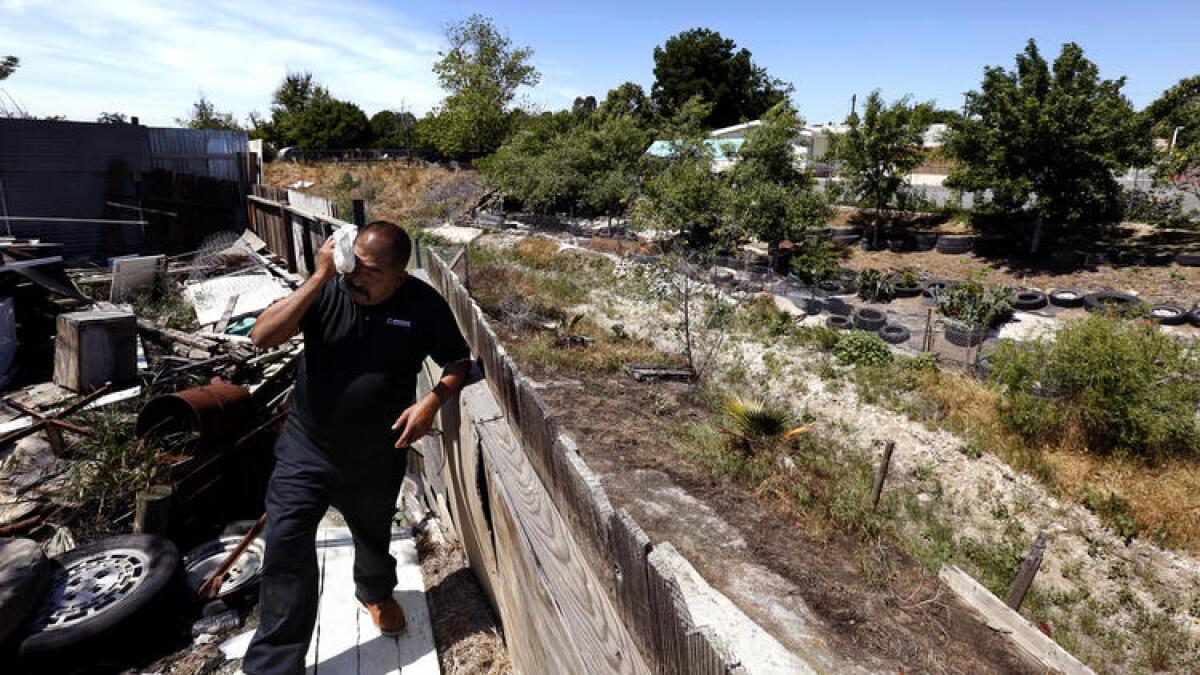
White House spokesman Josh Earnest said Tuesday that the Obama administration was still reviewing the California water policy included in the proposed Water Resources Development Act on Monday by California’s senior senator and Republican members of the state’s congressional delegation.
“Based on what we know so far, we don’t support the kinds of proposals that have been put forward to address some of the water resources issues in California right now,” Earnest told reporters Tuesday. “So we don’t support that measure that’s been put forward, but we’ll take a look at the bill in its totality. And there’s more of those — more proposals that are included in the bill that we need to review.”
California’s House Republicans and Sen. Dianne Feinstein (D-Calif.) agreed Monday to insert a 90-page proposal to increase water deliveries to San Joaquin Valley farmers and Southern California and build long-term water infrastructure into a bill written by Sen. Barbara Boxer (D-Calif.) that includes a host of water infrastructure projects across the U.S.
Boxer herself is vehemently opposed to the added proposal, which she says would open the door to changing the Endangered Species Act because it modifies the environmental restrictions that have at times limited water deliveries from the Sacramento-San Joaquin Delta to the San Joaquin Valley and Southern California.
The Water Resources Development Act is among a handful of bills the House and Senate hope to pass before they are scheduled to recess Friday, and Boxer has vowed to slow or halt all legislation in the Senate until the California proposal is removed.
Feinstein said making the change now would capture increased flow during the rainy season, and would preempt Republicans from making changes when Democrats may have less leverage to negotiate under President-elect Donald Trump. The included language largely mirrors legislation she proposed as a compromise to address agricultural water needs, drinking water needs in the south and protecting flow in the delta needed to maintain the salmon population.
Rep. David Valadao (R-Hanford), whose Central Valley district is one of the hardest hit by water shortages, praised the proposal as providing “interim relief, which my constituents desperately need.”
Earnest emphasized that Republicans shouldn’t use the disagreement within the California delegation as a reason to kill the bill, which includes funding for Lake Tahoe, the Salton Sea, the Los Angeles River and a long-negotiated deal for resources to address the ongoing lead contamination of the water supply in Flint, Mich.
“We’re nearing the end of the first week in December. And we know that plenty of Republicans are hoping to get out of town and begin their holiday celebrations at the end of this week,” he said. “They should not do so until they have fulfilled their promise to the people of Flint who are waiting for the United States Congress to actually do something to address the difficult situation that they’re facing there.”
State lawmakers may tell California pension funds to divest from Dakota pipeline companies
California lawmakers will consider a proposal next year to block the state’s pension funds from investing in a controversial oil pipeline that is planned to cross North Dakota’s Standing Rock Sioux Reservation.
The proposal, Assembly Bill 20 by Assemblyman Ash Kalra (D-San Jose), would require California’s two public employee pension funds to divest any holdings in companies involved in the Dakota Access pipeline. The project, designed to carry some 30,000 barrels of oil a day from North Dakota oil fields to Illinois, has been the focus of large protests from Native American tribes, environmental and civil rights activists and veterans. On Sunday, the U.S. Army Corps of Engineers refused to approve a permit needed to complete the project.
Kalra said he traveled to the North Dakota reservation after winning the Nov. 8 election, to see the protests and the project up close.
“I think what’s happening there is really part of a greater movement,” he said in a phone interview. “And the greater movement is to move away from our continued investment into fossil fuels.”
The bill introduced at the state Capitol on the first day of the Legislature’s new session would give the two pension funds — the California Public Employees Retirement System and the California State Teachers Retirement System — until 2018 to make any changes needed to their multibillion-dollar investment portfolios.
A CalPERS spokesman confirmed Monday that the fund owns about 1.1 million shares of Energy Transfer Partners, the company involved in the pipeline project. Representatives of the teachers’ fund, CalSTRS, didn’t immediately reply to a request for comment.
Lawmakers have imposed rules on pension investments in the past, from bans involving companies that do business in Sudan and Iran to those producing thermal coal.
“As Californians, we must hold ourselves to a high standard line of conduct, including how we invest our pension funds,” says the language of Kalra’s bill.
Update 3:07 p.m. This story was updated with additional information on CalPERS’ stock holdings and comments from Assemblyman Kalra.
This story was originally published at 12:07 p.m.
Legislators hope to shine a light on elected officials’ wealth and who pays for robo-calls with new transparency bills
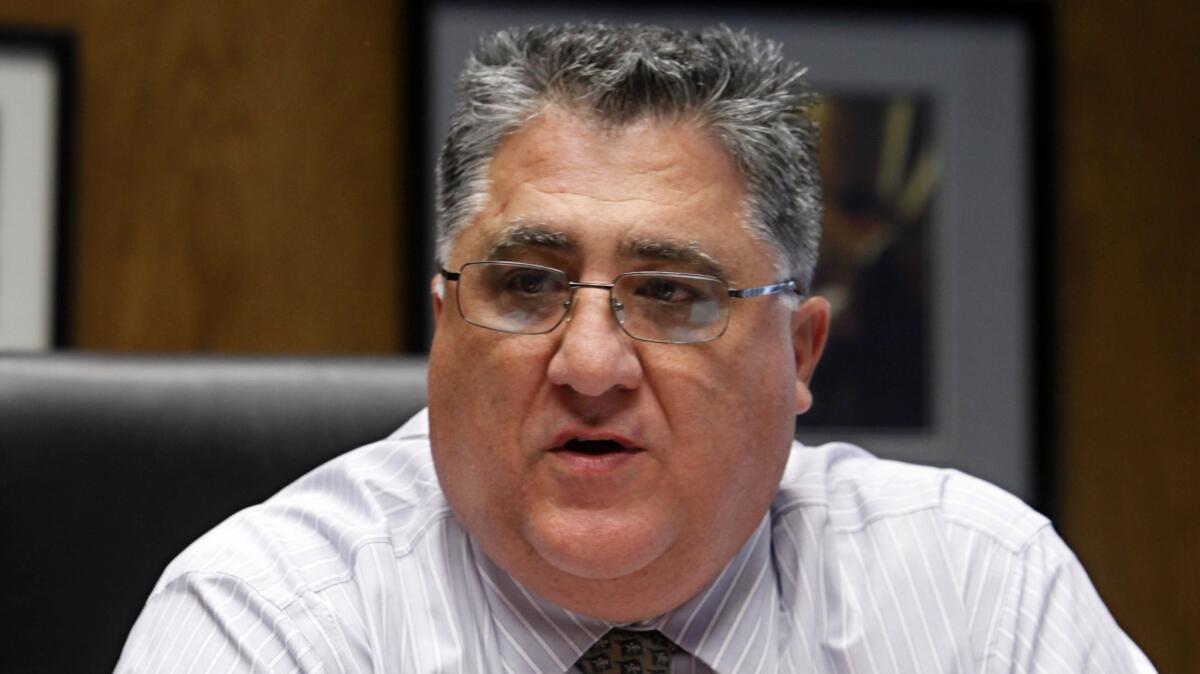
State elected officials would have to disclose more details about their wealth and investments to the public under a bill reintroduced this week by newly elected state Sen. Anthony Portantino (D-La Cañada Flintridge).
Currently, elected officials must check a box disclosing the value of their investments and income in broad ranges that include between $2,000 and $10,000, between $10,000 and $100,000, between $100,000 and $1 million and more than $1 million.
For example, the latter category’s box could be checked both by someone with an investment worth $1.1 million and by someone with an investment worth $15 million, so the public does not get a clear picture of the interest.
Portantino’s bill, SB 24, would expand the categories to eight to also include whether the value of the investment is worth between $1 million and $5 million, between $5 million and $10 million and more than $10 million.
A similar bill by Portantino when he was a member of the state Assembly was vetoed in 2012 by Gov. Jerry Brown.
“The law already requires public officials to disclose their income and investments with enough particularity so that conflicts of interest can be identified,” Brown wrote in his veto message. “I am not convinced that this bill will provide more useful information to the public.”
With numerous news reports about possible conflicts of interest involving President-elect Donald Trump and his appointees, Portantino, who was elected last month, said he hopes his new bill will be seen as more timely this year.
“Looking at Washington, it is clear that it can be hard to get elected leaders to recognize the importance of transparency,” Portantino said in a statement. “I hope that with all the recent focus on conflict of interest, now is the time for California to lead by example and embrace greater disclosure.”
The bill is one of a trio of measures introduced this week to regulate elected officials and candidates.
Another measure, AB 14 by Assemblyman Jimmy Gomez (D-Echo Park), would require candidates and political committees to disclose in campaign phone calls who is paying for the call.
A third bill, SB 45 by Sen. Tony Mendoza (D-Artesia), would ban mass mailing at taxpayer expense within 90 days of an election by or on behalf of a candidate whose name will appear on the ballot.
California bill aims to help National Guard veterans forced to pay back enlistment bonuses
A state senator has introduced legislation meant to aid thousands of California National Guard veterans who were ordered to repay large enlistment bonuses used to entice them to go to war in Iraq and Afghanistan.
SB 14, filed by Sen. Ted Gaines (R-El Dorado), would create a grant program to repay service members who paid taxes on an enlistment bonus awarded on or after Jan. 1, 2004, and before Jan. 1, 2011.
The bill would require the Franchise Tax Board to create an application for people to apply to the program and would provide grants in the amount equal to the personal income taxes that veterans paid on their bonuses. The appropriations would come from the state’s general fund.
The legislation, which would require a two-thirds majority vote, would go into effect immediately as an urgency statute.
Gaines filed the proposal in response to Los Angeles Times reporting that nearly 10,000 soldiers were ordered to repay large enlistment bonuses — and slapped with interest charges, wage garnishments and tax liens if they refused — after audits revealed extensive overpayments by the California Guard at the peak of the wars last decade.
Many had served multiple combat tours, and although the U.S. Department of Defense suspended efforts to claw back enlistment bonuses, some veterans have already paid back some or all of their bonuses.
Former Assembly speaker nabs endorsement from Lt. Gov. Gavin Newsom in race to replace Becerra
EBay faces fines from state ethics watchdog after failing to disclose Sacramento lobbying on time

Online retailer EBay has agreed to pay $6,500 in fines to the state’s campaign finance watchdog agency for failing to properly disclose its lobbying of the state Capitol and political contributions it made to candidates, according to newly released documents.
The state Fair Political Practices Commission will consider the fines at its Dec.15 meeting.
Violations included filing two lobbying disclosure reports 299 and 207 days late, respectively, which investigators said delayed the public’s learning that the company had spent $42,000 to influence public officials.
About $27,000 in campaign contributions also were disclosed in the late filings. The disclosures show that EBay lobbied members of the state Legislature on 10 bills during the first half of 2015, including a measure requiring firms to improve security to protect customers’ geo-location information and tax identification numbers.
The reports do not require lobbying firms to disclose which legislators they lobbied.
EBay representatives told investigators the failure to file the electronic reports on time was “inadvertent” and caused by a transfer of responsibility for filing during a “corporate transition.”
The firm also was late in filing statements required of major donors that disclose their contributions.
The FPPC report said delayed filing violates a central tenet of the state disclosure laws: “that the activities of lobbyists should be regulated and their finances disclosed in order that improper influences will not be directed at public officials.”
In recommending fines under the $20,000 maximum, the investigators said EBay does not have a prior history of violations and cooperated with the investigation.
Gov. Jerry Brown and helpers light the state Capitol Christmas tree
Proposal to allow roadside testing for marijuana use is revived
A month after Californians legalized recreational marijuana use, Assemblyman Tom Lackey (R-Palmdale) introduced a bill Monday that would allow law enforcement to use roadside drug testing devices to check for driving under the influence.
A former sergeant with the California Highway Patrol, Lackey said his proposal takes on new urgency because of the passage of Proposition 64 on Nov. 8.
“The ballot initiative passed this year to legalize marijuana will result in more marijuana consumers on our state’s highways and roads,” Lackey said in a statement. “It is imperative that we invest in a broad spectrum of technologies and research to best identify marijuana-impaired drivers.”
The CHP is separately studying ways to identify drug-impaired drivers. A similar bill last year did not make it to the governor’s desk amid concerns that field testing devices are not dependable.
Lackey’s bill would allow tests using saliva samples taken from drivers suspected of being impaired. He said the test quickly informs officers whether the driver tested positive for several classifications of drugs including marijuana.
The measure is supported by Chief Ken Corney, president of the California Police Chiefs Assn.
“Our federal partners have demonstrated the efficacy of oral fluid testing, and we look forward to utilizing the technology at a state level,” Corney said in a statement.
California lawmakers prepare to take a stand on immigration against the federal government
After heated debates in both chambers, California state lawmakers on Monday said they were prepared to stand up to an incoming federal administration that threatened the state’s progressive work to incorporate the immigrant community into society.
“We are here because the president-elect said immigration would be one of his first targets,” Assembly Speaker Anthony Rendon said. “There is still a lot of uncertainty about what the administration will actually do. But again, we have all heard the insults, and we have all heard the lies. We have also all heard the threats.”
Lawmakers said they wanted to remind Congress of immigrants’ contribution to the economy through a number of resolutions and bills filed on Day One of the legislative session. And they sought to send the message that the state does not approve of bigoted rhetoric, mass deportation or expedited removal from the country without due process.
A pair of resolutions stating elected officials’ support for a comprehensive and workable approach to fixing the nation’s historically broken immigration system passed both the state House and Senate. But they sparked testy exchanges among lawmakers over whether the state was acting too soon.
Two more bills aim to bolster the legal representation of immigrants who are in the country illegally and face the threat of deportation. Lawmakers said it was premature to talk cost estimates but gave a range of anywhere from $10 million to $80 million to implement both proposals.
The most sweeping proposal would use state government grants to fund attorneys for immigrants through a public defender model. Attorneys would be appointed by judges, lawmakers said.
Rendon said he was not concerned about hurting the state’s relationship with the federal government. “President-elect [Donald] Trump had made his stances clear,” he said.
Senate President Pro Tem Kevin De León said leaders were looking to work with federal officials and find common ground.
“We are not looking for a fight,” he said. But as “elected officials of the most diverse state, the greatest mosaic of hues on this planet, it is our moral responsibility, it is our political responsibility to protect the most vulnerable of this state.”
Under proposed legislation, Californians could search a database for the names of those convicted of hate crimes
Californians could search a state government database for the names of those convicted of hate crimes under a proposed state law inspired by incidents reported since the Nov. 8 election, its author said.
The bill by Assemblyman Raul Bocanegra (D-Pacoima) would require the state Department of Justice to create a public database of felons convicted of hate crimes related to race, religion and sexual orientation.
Local law enforcement officials have reported a recent rise in reported hate crime incidents. Existing state law require local and state law enforcement officials to compile hate crime information, and reported a 10.4% statewide increase in those incidents last year.
But that data is for statistical purposes, while the proposed law would create a database designed for Californians to search. It would not, Bocanegra said in a written statement, include any information on the victims of those hate crimes.
Wendy Carrillo, whose mother brought her to the country from El Salvador illegally, enters race for Becerra seat
A civic and labor activist and journalist who had been in the country illegally is joining the race for the 34th Congressional District.
Wendy Carrillo, 36, a Democrat from Boyle Heights, announced her plans to run in a post on Medium Monday.
Carrillo said in the post her parents brought her to the United States from El Salvador as a child. After learning she was not legally in the United States at age 13, Carrillo became a U.S. citizen before her 21st birthday. (Article 1 of the Constitution requires a person be a U.S. citizen for seven years to run for Congress.)
“I was fortunate while so many others haven’t been. I take that blessing very seriously,” she wrote. “Before my 21st birthday, I became a citizen and for a few years I was the only voting member in a family of seven.”
Raised in City Terrace, Carrillo attended El Sereno Middle School, Roosevelt High School in Boyle Heights, East Los Angeles College and received a bachelor’s degree at Cal State Los Angeles and a master’s degree at USC. She was the host of “Knowledge Is Power” on Power 106-FM.
Rep. Xavier Becerra (D-Los Angeles) is planning to vacate the seat after being officially nominated as the state’s next attorney general. Former Assembly Speaker John A. Perez announced his plans to run for the seat last week. Assemblyman Jimmy Gomez, a Democrat from Echo Park, joined the race Monday.
“Together, we can build a campaign about the possibilities of what can be and what should be,” Carrillo said in a statement. “I’m choosing to run because I want a seat at the table to advocate for the people who need it most. Public service is a privilege, not a game of musical chairs. I plan to put the people first.”
Neither Gov. Jerry Brown nor his pick for California attorney general sound the alarm on a Trump administration
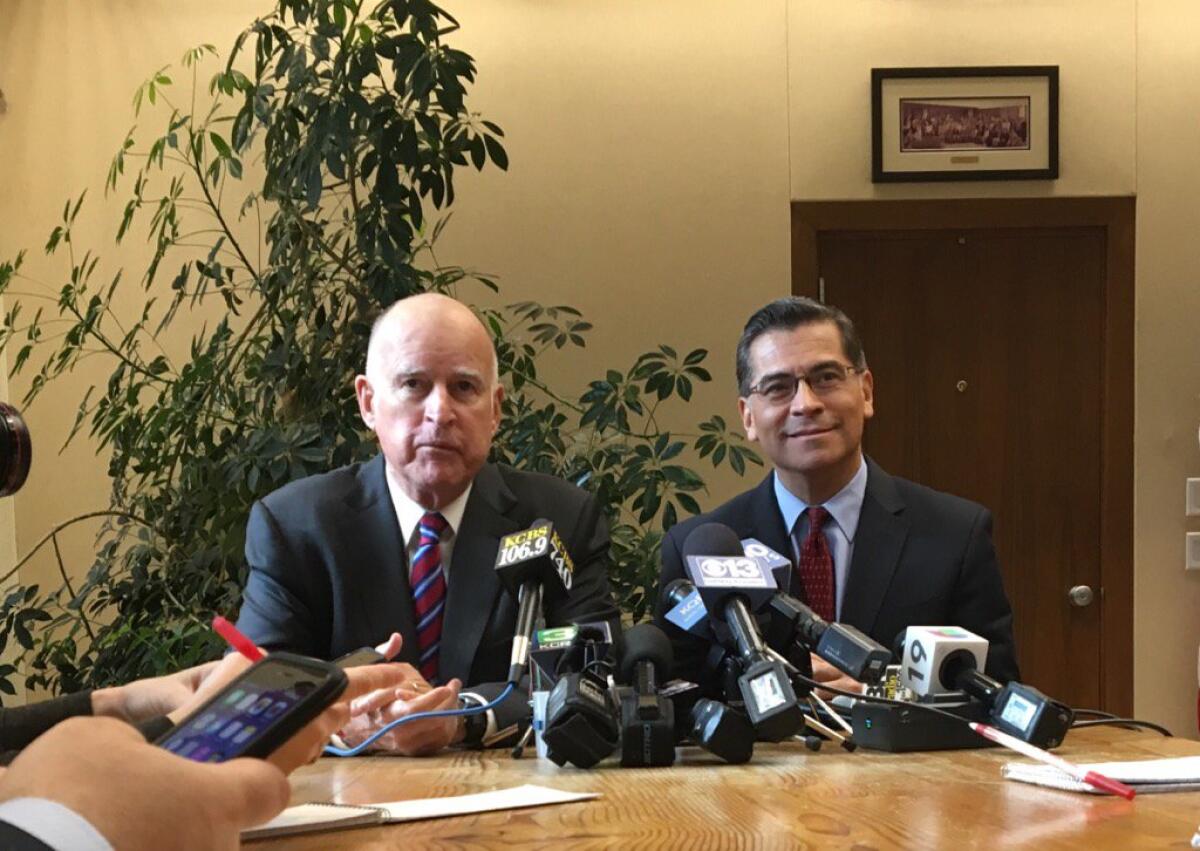
The two men who likely will lead any California efforts to fight the policy changes contemplated by President-elect Donald Trump appeared unwilling to throw the first punch Monday, vowing instead to watch the new administration carefully.
“We’ll just have to watch to see what moves the federal government makes,” said Gov. Jerry Brown in a meeting with reporters in his state Capitol office. “And I think that’s the wiser course of action.”
Sitting beside Brown was Rep. Xavier Becerra (D-Los Angeles), the governor’s choice to succeed Atty. Gen. Kamala Harris once she takes the oath of office as a U.S. senator next month.
Becerra also sounded a note of caution on issues such as immigration and healthcare.
“We won’t shy away from representing and defending what we stand for as Californians,” Becerra said. “But we’re not out there to pick fights.”
The tone of the governor, who didn’t avoid critiquing the president-elect during the campaign, was noticeably different from that struck by Democratic leaders of the Legislature during the opening hours of the new two-year legislative session. Hours after Brown and Becerra’s comments, both houses were riven by a heated debate over resolutions opposing any major deportation effort led by Trump.
Becerra, who won’t be nominated by Brown for the attorney general post until next month, said he knew well the stakes of the debate as the son of a Mexican immigrant.
“My father would tell me the stories when, as a younger man, he couldn’t walk into a restaurant because of the signs that said, ‘No dogs or Mexicans allowed,’” Becerra said. “I hope that I can be an officer of this state that recognizes that people just want to have an opportunity.”
California’s not leaving the United States, says state Senate leader Kevin de León
As new members of the state Senate were sworn in on Monday, Senate President Pro Tem Kevin de León made clear that California had no intention of seceding and urged unity across the political aisle.
California will accept the election of President-elect Donald Trump, he said, but will not regress to the politics of “scapegoating, preying on racial, ethnic and religious hostilities.”
De León said that members of the state Senate and Assembly have an “additional obligation to moral leadership.”
“We will always fight for what is right,” he said. “We will always fight for our California values.”
Last month, a group of activists launched an effort to split California from the United States with a potential statewide ballot measure. The long-shot effort attracted a significant amount of attention, coming less than two weeks after most California voters chose Democrat Hillary Clinton instead of Trump.
New lawmakers celebrate their new jobs on the first day in Sacramento
Democratic lawmaker: Trump’s immigration policies are ‘ethnic cleansing’
California Senate holds moment of silence for Oakland fire victims
Assembly Speaker Anthony Rendon: ‘Californians do not need healing. We need to fight’
Assembly Speaker Anthony Rendon (D-Paramount) gave a fiery speech outlining the state’s opposition to incoming President Donald Trump’s administration. Some highlights:
Anthony Rendon is reelected Assembly speaker
The new state Assembly is official
California governor, Legislature are now highest paid in nation
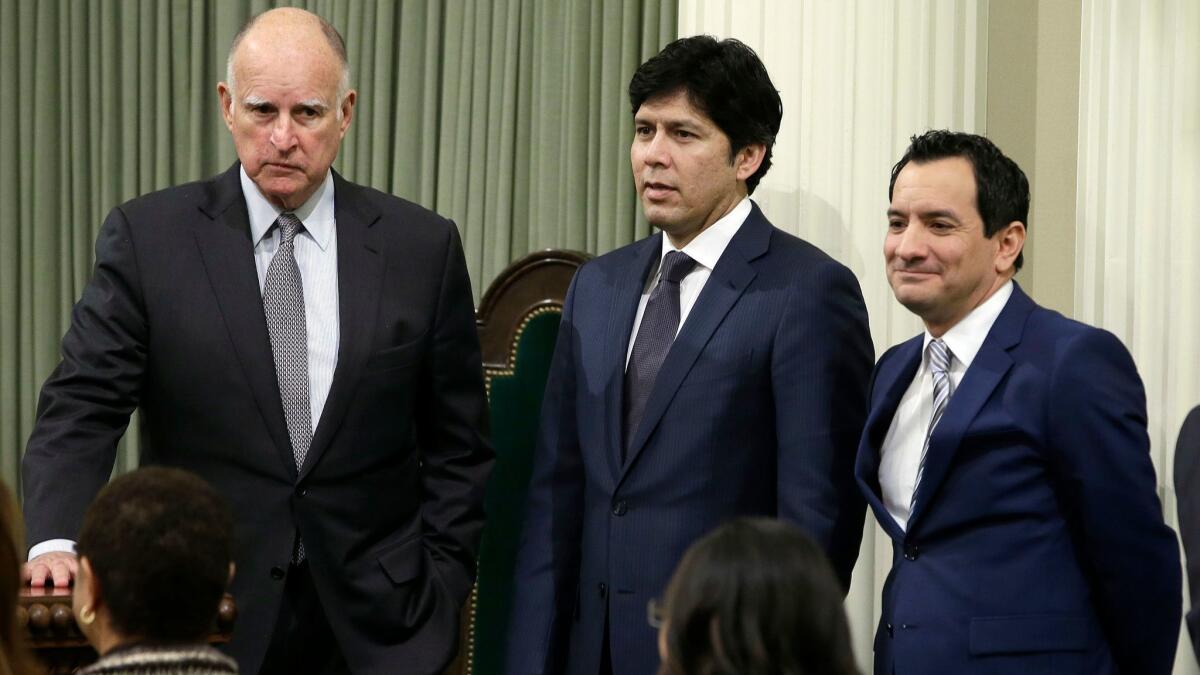
Gov. Jerry Brown, state legislators and other state elected officials received a 4% pay raise Monday, months after a citizens panel approved the increase citing California’s improved economy and healthy state budget.
Brown’s salary jumped from $182,789 to $190,100, making him the highest-paid governor in the country. The governor’s salary in Pennsylvania is $723 higher than Brown’s new paycheck, but Gov. Tom Wolf does not accept the salary.
California legislators already received the highest base salary in the country, but on Monday saw their pay increase from $100,111 to $104,115.
The Assembly speaker and Senate president pro tem will receive a salary of $119,734.
Assemblyman Tom Lackey (R-Palmdale) notified the state controller that he will not accept the raise. “Many Californians have not received pay raises this year so he just doesn’t feel it would be right to accept one,” said George Anderson, his chief-of-staff.
Bigger paychecks will also be delivered to the attorney general, superintendent of public instruction, controller, treasurer, insurance commissioner, lieutenant governor, secretary of state and four members of the State Board of Equalization.
The attorney general salary is $165,126, so it will be a pay cut for Xavier Becerra, who earns a $174,000 base salary as a member of Congress.
Updated, 12:08 p.m.: This item was updated with a statement from Lackey’s chief of staff.
This item was originally published at 11:11 a.m.
Tax-free tampons proposal is back as California Legislature returns
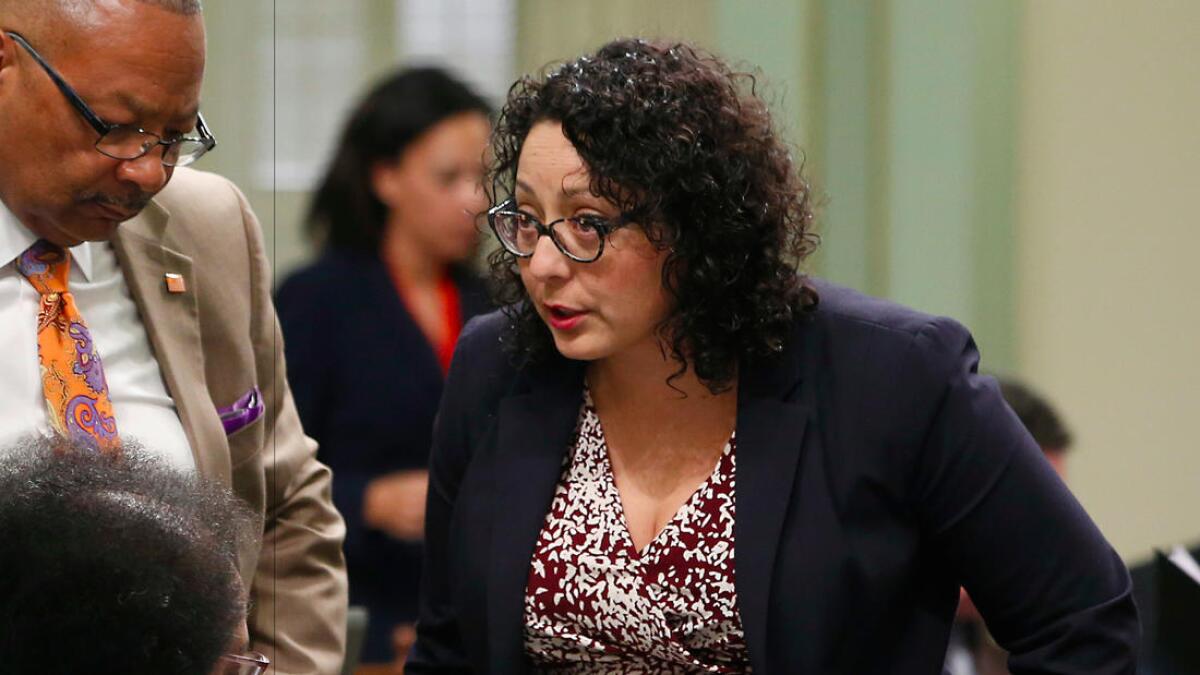
Assemblywoman Cristina Garcia (D-Bell Gardens) says she plans to re-introduce a bill to exempt tampons and other menstrual products from sales tax.
Gov. Jerry Brown vetoed a similar measure that received bipartisan support earlier this year. In a veto message, Brown wrote that such tax breaks are “the same as new spending” and warned that the state’s budget “remains precariously balanced.”
The state Board of Equalization estimated the lost revenue at $20 million, split between state and local governments.
Garcia and others have argued the tax on menstrual products unfairly penalizes women for a basic necessity.
The assemblywoman said she spoke to Brown at a reception Sunday about her plans to introduce the bill, and asked him to reconsider.
“The reality is that this is not a gender-neutral tax law. It affects only people who were born with a uterus,” Garcia said. While there would be loss of revenue, she added, “I think it’s something we can absorb, and it’s something... we never should have been taxing in the first place.”
Garcia said she also will introduce a bill to improve access to menstrual products. It would require public places such as schools, universities and shelters to stock tampons and other menstrual products in bathrooms.
She also plans to make good on a promise to introduce a constitutional amendment that would tax snacks and candy, an idea she floated during the tampon tax debate.
The state Department of Finance has estimated that could bring it more than $1 billion in sales tax revenue. Doing so would require a two-thirds vote in both houses to place a measure on the statewide ballot, which would then need to be approved by voters.
“I’m not doing any of this stuff because it’s easy,” Garcia said. “I’m looking at the long road ahead, but it’s a challenge I’m ready for.”
California lawmakers aim to make bail reform top priority in the upcoming legislative session
California lawmakers are gearing up to tackle what will be one of the most significant and challenging battles in the 2017 legislative session: reforming the system through which judges award bail to criminal defendants.
Assemblyman Rob Bonta and Sen. Bob Hertzberg plan to set the stage Monday, when they file bills stating the Legislature’s intent to enact laws that will reduce the jail population and address racial and economic disparities in the process.
Bail reform legislation has failed in California in the past, largely due to heavy opposition from bondsman and insurance companies. But debate over the issue has brewed nationwide in the past two years, and Bonta and Hertzberg said they have energy and a broad, bipartisan coalition of organizations and lawmakers on their side.
Los Angeles City Council member won’t seek Becerra seat
After saying Friday he would consider it, Los Angeles City Councilman Jose Huizar has ruled out a bid for the 34th Congressional District seat Rep. Xavier Becerra will vacate if confirmed as the state’s next attorney general.
Huizar said in a statement Monday that after discussions with his wife, Richelle, and family he will stay put as a Los Angeles City Council member.
“There is a considerable amount of work for me to complete here locally in the great City of Los Angeles and California. I am grateful for the immense outpouring of support and would like to particularly thank the residents of the 14th District for the incredible work we have accomplished together. The growth and positive change we have seen in our 14th District neighborhoods is the direct result of the strength that comes from our community focused approach,” he said.
“I hope the next Congressmember from the 34th District uses a community focused approach. The change we need in our federal government begins with an agenda that listens to the average person and steers away from politics as usual. The stakes are high. President-elect Donald Trump’s threat to our core Democratic values of social justice and civil rights is very real.”
Former Assembly Speaker John A. Perez announced his plans to run for the seat last week. Assemblyman Jimmy Gomez, a Democrat from Echo Park, joined the fray Monday.
California legislation challenges Trump’s proposals for a border wall and registration of Muslim immigrants
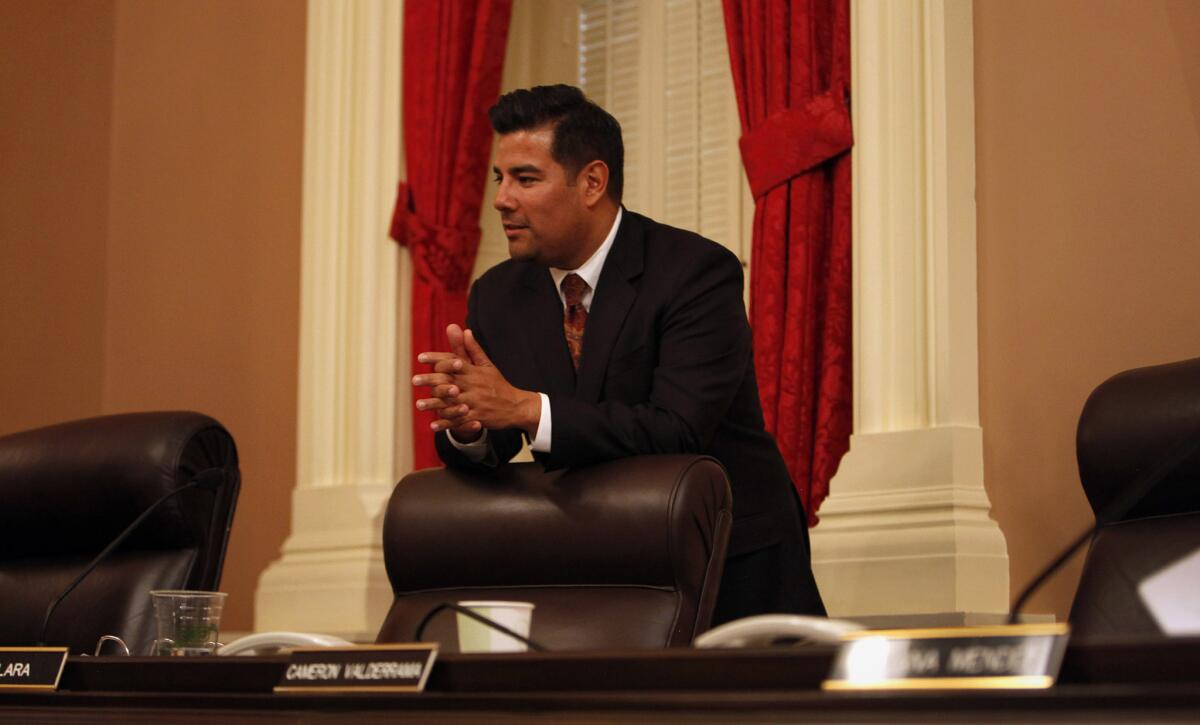
In a challenge to President-elect Donald Trump’s proposal to build a wall at the Mexico border, a California lawmaker said Monday he is introducing a bill that would require the project to first be approved by the state’s voters.
State Sen. Ricardo Lara (D-Bell Gardens) said the legislation is one of three proposals he is introducing as a package called Fight For California. Another bill would prohibit state agencies from providing federal entities with information for purposes of compiling a so-called Muslim registry, another Trump proposal.
“We’re not going to allow a wall that harms our environment and our economy,” Lara said in a statement. “We’re not going to allow personal data on individual Californians’ religious beliefs to be used to compile an unconstitutional database.”
Lara has been a leading lawmaker on immigration issues in recent years. His parents are immigrants from Mexico who were in the U.S. illegally before they gained citizenship.
He said one bill would mandate a vote of the people to approve any border wall project, which he said would harm California’s environment, including wildlife and river watersheds, as well as the state’s economy, including trade and tourism.
The second bill would prohibit state agencies from providing information to the federal government on an person’s religious affiliation if it is to be used for the purposes of compiling a database based solely on religious affiliation.
Lara said the measure would not affect the sharing of information by law enforcement agencies for purposes of national security.
The third bill is a reintroduction of legislation vetoed this year by Gov. Jerry Brown. The measure would prohibit local governments from contracting with private, for-profit companies to detain immigrants for profit and would require detention facilities to meet Immigration and Customs Enforcement minimum health and safety standards, Lara said.
“Californians voted overwhelmingly to uphold our values of inclusion and diversity,” Lara said of the November election results. “We’re going to fight for California and for our values of democracy, freedom and basic human decency.”
Assemblyman Jimmy Gomez joins race to succeed Rep. Xavier Becerra in Congress
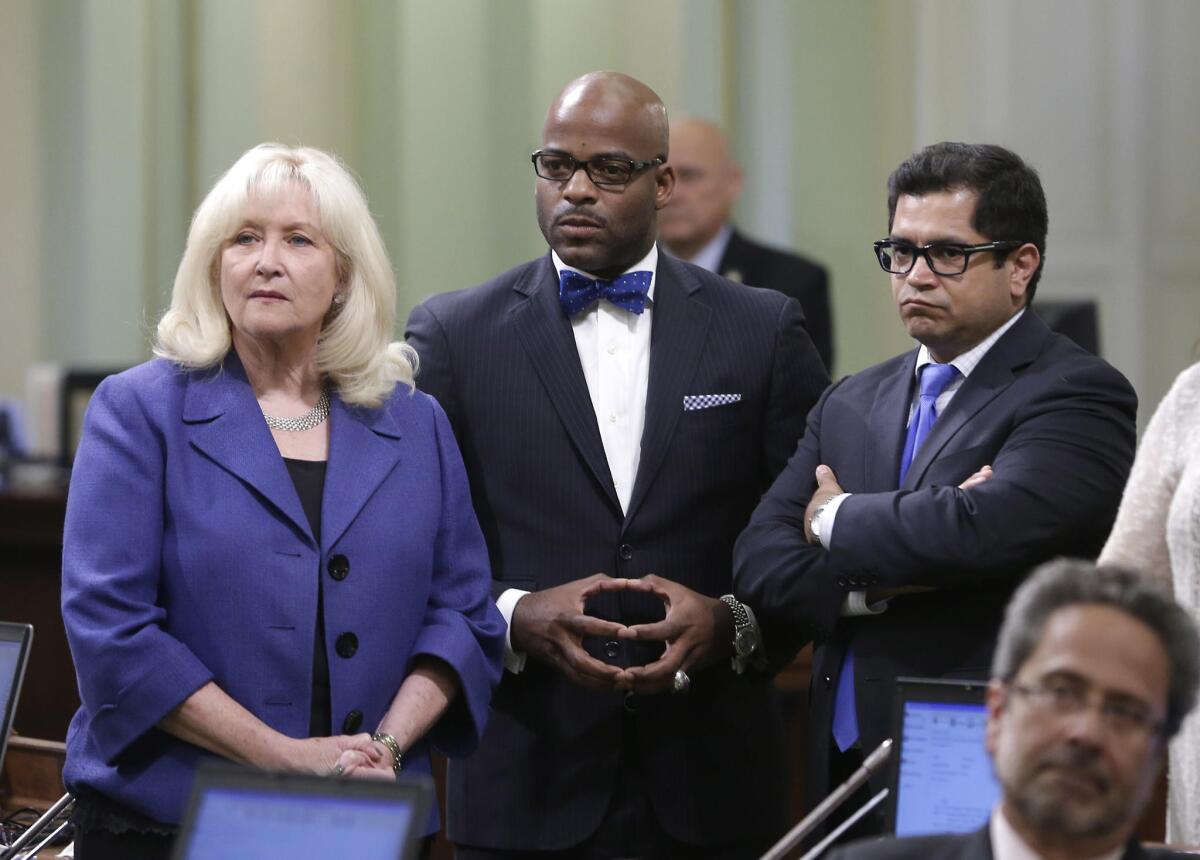
Assemblyman Jimmy Gomez, a Democrat from Los Angeles, is jumping into the fray to replace Rep. Xavier Becerra in Congress, he told The Times on Monday.
“After talking it over with my family and supporters, I have decided to run for the 34th Congressional seat,” Gomez said in a statement. “I have worked for the people of the 34th District as their State Assemblymember for the past four years. I have fought to ensure everyone – no matter where they live – has access to clean air and water, every worker has a fair and livable wage, and every child can go to college.”
“Now more than ever, we need strong valued-based leadership in Washington that will protect our families, friends and neighbors from divisive rhetoric and policies,” he said. “I’m ready to stand up and do just that.”
Gomez, who was just elected to a third term in the Legislature, will be announcing his decision on his Facebook page this morning, he said.
The Eagle Rock resident represents an Assembly district that substantially overlaps Becerra’s congressional district.
Gov. Jerry Brown’s surprise decision to nominate Becerra as the new state attorney general, replacing U.S. Sen.-elect Kamala Harris, set off a scramble to assess how the now-open congressional seat would ripple through California’s political establishment.
Former Assembly Speaker John A. Pérez entered the race last week, soon after news of Brown’s decision broke. No other contender has jumped in, although Los Angeles-area politicians including City Councilman Gil Cedillo and LAUSD school board member Monica Garcia have ben floated as potential candidates.
Another council member, Jose Huizar, suggested last night he would not enter the race, posting a video on Twitter of his daughter saying she’d like to stay in Los Angeles. Huizar is expected to make an official announcement later this morning.
Later Monday, Huizar made it official he won’t seek the seat.
California’s incoming House members get a feel for the new job
California’s five incoming House freshmen got their first taste of the frantic pace of life as a member of Congress last month. They just wrapped up two weeks of daylong classes on Capitol Hill learning about cybersecurity, ethics, protocol, how to write legislation and how to manage the budgets for their offices in Washington and back home.
They also began looking for places to live (or in one case the right Capitol Hill office to sleep in) and started interviewing staff.
They have to hustle. They take the oath of office Jan. 3.
Democrats in the California Legislature to take on Trump by wading into immigration debate
With President-elect Donald Trump’s campaign rhetoric on illegal immigration still fresh on their minds, legislative Democrats have readied a pair of proposals they believe will offer some immigrants additional legal help.
The bills, set to be introduced on the first day of the new legislative session Monday, primarily aim to bolster the legal representation of immigrants who are in the country illegally and threatened with deportation. California has no formal role in national immigration policy, but the bills could supercharge the state’s role in pushing back against a Trump administration’s effort to deport as many as 3 million people living in the United States.
Most sweeping is a bill that would authorize state government grants to nonprofit organizations that provide legal help for immigrants facing deportation. Dubbed “due process for all” in a summary document obtained by The Times, Democrats believe the money could help a significant number of immigrants to successfully challenge deportations.
The second bill would establish a new training and funding program for public defenders involved in immigration cases.
Democrats in the Legislature have strongly pushed efforts in recent years to help those who are in California illegally, and legislative leaders made it clear last month that they intend to fight against the ideas floated by the president-elect during the campaign.
The bills will also present an early test of the Democrats’ new supermajority status in the state Capitol. Both will be drafted with an “urgency clause,” which requires a supermajority vote in both houses and would allow the laws to take effect immediately if signed by Gov. Jerry Brown.
California’s largest state worker union cancels its Monday strike in Sacramento
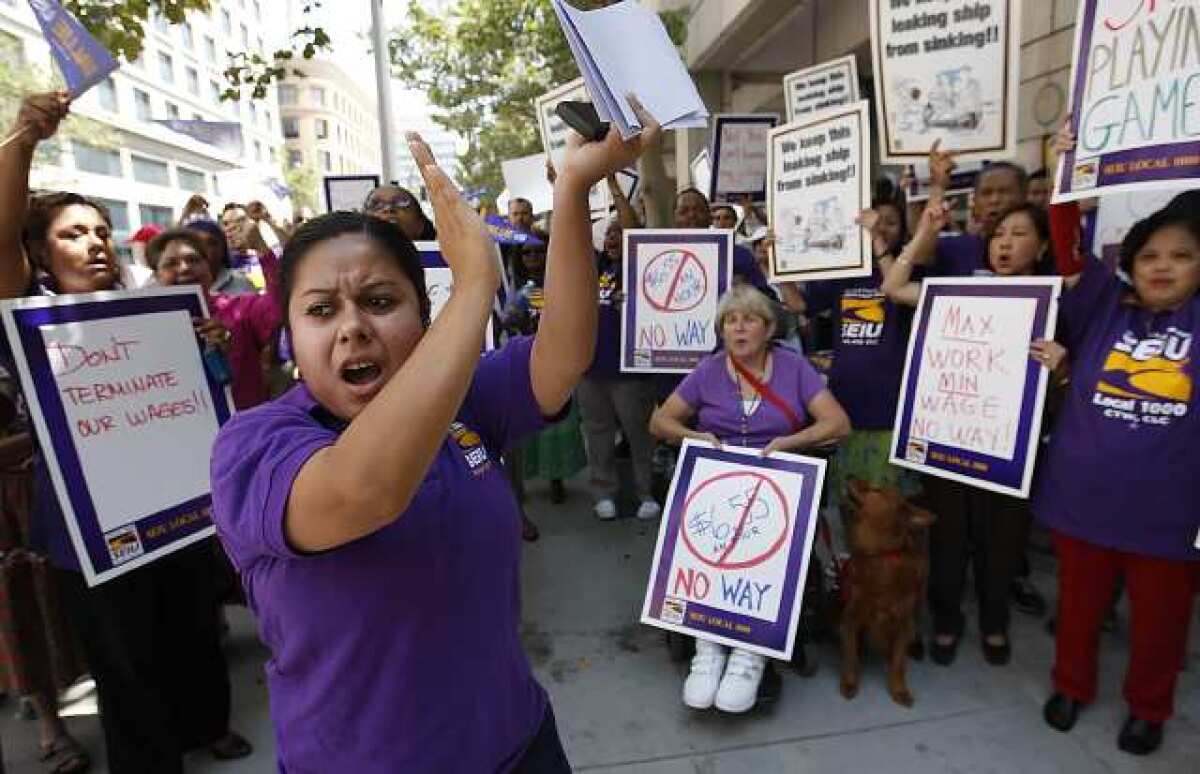
A union representing some 95,000 state workers has called off plans for a one-day strike, saying that it has “found a pathway forward” in contract negotiations with the administration of Gov. Jerry Brown.
The announcement on Friday afternoon by SEIU Local 1000 averted what was shaping up to be a test of wills between state officials — who warned that its members are subject to a no-strike clause — and the politically powerful union.
A spokesman for the union declined to offer any additional details beyond a brief statement from Yvonne Walker, the union’s president.
“After weeks of preparing for a strike, we have been in conversations with the state, and we both feel we have found a pathway forward,” she said. “Our goal has never been to go on strike. It has always been to get a contract we can all be proud of.”
The union and state negotiators have been at the bargaining table for almost eight months, with both a pay raise and the size of worker healthcare contributions as key sticking points.
SEIU Local 1000 officials announced last month that a sizeable number of its members, from clerical workers to nurses, had approved a strike.
“We are pleased that the public will not have to face disruptions to state services on Monday,” said state Department of Human Resources spokesman Joe DeAnda. “We will continue to work with union leaders to finalize a formal agreement.”
Update 4:05 p.m.: This story was updated with a statement from the state Department of Human Resources.
With Trump waiting in the wings, California Democrats ask Obama to block future offshore drilling
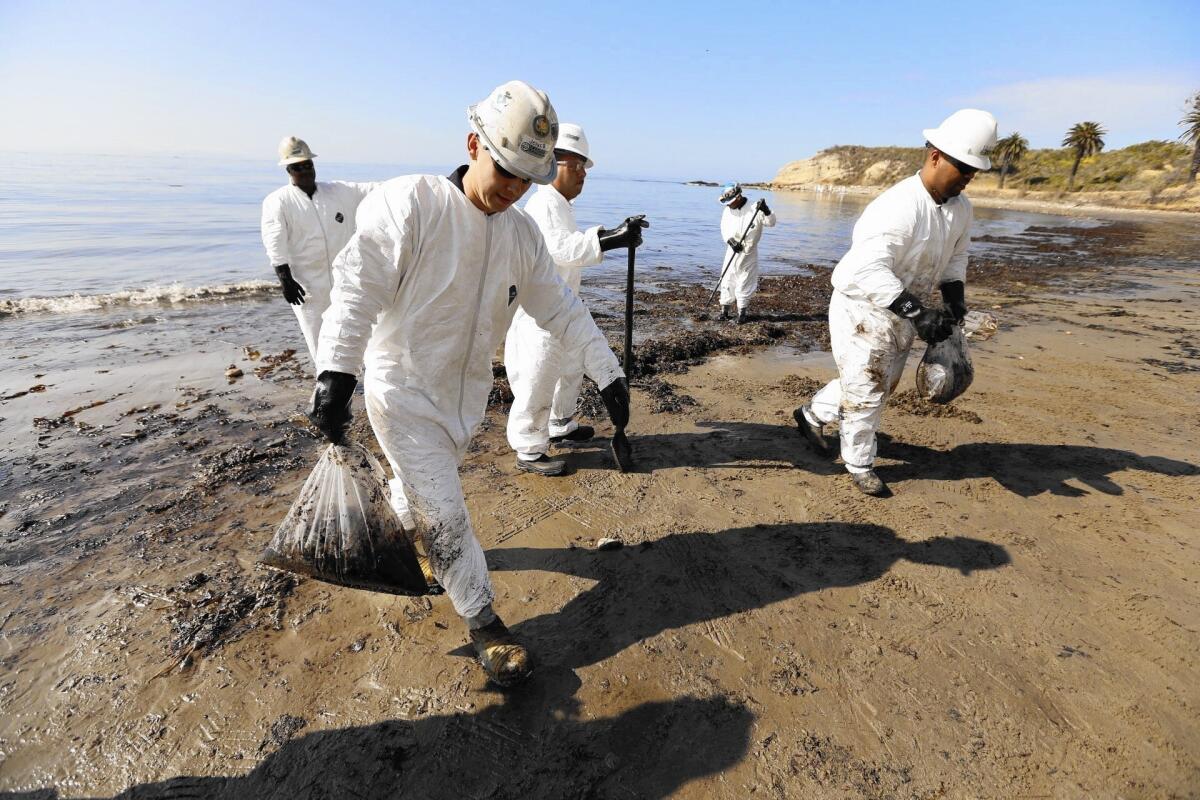
Ahead of next month’s inauguration of President-elect Donald Trump, more than two dozen returning and new Democratic members of the California Senate on Friday asked President Obama to enact a ban on new oil drilling off the state’s coast.
The letter signed by 26 of the 27 members of the new Senate Democratic Caucus that will be in place Monday cites the presidential authority to block new oil and gas drilling under the Outer Continental Shelf Lands Act.
Last month, the Obama administration said it was banning offshore oil drilling in the Arctic through 2022.
The request comes after signs from the president-elect of a major shift in offshore drilling, part of a broader strategy to boost domestic oil and gas production.
“A sizeable spill off our coast would have a devastating impact on our population, recreation, natural resources, and our ocean and coastal dependent economies,” the senators wrote. “Expanded offshore oil and gas drilling also undermines the important strides we have made both as a state and as a nation to address climate change and promote a clean energy economy.”
Gov. Jerry Brown had to pick an attorney general faster than he expected
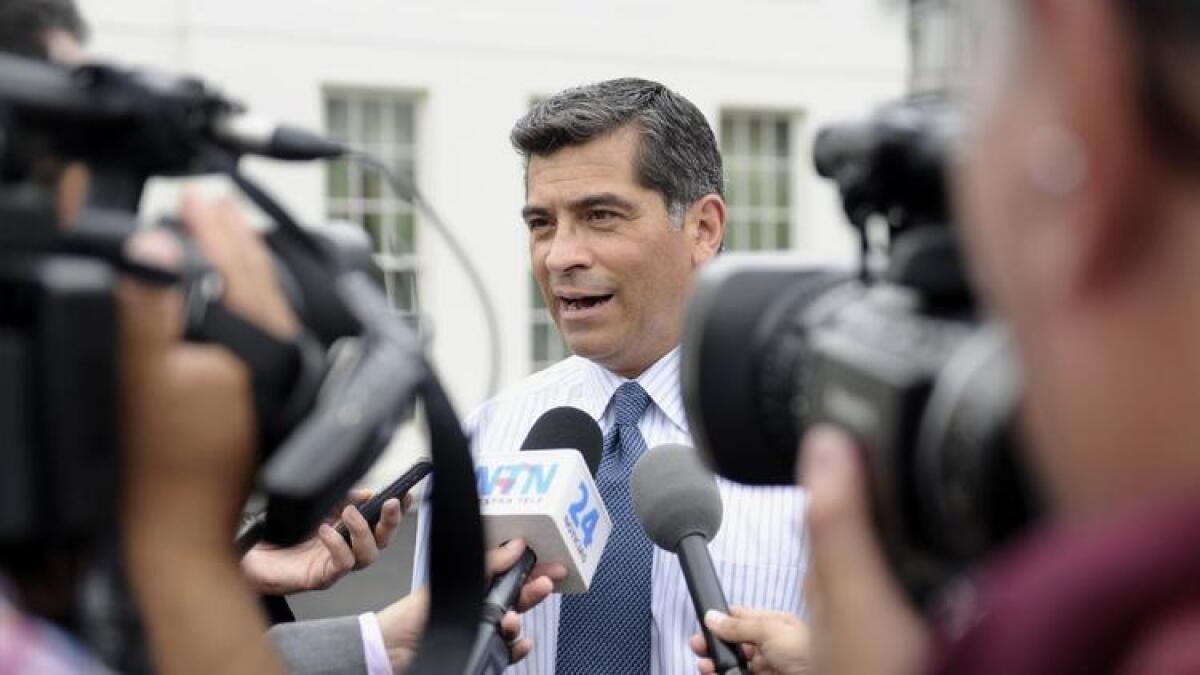
The phone call that Gov. Jerry Brown made on Wednesday night was unusual. A governor who marches to his own methodical timetable for decisions was having his hand forced by the politics of Capitol Hill, and the job of California attorney general hung in the balance.
In the end, Brown got the man he wanted: Rep. Xavier Becerra (D-Los Angeles). But it was Becerra’s effort to make a big career move that complicated things.
In interviews with advisers to the governor and those close to Becerra, a portrait emerged of two veteran politicians who have mutual admiration but don’t really know each other very well. In fact, the 12-term congressman plans to spend part of this weekend meeting with Brown in Sacramento.
It was Becerra’s angling for an unexpectedly open high-profile post leading Democrats on the tax-writing House Ways and Means Committee that sparked the circumspect governor into action.
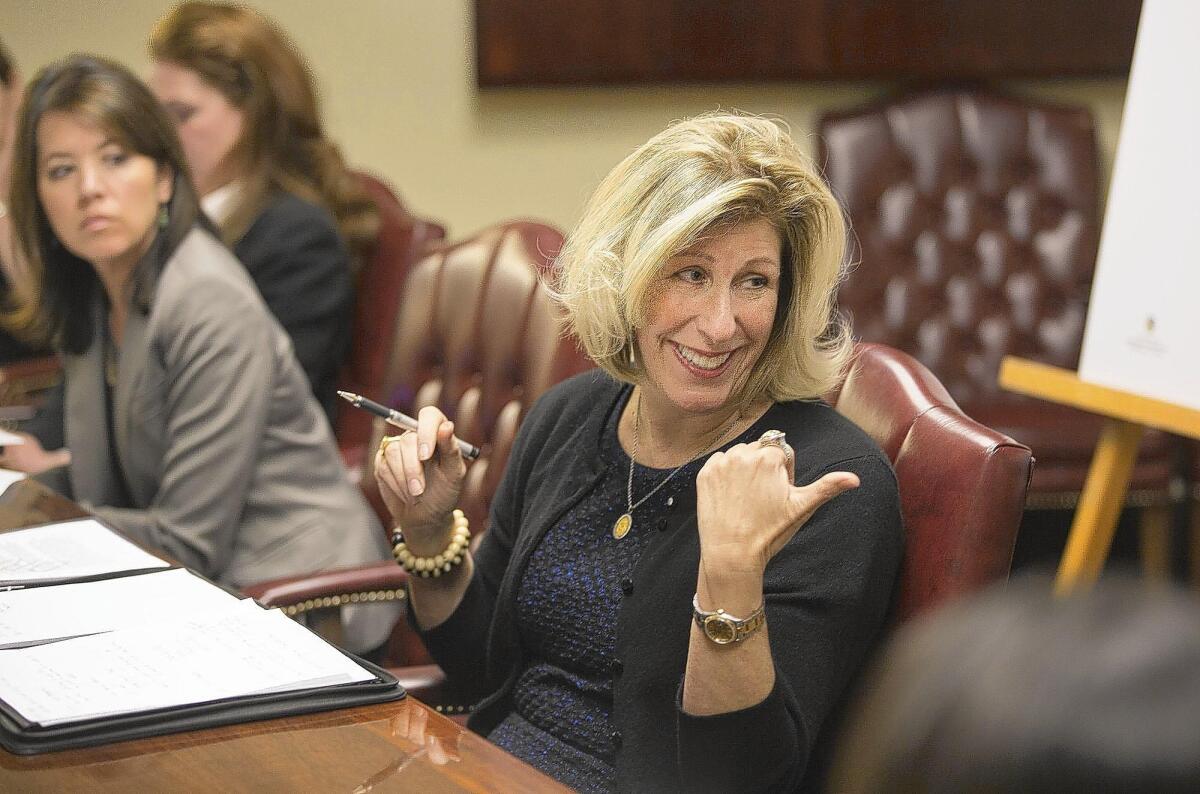
In Sacramento, those close to the governor said that the list of potential replacements for Kamala Harris was short, much shorter than the ones circulated by political watchers. Advisers confirmed that either First Lady Anne Gust Brown or the governor’s top aide, Nancy McFadden, could have had the job if they had wanted it.
Neither did, perhaps knowing the importance being placed on picking someone who would be willing to run for a full term in the job in 2018 (though Becerra declined to talk about future plans when asked on Thursday).
Becerra, on the other hand, intrigued the governor. Not only did he have the right credentials -- a former deputy attorney general, former state legislator, veteran member of Congress -- but advisers said the governor also valued diversity. And the chance to select the state’s first Latino attorney general was important.
While few jobs are as important to Brown, himself a former attorney general, the leading contender never came in for an in-person interview. Becerra, who grew up in Sacramento, had been in town just before election day to stump for the reelection of Rep. Ami Bera (D-Elk Grove). He met with McFadden on that visit, but not the governor.
And so the two men, who had no deep personal relationship, made the big decision long distance.
“When they talked,” McFadden said in an interview, “the man matched the resume.”
Becerra had been looking for somewhere to land. Out of places to move in House leadership and nearing the limit on how much longer he could lead the House Democratic Caucus, the vocal advocate for Hillary Clinton had spent the last year campaigning for her across the country with hopes it might lead to a new position.
Clinton’s loss Nov. 8 put an end to that speculation, and for a while Becerra’s next move didn’t seem clear.
Surprise news Tuesday afternoon that the ranking Democrat on Ways and Means, Rep. Sandy Levin (D-Mich.) would not seek the position again led Beccera to quickly announce his plans to seek the position and lobby colleagues to back him. Levin quickly endorsed Becerra over Massachusetts Democratic Rep. Richie Neal, who had sought the job before.
Word of Becerra’s effort quickly reached the state Capitol and the governor’s inner circle sprang into action. Perhaps fewer than a half dozen people knew of Brown’s decision until news began to spread early Thursday morning.
Becerra called the offer “sudden” and said with Congress in session he hadn’t even had a chance to talk with Brown about the job in person.
“It went very quickly when it started to move,” he said. “I was as stunned as you probably were and others were.”
‘Elite vs. non-elite’ vein in the electorate shaped campaigns for president and California Senate, consultant says
State lawmakers call on Becerra to keep up probe of Public Utilities Commission when he takes office
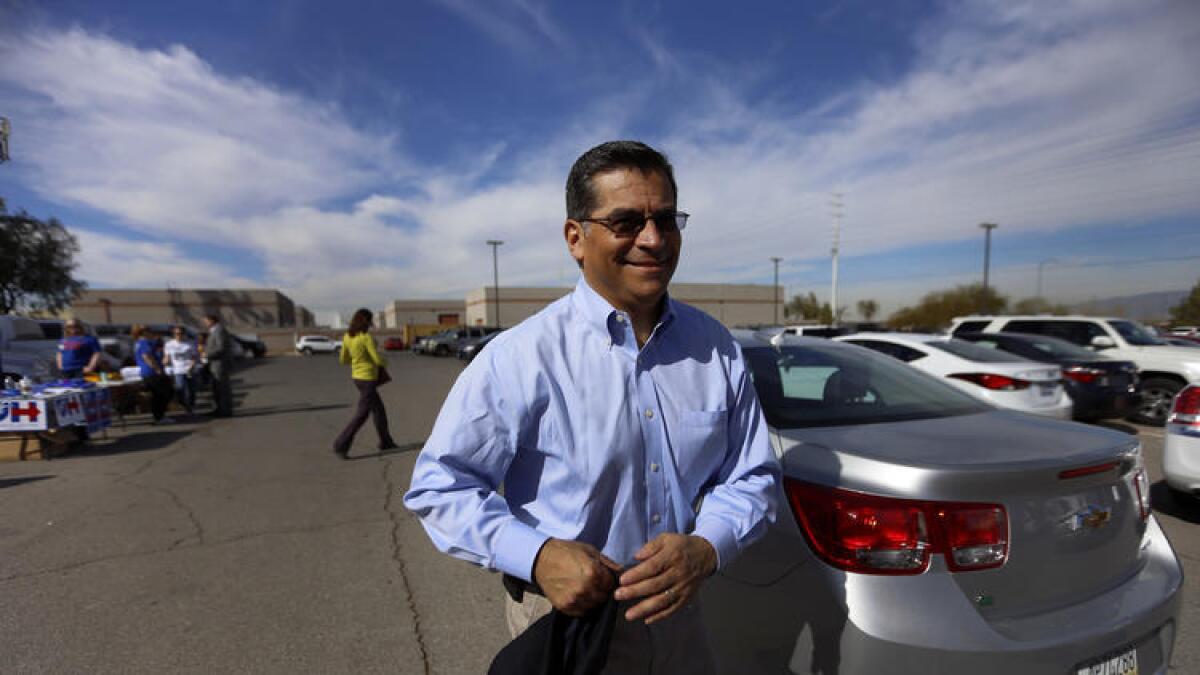
Two state lawmakers on Friday asked newly selected but still-to-be-confirmed state Attorney General Xavier Becerra to give priority to the long-standing investigation into alleged misconduct in the California Public Utilities Commission.
State Sen. Jerry Hill (D-San Mateo), Assemblyman Kevin Mullin (D-South San Francisco) and San Bruno Mayor Jim Ruane sent a letter to the congressman asking that he continue the probe, which was launched in 2014, when he takes office as the state’s top cop in the coming weeks.
It was launched by current Attorney General Kamala Harris and involved a search for documents at the home of former PUC President Michael Peevey.
The investigation is looking into a secret 2013 meeting in Warsaw between Peevey and an executive from Southern California Edison that allegedly resulted in an agreement to have customers pay for most of the shutdown costs of San Onofre Nuclear Generating Station.
Hill and Mullin suggested Becerra and an interim attorney general consider appointing a special master to review the large number of documents involved.
“We are deeply concerned that, if the (Attorney General’s) Office skips a beat during the transition period, the people of California may lose — not just the money from their pockets, but the chance to prevent these abuses from occurring again,” the letter said.
Becerra was named Thursday by Gov. Jerry Brown to replace Harris when she becomes a U.S. senator.
The letter writers have stepped up calls for PUC reform in response to a gas pipeline explosion that killed eight people and injured 66 others in San Bruno.
Lou Correa, Orange County’s new congressman, says he wants to fight deportations under a Trump presidency
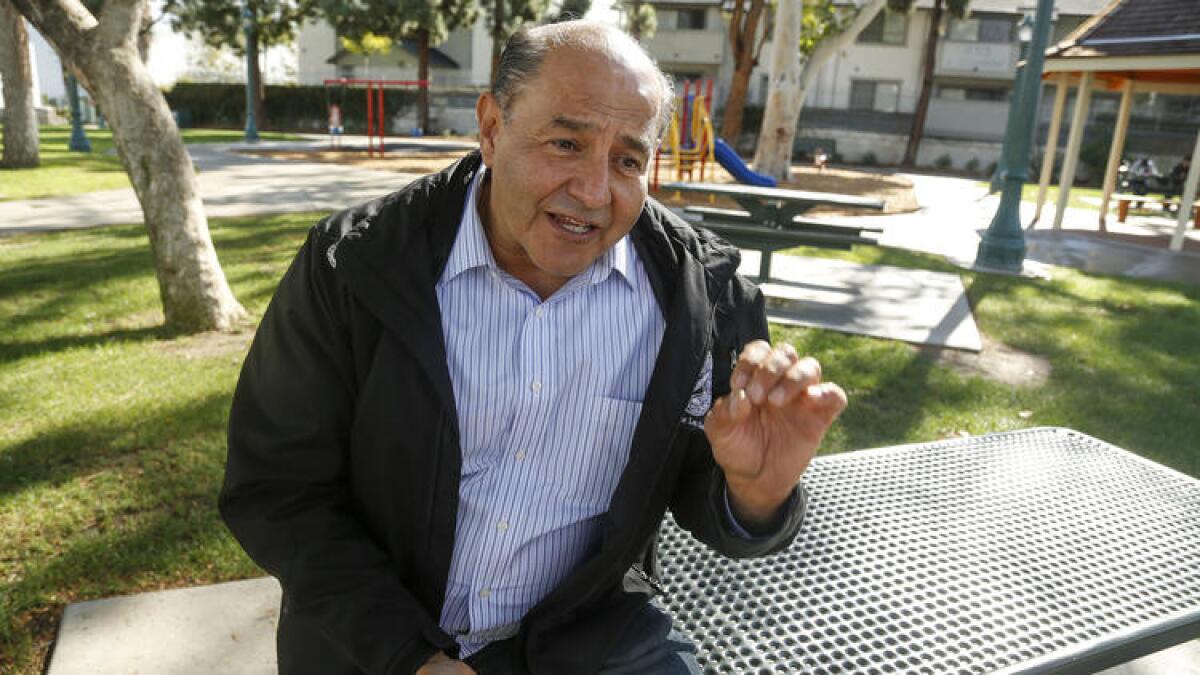
Lou Correa is a well-known name in central Orange County; over the years, he’s represented the area in the state Assembly and the state Senate and on the county Board of Supervisors.
But there’s a side of Correa that few are as familiar with: a man who lived much of his early life in Mexico, learned English as a second language and whose parents struggled in low-paying jobs while he was growing up in Anaheim.
Correa, who was born in East Los Angeles, said many of his family and friends were immigrants, and that one of his top priorities during his first term in Congress will be to fight the deportations that President-elect Donald Trump has promised.
“People are scared to death right now,” said Correa, 58. “My role is one of education. The new immigrants are not here to cheat or steal. They’re here to work hard and be part of the American Dream.”
Special election to replace Rep. Xavier Becerra in Congress could get crowded
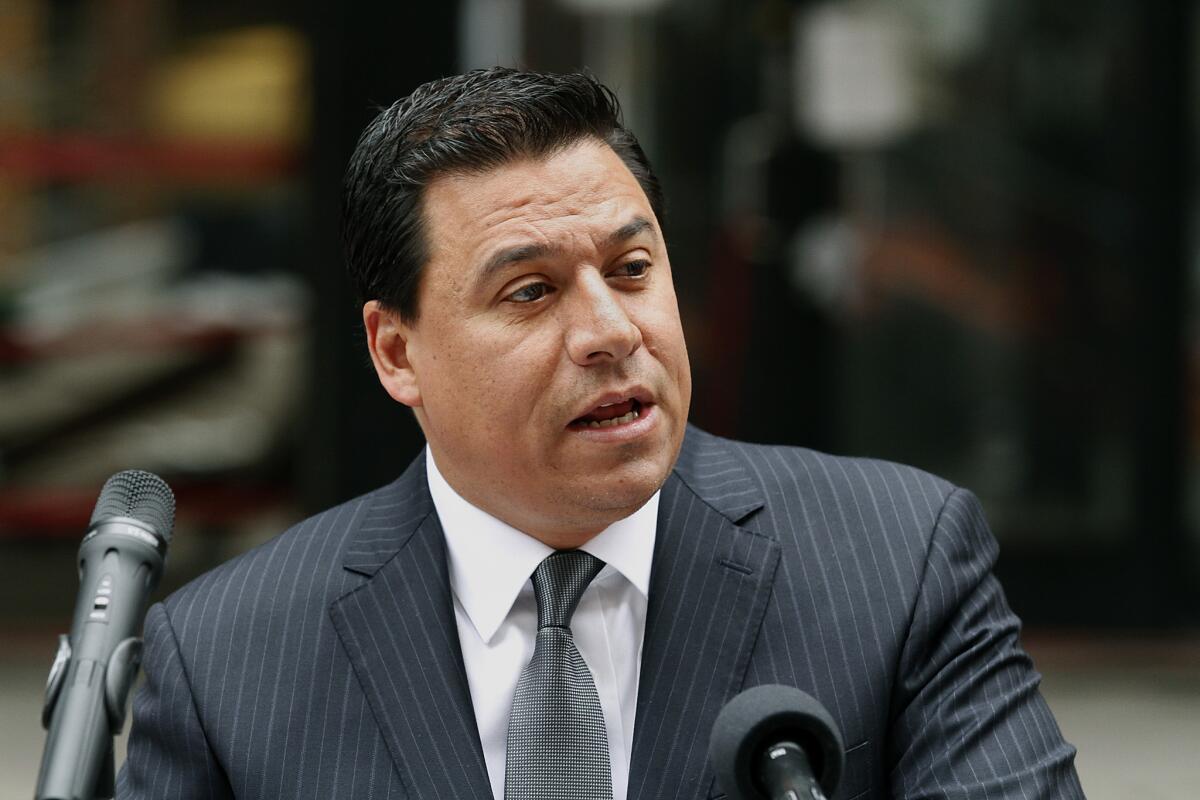
Former Assembly Speaker John A. Perez may have been among the first to publicly announce he plans to pursue Rep. Xavier Becerra’s 34th Congressional District in Los Angeles if the Legislature confirms him as attorney general, but he isn’t the only one talking about it.
Los Angeles City Councilman Jose Huizar is discussing with his wife whether to run for Becerra’s seat, his spokesman, Rick Coca, said in a statement.
“There is no doubt as a Mexican immigrant who has been very vocal in his concerns with President-elect [Donald] Trump, and as an elected official with a stellar record of building schools, protecting the environment, addressing homelessness and spurring economic development in many of the same communities covered by the 34th Congressional District, Councilmember Huizar would be both a well-qualified and formidable candidate.”
Several other names have been floated in the less than 24 hours since Gov. Jerry Brown announced that he’s picked Becerra as the state’s next attorney general.
Assemblyman Jimmy Gomez (D-Los Angeles) said he is considering a bid, noting that his assembly district overlaps with two-thirds of the congressional district and he was reelected last month with 86% of the vote.
“This is not a decision that one rushes into,” Gomez told The Times. “I am having conversations with my family and supporters before making a final decision.”
Other local politicians were quick to say they’re happy where they are.
Assemblyman Miguel Santiago (D-Los Angeles) said in a statement that he’s looking forward to working with Becerra from the Legislature.
California Senate President Pro Tem Kevin de León on Thursday lauded the Becerra nomination, while a source close to the Senate leader said he has no plans to run for Becerra’s congressional seat when it is vacated.
Becerra has represented downtown Los Angeles and communities to the west and north in Congress for 24 years, and called the chance to serve as attorney general bittersweet because he will miss that role.
A special election to fill the seat probably would take place in late spring of 2017, though the law gives Brown wide discretion on setting the precise schedule.
California treasurer asks President-elect Donald Trump to address inability of pot firms to use banks
Just weeks after Californians voted to legalize recreational use of marijuana, State Treasurer John Chiang on Friday appointed a working group to figure out how to address problems caused by the unwillingness of federally regulated banks to handle money from pot businesses.
Chiang also sent a letter to President-elect Donald Trump and members of California’s congressional delegation seeking guidance in finding a solution.
Marijuana remains an illegal drug under federal law, and banks regulated by the U.S. government have refused to provide financial services to cannabis-related firms.
“This conflict between federal and state rules creates a number of problems for the states that have legalized cannabis use, including difficulties collecting tax revenue, increased risk of serious crime, and the inability of a newly legal industry under state law to effectively engage in banking and commerce,” Chiang wrote to Trump and those he asked to serve on the working group.
The working group is made up of representatives from law enforcement, the marijuana industry, banks, taxing authorities and local government agencies, said Chiang, who is a candidate for governor.
On Nov. 8, California voters approved Proposition 64, which allowed the state to join Colorado, Oregon, Washington, Massachusetts, Nevada, Alaska, Maine, and the District of Columbia in legalizing recreational use of cannabis.
Chiang noted that marijuana sales are expected to reach $7 billion annually in California and pot firms will have to pay about $1 billion in taxes to state and local governments.
“The standoff between states and the federal government means a lot of businesses will be hauling around a lot of cash with no place to deposit their money and putting themselves at the risk of robbery,” Chiang told reporters in a conference call.
Chiang downplayed the likelihood of creating a state bank, saying it would be a complex process that would involve thorny issues including collateralization.
California Politics Podcast: The attorney general pick and a preview of the Legislature’s return
Even in an election year with dozens of interesting contests, the appointment of California’s next attorney general might be one of the biggest political stories of 2016.
That’s because Thursday’s selection of Los Angeles Rep. Xavier Becerra injects a lot of new possibilities into what the political ruling class of California will look like in the years to come.
On this week’s podcast episode, we take an in-depth look at the policy and politics of Becerra’s selection by Gov. Jerry Brown to succeed Sen.-elect Kamala Harris.
We also preview next week’s return of the Legislature, as new and incumbent lawmakers take a close look at the landscape after the election of President-elect Donald Trump.
I’m joined by Marisa Lagos of KQED News and Anthony York of the Grizzly Bear Project.
Rep. Xavier Becerra not ruling out a run for governor or U.S. Senate after being picked as California attorney general
In an interview with NBC’s Chuck Todd this afternoon, Rep. Xavier Becerra (D-Los Angeles) said he was thankful for the “chance to make a big difference” for millions of Californians after being announced as Gov. Jerry Brown’s choice to replace California Atty. Gen. Kamala Harris.
Appearing on MSNBC, Becerra was coy when asked whether he would rule out campaigns for governor or U.S. Senate in 2018.
“I’ll be gratified if I can make sure I can get confirmed to be the next attorney general,” Becerra said, sidestepping the question. “Right now I’m thrilled that the governor would put this confidence in me to be the next AG.”
If confirmed by the state Senate and Assembly, both of which are controlled by Democrats, Becerra would become the state’s first Latino attorney general.
Becerra, the highest-ranking Latino member of the House of Representatives, said Brown’s nomination was an opportunity he couldn’t pass up.
“You’ve got to make a difference for your country when you’re given a chance, and I was given a chance to make a big difference not just for my country, but for my state,” Becerra said. He called California’s leaders “as forward-leaning as you find” and vowed to be both “the defender and advocate” for the state’s interests.
California Senate leader Kevin de León won’t run for Xavier Becerra’s congressional seat, source says
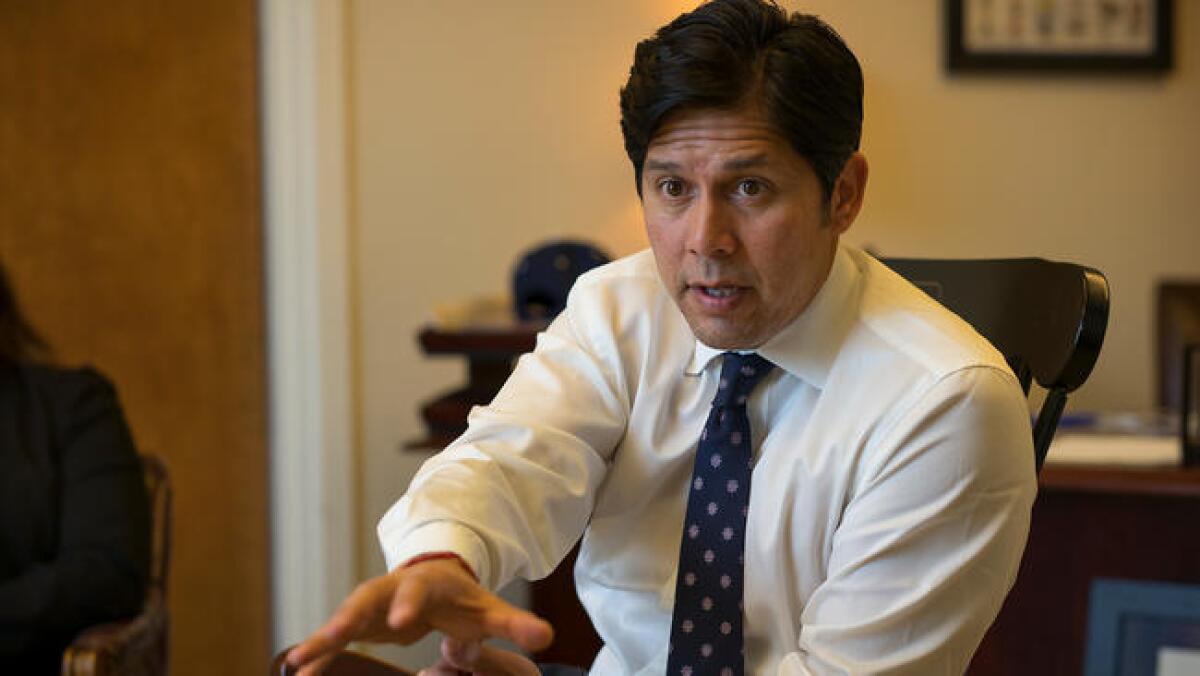
California Senate President Pro Tem Kevin de León on Thursday lauded the appointment of Rep. Xavier Becerra as state attorney general, while a source close to the Senate leader said he has no plans to run for Becerra’s congressional seat when it is vacated.
“He is a leader of courage, compassion and keen legal intellect,” De León said in a statement Thursday in reaction to the appointment of his fellow Los Angeles Democrat to the post.
“This is also the perfect matching of man and moment, given that California’s prosperity and people are currently under threat by a hostile Trump administration,” De León added. “Xavier will serve as a guardian of the Constitution and an ultimate check and balance against the forces of division and scapegoating that are mobilizing in Washington.”
De León is focused on continuing to serve as leader of the state Senate and does not plan to run for Becerra’s congressional seat, according to a source close to the senator who was not authorized to speak about the matter publicly and requested anonymity.
The Senate leader alluded to his focus on state office in his statement on Becerra.
“As the president of our state Senate, I look forward to working with him side-by-side to defend California’s progress every day for the next two years,” De León said.
George Skelton: Becerra pick will shake up California politics
And we’re off! Former Assembly Speaker John A. Pérez among first to announce run for Xavier Becerra’s U.S. House seat
Gov. Brown taps California’s Rep. Xavier Becerra to be state’s first Latino attorney general
Gov. Jerry Brown has tapped House Democratic Caucus Chairman Xavier Becerra (D-Los Angeles) to be the next attorney general of California. He will succeed Kamala Harris, who was elected to the U.S. Senate in November.
Becerra, 58, has served 12 terms in Congress and was making a bid to become the ranking Democrat on the powerful House Ways and Means Committee when Brown called him unexpectedly to offer the job.
“It’s a phenomenal opportunity,” Becerra said. “It means I get to be home a lot more.”
Becerra, who is the highest-ranking Latino in Congress, would be the state’s first Latino attorney general.
He worked in the Civil Division of the attorney general’s office from 1987 to 1990 before entering Congress. Becerra earned a law degree from Stanford Law School and a bachelor’s degree in economics from Stanford University.
He said in an interview Thursday morning he had always wanted to return to the office.
Becerra, if confirmed, would be the first attorney general appointed by a governor since Thomas Lynch, who was tapped by former Gov. Pat Brown in 1964.
The choice will no doubt send political shock waves through California because Becerra was not on any of the widely circulated lists of picks. Before Nov. 8, the conventional wisdom had been that the governor would choose a caretaker, perhaps even a career staffer who would simply carry out the office’s functions through the 2018 elections.
Becerra must be confirmed by the state Senate and Assembly, both handily controlled by Democrats.
The office of attorney general is perhaps second only to the governor in power, with broad authority to file sweeping legal action and defend California law.
“Xavier has been an outstanding public servant — in the State Legislature, the U.S. Congress and as a deputy attorney general,” Brown said in a statement. “I’m confident he will be a champion for all Californians and help our state aggressively combat climate change.”
A vocal advocate for Hillary Clinton’s presidential bid, Becerra was briefly floated as an option for vice president or a cabinet position. With Clinton’s loss Nov. 8 and no upward mobility available in House leadership, Becerra’s future political career was unclear.